Alexandria train collision
The Alexandria train collision occurred on 11 August 2017 near Khorshid station in the suburbs of the eastern edge of Alexandria, Egypt.
At least 41 people are killed and another 179 injured after two passenger trains collide in Alexandria, Egypt.
The Alexandria train collision occurred on 11 August 2017 near Khorshid station in the suburbs of the eastern edge of Alexandria, Egypt.

Alexandria is the second largest city in Egypt, and the largest city on the Mediterranean coast. Founded in c. 331 BC by Alexander the Great, Alexandria grew rapidly and became a major centre of Hellenic civilisation, eventually replacing Memphis, in present-day Greater Cairo, as Egypt's capital. During the Hellenistic period, it was home to the Lighthouse of Alexandria, which ranked among the Seven Wonders of the Ancient World, as well as the storied Library of Alexandria. Today, the library is reincarnated in the disc-shaped, ultramodern Bibliotheca Alexandrina. Its 15th-century seafront Qaitbay Citadel is now a museum. Called the "Bride of the Mediterranean" by locals, Alexandria is a popular tourist destination and an important industrial centre due to its natural gas and oil pipelines from Suez.

Egypt, officially the Arab Republic of Egypt, is a transcontinental country spanning the northeast corner of Africa and southwest corner of Asia via a land bridge formed by the Sinai Peninsula. It is bordered by the Mediterranean Sea to the north, the Gaza Strip of Palestine and Israel to the northeast, the Red Sea to the east, Sudan to the south, and Libya to the west. The Gulf of Aqaba in the northeast separates Egypt from Jordan and Saudi Arabia. Cairo is the capital and largest city of Egypt, while Alexandria, the second-largest city, is an important industrial and tourist hub at the Mediterranean coast. At approximately 100 million inhabitants, Egypt is the 14th-most populated country in the world.
At least 306 people were killed and 3,000 others injured in a pair of earthquakes near Tabriz, Iran.
The 2012 East Azerbaijan earthquakes – also known as the Ahar earthquakes – occurred on 11 August 2012, at 16:53 Iran Standard Time, near the cities of Ahar and Varzaqan in Iran's East Azerbaijan Province, approximately 60 kilometers from Tabriz. They comprised a doublet separated by eleven minutes, with magnitudes of 6.4 and 6.2 Mww. At least 306 people died and more than 3,000 others were injured, primarily in the rural and mountainous areas to the northeast of Tabriz. The shocks were felt in Armenia and the Republic of Azerbaijan, though no major damage was reported.

Tabriz is a city in northwestern Iran, serving as the capital of East Azerbaijan Province. It is the sixth-most-populous city in Iran. In the Quru River valley in Iran's historic Azerbaijan region between long ridges of volcanic cones in the Sahand and Eynali mountains, Tabriz's elevation ranges between 1,350 and 1,600 m above sea level. The valley opens up into a plain that gently slopes down to the eastern shores of Lake Urmia, 60 km (37 mi) to the west. With cold winters and temperate summers, Tabriz is considered a summer resort. It was named World Carpet Weaving City by the World Crafts Council in October 2015 and Exemplary Tourist City of 2018 by the Organisation of Islamic Cooperation.
At least 306 people are killed and 3,000 others injured in a pair of earthquakes near Tabriz, Iran.
The 2012 East Azerbaijan earthquakes – also known as the Ahar earthquakes – occurred on 11 August 2012, at 16:53 Iran Standard Time, near the cities of Ahar and Varzaqan in Iran's East Azerbaijan Province, approximately 60 kilometers from Tabriz. They comprised a doublet separated by eleven minutes, with magnitudes of 6.4 and 6.2 Mww. At least 306 people died and more than 3,000 others were injured, primarily in the rural and mountainous areas to the northeast of Tabriz. The shocks were felt in Armenia and the Republic of Azerbaijan, though no major damage was reported.

Tabriz is a city in northwestern Iran, serving as the capital of East Azerbaijan Province. It is the sixth-most-populous city in Iran. In the Quru River valley in Iran's historic Azerbaijan region between long ridges of volcanic cones in the Sahand and Eynali mountains, Tabriz's elevation ranges between 1,350 and 1,600 m above sea level. The valley opens up into a plain that gently slopes down to the eastern shores of Lake Urmia, 60 km (37 mi) to the west. With cold winters and temperate summers, Tabriz is considered a summer resort. It was named World Carpet Weaving City by the World Crafts Council in October 2015 and Exemplary Tourist City of 2018 by the Organisation of Islamic Cooperation.
The oil tanker MT Solar 1 sinks off the coast of Guimaras and Negros Islands in the Philippines, causing the country's worst oil spill.

An oil tanker, also known as a petroleum tanker, is a ship designed for the bulk transport of oil or its products. There are two basic types of oil tankers: crude tankers and product tankers. Crude tankers move large quantities of unrefined crude oil from its point of extraction to refineries. Product tankers, generally much smaller, are designed to move refined products from refineries to points near consuming markets.

Guimaras [ɡimaˈɾas], officially the Province of Guimaras is an island province in the Philippines located in the Western Visayas region. Its capital is Jordan while its largest local government unit is the municipality of Buenavista. The province is situated in the Panay Gulf, between the islands of Panay and Negros. To the northwest is the province of Iloilo and to the southeast is Negros Occidental. The whole island is part of the Metro Iloilo–Guimaras, one of the twelve metropolitan areas of the Philippines.
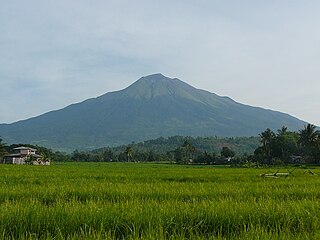
Negros is the fourth largest and third most populous island in the Philippines, with a total land area of 13,309 km2 (5,139 sq mi). Negros is one of the many islands of the Visayas, in the central part of the country. The predominant inhabitants of the island region are mainly called Negrenses. As of 2020 census, the total population of Negros is 4,656,945 people.

The Philippines, officially the Republic of the Philippines, is an archipelagic country in Southeast Asia. It is situated in the western Pacific Ocean and consists of around 7,641 islands that are broadly categorized under three main geographical divisions from north to south: Luzon, Visayas, and Mindanao. The Philippines is bounded by the South China Sea to the west, the Philippine Sea to the east, and the Celebes Sea to the southwest. It shares maritime borders with Taiwan to the north, Japan to the northeast, Palau to the east and southeast, Indonesia to the south, Malaysia to the southwest, Vietnam to the west, and China to the northwest. The Philippines covers an area of 300,000 km2 (120,000 sq mi) and, as of 2021, it had a population of around 109 million people, making it the world's thirteenth-most populous country. The Philippines has diverse ethnicities and cultures throughout its islands. Manila is the country's capital, while the largest city is Quezon City; both lie within the urban area of Metro Manila.

On August 11, 2006, an oil spill occurred in the Panay Gulf when the oil tanker, MT Solar 1, sank off the coasts of Guimaras and Negros in the Philippines, causing what is considered to be the worst oil spill in the country's history.
NATO takes over command of the peacekeeping force in Afghanistan, marking its first major operation outside Europe in its 54-year-history.

The North Atlantic Treaty Organization, also called the North Atlantic Alliance, is an intergovernmental military alliance between 30 member states – 28 European and two North American. Established in the aftermath of World War II, the organization implemented the North Atlantic Treaty, signed in Washington, D.C., on 4 April 1949. NATO is a collective security system: its independent member states agree to defend each other against attacks by third parties. During the Cold War, NATO operated as a check on the perceived threat posed by the Soviet Union. The alliance remained in place after the dissolution of the Soviet Union and has been involved in military operations in the Balkans, the Middle East, South Asia, and Africa. The organization's motto is animus in consulendo liber.

The International Security Assistance Force (ISAF) was a multinational military mission in Afghanistan from 2001 to 2014. It was established by United Nations Security Council Resolution 1386 pursuant to the Bonn Agreement, which outlined the establishment of a permanent Afghan government following the U.S. invasion in October 2001. ISAF's primary goal was to train the Afghan National Security Forces (ANSF) and assist Afghanistan in rebuilding key government institutions; it gradually took part in the broader war in Afghanistan against the Taliban insurgency.

Afghanistan, officially the Islamic Emirate of Afghanistan, is a landlocked country located at the crossroads of Central Asia and South Asia. Referred to as the Heart of Asia, it is bordered by Pakistan to the east and south, Iran to the west, Turkmenistan to the northwest, Uzbekistan to the north, Tajikistan to the northeast, and China to the northeast and east. Occupying 652,864 square kilometers (252,072 sq mi) of land, the country is predominantly mountainous with plains in the north and the southwest, which are separated by the Hindu Kush mountain range. As of 2021, its population is 40.2 million, composed mostly of ethnic Pashtuns, Tajiks, Hazaras, and Uzbeks. Kabul is the country's largest city and serves as its capital.
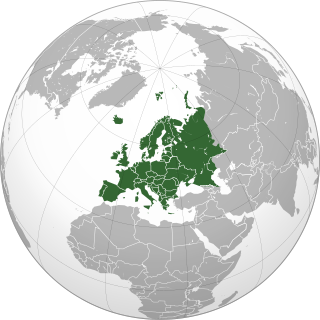
Europe is a large peninsula conventionally considered a continent in its own right because of its great physical size and the weight of its history and traditions. Europe is also considered a subcontinent of Eurasia and it is located entirely in the Northern Hemisphere and mostly in the Eastern Hemisphere. Comprising the westernmost peninsulas of Eurasia, it shares the continental landmass of Afro-Eurasia with both Africa and Asia. It is bordered by the Arctic Ocean to the north, the Atlantic Ocean to the west, the Mediterranean Sea to the south and Asia to the east. Europe is commonly considered to be separated from Asia by the watershed of the Ural Mountains, the Ural River, the Caspian Sea, the Greater Caucasus, the Black Sea and the waterways of the Turkish Straits.
Jemaah Islamiyah leader Riduan Isamuddin, better known as Hambali, is arrested in Bangkok, Thailand.
Jemaah Islamiyah is a Southeast Asian militant extremist Islamist terrorist group based in Indonesia, which is dedicated to the establishment of an Islamic state in Southeast Asia. On 25 October 2002, immediately following the JI-perpetrated Bali bombing, JI was added to the UN Security Council Resolution 1267 as a terrorist group linked to Al-Qaeda or the Taliban.

Riduan Isamuddin also transliterated as Riduan Isamudin, Riduan Isomuddin, and Riduan Isomudin, better known by the nom de guerre Hambali, born as Encep Nurjaman is the former military leader of the Indonesian terrorist organization Jemaah Islamiyah (JI), which is linked with al-Qaeda. He is now in American custody in the United States's Guantanamo Bay detainment camps, in Cuba. He is currently awaiting trial in a military commission.

Bangkok, officially known in Thai as Krung Thep Maha Nakhon and colloquially as Krung Thep, is the capital and most populous city of Thailand. The city occupies 1,568.7 square kilometres (605.7 sq mi) in the Chao Phraya River delta in central Thailand and has an estimated population of 10.539 million as of 2020, 15.3 percent of the country's population. Over 14 million people lived within the surrounding Bangkok Metropolitan Region at the 2010 census, making Bangkok an extreme primate city, dwarfing Thailand's other urban centres in both size and importance to the national economy.
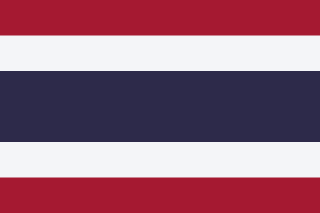
Thailand, historically known as Siam and officially the Kingdom of Thailand, is a country in Southeast Asia, located at the centre of the Indochinese Peninsula, spanning 513,120 square kilometres (198,120 sq mi), with a population of almost 70 million. The country is bordered to the north by Myanmar and Laos, to the east by Laos and Cambodia, to the south by the Gulf of Thailand and Malaysia, and to the west by the Andaman Sea and the extremity of Myanmar. Thailand also shares maritime borders with Vietnam to the southeast, and Indonesia and India to the southwest. Bangkok is the nation's capital and largest city.
An air rage incident occurs on board Southwest Airlines Flight 1763 when 19-year-old Jonathan Burton attempts to storm the cockpit, but he is subdued by other passengers and dies from his injuries.
Air rage is aggressive or violent behavior on the part of passengers and crew of aircraft, especially during flight. Air rage generally covers both behavior of a passenger or crew member that is likely caused by physiological or psychological stresses associated with air travel, and when a passenger or crew member becomes unruly, angry, or violent on an aircraft during a flight. Excessive consumption of alcohol is often a cause.

Southwest Airlines Flight 1763 was a scheduled passenger flight, operated by Southwest Airlines, from McCarran International Airport, in Paradise, Nevada, to Salt Lake City International Airport, in Salt Lake City, Utah. On August 11, 2000, Jonathan Burton, a Las Vegas resident, stormed the cockpit door of the Boeing 737 while in flight, in an apparent case of air rage. The 19-year-old was subdued by six to eight other passengers with such force that he died of asphyxiation. The death was initially believed to have been a heart attack.
Ken Levine's System Shock 2 was released to mediocre sales, but was critically acclaimed and highly influenced subsequent first-person shooter game design.

Kenneth M. Levine is an American game developer. He is the creative director and co-founder of Ghost Story Games. He led the creation of the BioShock series, and is also known for his work on Thief: The Dark Project and System Shock 2. Levine was named one of the "Storytellers of the Decade" by Game Informer and was the 1UP Network's 2007 person of the year. He received the inaugural Golden Joystick "Lifetime Achievement Award" for his work.

System Shock 2 is a 1999 action role-playing survival horror video game designed by Ken Levine and co-developed by Irrational Games and Looking Glass Studios. Originally intended to be a standalone title, its story was changed during production into a sequel to the 1994 game System Shock. The alterations were made when Electronic Arts—who owned the System Shock franchise rights—signed on as publisher.
First-person shooter (FPS) is a sub-genre of shooter video games centered on gun and other weapon-based combat in a first-person perspective, with the player experiencing the action through the eyes of the protagonist and controlling the player character in a three-dimensional space. The genre shares common traits with other shooter games, and in turn falls under the action game genre. Since the genre's inception, advanced 3D and pseudo-3D graphics have challenged hardware development, and multiplayer gaming has been integral.
The Salt Lake City Tornado hit downtown Salt Lake City, damaging 120 homes and injuring over 100 people.

The 1999 Salt Lake City tornado was a rare tornado that struck downtown Salt Lake City, Utah, United States, on August 11, 1999. It was among the most notable tornadoes to hit west of the Great Plains in the 20th century and the second tornado to hit in Utah that resulted in a fatality. This was the sixth significant tornado in Utah since June 1963, and one of only two F2 tornadoes to have hit Salt Lake County since 1950.
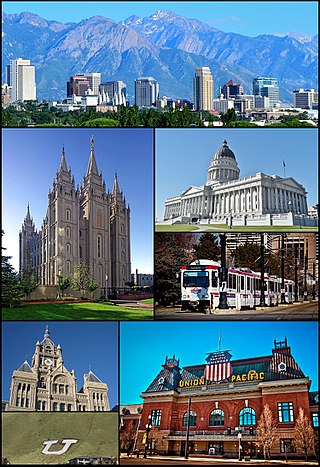
Salt Lake City is the capital and most populous city of Utah, as well as the seat of Salt Lake County, the most populous county in Utah. With a population of 200,133 in 2020, the city is the core of the Salt Lake City metropolitan area, which had a population of 1,257,936 at the 2020 census. Salt Lake City is further situated within a larger metropolis known as the Salt Lake City–Ogden–Provo Combined Statistical Area, a corridor of contiguous urban and suburban development stretched along a 120-mile (190 km) segment of the Wasatch Front, comprising a population of 2,606,548, making it the 22nd largest in the nation. It is also the central core of the larger of only two major urban areas located within the Great Basin.
The Mall of America in Bloomington, Minnesota opens. At the time the largest shopping mall in the United States.

Mall of America (MOA) is a shopping mall located in Bloomington, Minnesota, a suburb of the Twin Cities in Minnesota, United States. It lies southeast of the junction of Interstate 494 and Minnesota State Highway 77, north of the Minnesota River, and across the Interstate from the Minneapolis–Saint Paul International Airport. It opened in 1992, and is the largest mall in the United States, the largest in the Western Hemisphere, and the ninth largest shopping mall in the world.
A meeting between Sayyed Imam Al-Sharif, Osama bin Laden, Abdullah Yusuf Azzam, and leaders of Egyptian Islamic Jihad in Afghanistan culminates in the formation of Al-Qaeda.
Sayyed Imam Al-Sharif,, aka "Dr. Fadl" and Abd Al-Qader Bin 'Abd Al-'Aziz, has been described as a "major" figure "in the global jihad movement." He is said to be "one of Ayman Al-Zawahiri's oldest associates", and his book al-'Umda fi I'dad al-'Udda, was used as a jihad manual in Al-Qaeda training camps in Afghanistan. Fadl is reported to be one of the first members of Al Qaeda’s top council.

Osama bin Mohammed bin Awad bin Laden was a Saudi-born extremist militant who founded the Pan-Islamic jihadist organization al-Qaeda. The group is designated as a terrorist group by the United Nations Security Council, the North Atlantic Treaty Organization (NATO), the European Union, and various countries. Under bin Laden, al-Qaeda was responsible for the September 11 attacks in the United States and many other mass-casualty attacks worldwide. On 2 May 2011, he was killed by U.S. special operations forces at his compound in Abbottabad, Pakistan.

Abdullah Yusuf Azzam was a Salafi jihadist, a Palestinian scholar, and theologian of Sunni Islam. During the Soviet–Afghan War of the 1980s, he advocated "defensive jihad" by Muslims worldwide to help the Afghan mujahideen fight against Soviet forces in the Democratic Republic of Afghanistan.
The Egyptian Islamic Jihad, formerly called simply Islamic Jihad and the Liberation Army for Holy Sites, originally referred to as al-Jihad, and then the Jihad Group, or the Jihad Organization, is an Egyptian Islamist group active since the late 1970s. It is under worldwide embargo by the United Nations as an affiliate of Al-Qaeda. It is also banned by several individual governments worldwide. The group is a proscribed terrorist group organization in the United Kingdom under the Terrorism Act 2000.

Afghanistan, officially the Islamic Emirate of Afghanistan, is a landlocked country located at the crossroads of Central Asia and South Asia. Referred to as the Heart of Asia, it is bordered by Pakistan to the east and south, Iran to the west, Turkmenistan to the northwest, Uzbekistan to the north, Tajikistan to the northeast, and China to the northeast and east. Occupying 652,864 square kilometers (252,072 sq mi) of land, the country is predominantly mountainous with plains in the north and the southwest, which are separated by the Hindu Kush mountain range. As of 2021, its population is 40.2 million, composed mostly of ethnic Pashtuns, Tajiks, Hazaras, and Uzbeks. Kabul is the country's largest city and serves as its capital.

Al-Qaeda is an Islamic extremist organization composed of Salafist jihadists. Its members are mostly composed of Arabs, but also include other peoples. Al-Qaeda has mounted attacks on civilian and military targets in various countries, including the 1998 United States embassy bombings, the September 11 attacks, and the 2002 Bali bombings; it has been designated as a terrorist group by the United Nations Security Council, the North Atlantic Treaty Organization (NATO), the European Union, India, and various other countries.
"We begin bombing in five minutes": United States President Ronald Reagan, while running for re-election, jokes while preparing to make his weekly Saturday address on National Public Radio.
"We begin bombing in five minutes" is the last sentence of a controversial, off-the-record joke made by U.S. President Ronald Reagan in 1984, during the Cold War.

The president of the United States (POTUS) is the head of state and head of government of the United States of America. The president directs the executive branch of the federal government and is the commander-in-chief of the United States Armed Forces.
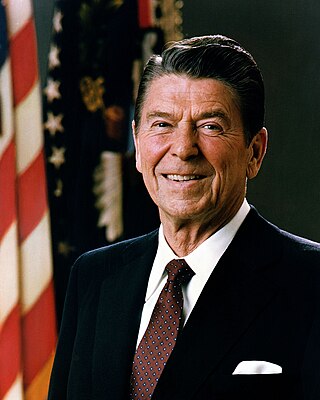
Ronald Wilson Reagan was an American politician who served as the 40th president of the United States from 1981 to 1989. A member of the Republican Party from 1962 onward, he also served as the 33rd governor of California from 1967 to 1975 after having a career as a Hollywood actor and union leader.

National Public Radio is an American privately and state funded nonprofit media organization headquartered in Washington, D.C., with its NPR West headquarters in Culver City, California. It differs from other non-profit membership media organizations such as Associated Press, in that it was established by an act of Congress. Most of its member stations are owned by non-profit organizations, including public school districts, colleges, and universities. It serves as a national syndicator to a network of over 1,000 public radio stations in the United States. As of September 2013, NPR employed 840 people.
A bomb explodes on Pan Am Flight 830, en route from Tokyo, Japan to Honolulu, Hawaii, killing one passenger and injuring 15 others.

Pan Am Flight 830 was a flight from New Tokyo International Airport in Tokyo, Japan, to Honolulu International Airport in Hawaii. On August 11, 1982, the Boeing 747-121 serving the flight, nicknamed Clipper Ocean Rover, was en route to Hawaii when the airplane was damaged by a bomb that had been placed on board. Despite the damage to the aircraft, Captain James E. "Skipper" O'Halloran III, of Spokane, Washington, was able to land in Honolulu safely. One person was killed while 284 survived; 16 of them were wounded.

Tokyo, officially the Tokyo Metropolis, is the capital and largest city of Japan. Formerly known as Edo, its metropolitan area is the most populous in the world, with an estimated 37.468 million residents as of 2018; the city proper has a population of 13.99 million people. Located at the head of Tokyo Bay, the prefecture forms part of the Kantō region on the central coast of Honshu, Japan's largest island. Tokyo serves as Japan's economic center and is the seat of both the Japanese government and the Emperor of Japan.

Honolulu is the capital and largest city of the U.S. state of Hawaii, which is in the Pacific Ocean. It is an unincorporated county seat of the consolidated City and County of Honolulu, situated along the southeast coast of the island of Oʻahu, and is the westernmost and southernmost major U.S. city. Honolulu is Hawaii's main gateway to the world. It is also a major hub for business, finance, hospitality, and military defense in both the state and Oceania. The city is characterized by a mix of various Asian, Western, and Pacific cultures, reflected in its diverse demography, cuisine, and traditions.
Two Aeroflot passenger jets collided in mid-air near Dniprodzerzhynsk in the Ukrainian SSR, killing all 178 people on both aircraft.
PJSC Aeroflot – Russian Airlines, commonly known as Aeroflot, is the flag carrier and the largest airline of Russia. The airline was founded in 1923, making Aeroflot one of the oldest active airlines in the world. Aeroflot is headquartered in the Central Administrative Okrug, Moscow, with its hub being Sheremetyevo International Airport.

On 11 August 1979, a mid-air collision occurred over the Ukrainian SSR, near the city of Dniprodzerzhynsk. The aircraft involved were both Tupolev Tu-134As on scheduled domestic passenger flights, operated by Aeroflot. All 178 people aboard both aircraft died in the accident. The Soviet aviation board investigating the accident concluded that the crash was caused by "mistakes and violations" made by air traffic controllers.
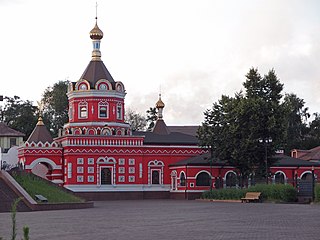
Kamianske, formerly Dniprodzerzhynsk, is an industrial city in Dnipropetrovsk Oblast of Ukraine and a port on the Dnieper. Administratively, it serves as the administrative center of Kamianske Raion. Kamianske hosts the administration of Kamianske urban hromada, one of the hromadas of Ukraine. Population: 226,845

The Ukrainian Soviet Socialist Republic, abbreviated as the Ukrainian SSR, UkrSSR, or UkSSR, and also known as Soviet Ukraine, was one of the constituent republics of the Soviet Union from 1922 until 1991. In the anthem of the Ukrainian SSR, it was referred to simply as Ukraine. Under the Soviet one-party model, the Ukrainian SSR was governed by the Communist Party of the Soviet Union through its republican branch: the Communist Party of Ukraine.
Two Aeroflot Tupolev Tu-134s collide over the Ukrainian city of Dniprodzerzhynsk and crash, killing all 178 aboard both airliners.
PJSC Aeroflot – Russian Airlines, commonly known as Aeroflot, is the flag carrier and the largest airline of Russia. The airline was founded in 1923, making Aeroflot one of the oldest active airlines in the world. Aeroflot is headquartered in the Central Administrative Okrug, Moscow, with its hub being Sheremetyevo International Airport.

The Tupolev Tu-134 is a twin-engined, narrow-body jet airliner built in the Soviet Union for short and medium-haul routes from 1966 to 1989. The original version featured a glazed-nose design and, like certain other Russian airliners, it can operate from unpaved airfields.

On 11 August 1979, a mid-air collision occurred over the Ukrainian SSR, near the city of Dniprodzerzhynsk. The aircraft involved were both Tupolev Tu-134As on scheduled domestic passenger flights, operated by Aeroflot. All 178 people aboard both aircraft died in the accident. The Soviet aviation board investigating the accident concluded that the crash was caused by "mistakes and violations" made by air traffic controllers.

Ukraine is a country in Eastern Europe. It is the second-largest European country after Russia, which it borders to the east and northeast. Ukraine covers approximately 600,000 square kilometres (230,000 sq mi). Prior to the ongoing Russo-Ukrainian War, it was the eighth-most populous country in Europe, with a population of around 41 million people. It is also bordered by Belarus to the north; by Poland, Slovakia, and Hungary to the west; and by Romania and Moldova to the southwest; with a coastline along the Black Sea and the Sea of Azov to the south and southeast. Kyiv is the nation's capital and largest city. Ukraine's official and national language is Ukrainian; most people are also fluent in Russian.

Kamianske, formerly Dniprodzerzhynsk, is an industrial city in Dnipropetrovsk Oblast of Ukraine and a port on the Dnieper. Administratively, it serves as the administrative center of Kamianske Raion. Kamianske hosts the administration of Kamianske urban hromada, one of the hromadas of Ukraine. Population: 226,845
The U.S. National Highway Traffic Safety Administration initiated an investigation into the alleged vulnerability of the Ford Pinto to fuel leakage and fire in a rear-end collision.
The National Highway Traffic Safety Administration is an agency of the U.S. federal government, part of the Department of Transportation. It describes its mission as "Save lives, prevent injuries, reduce vehicle-related crashes" related to transportation safety in the United States.

The Ford Pinto is a subcompact car that was manufactured and marketed by Ford Motor Company in North America from 1971 until 1980 model years. The Pinto was the first subcompact vehicle produced by Ford in North America.
East Timor: Governor Mário Lemos Pires of Portuguese Timor abandons the capital Dili, following a coup by the Timorese Democratic Union (UDT) and the outbreak of civil war between UDT and Fretilin.
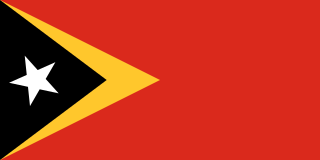
East Timor, also known as Timor-Leste, officially the Democratic Republic of Timor-Leste, is an island country in Southeast Asia. It comprises the eastern half of the island of Timor, the exclave of Oecusse on the island's north-western half, and the minor islands of Atauro and Jaco. Australia is the country's southern neighbour, separated by the Timor Sea. The country's size is 14,874 square kilometres (5,743 sq mi). Dili is its capital and largest city.

Mário Lemos Pires was a major-general of the Portuguese Army and the last colonial governor of Portuguese Timor.

Portuguese Timor was a colonial possession of Portugal that existed between 1702 and 1975. During most of this period, Portugal shared the island of Timor with the Dutch East Indies.

Dili is the capital and largest city of East Timor. It lies on the northern coast of the island of Timor, in a small area of flat land hemmed in by mountains. The climate is tropical, with distinct wet and dry seasons. The city has served as the economic hub and chief port of what is now East Timor since its designation as the capital of Portuguese Timor in 1769. It also serves as the capital of the Dili Municipality, which includes some rural subdivisions in addition to the urban ones which make up the city itself. Dili's growing population is relatively youthful, being mostly of working age. The local language is Tetum, however residents include many internal migrants from other areas of the country.

The Timorese Democratic Union is a conservative political party in East Timor. It was the first party to be established in the country on May 11, 1974, following the Carnation Revolution in Portugal.

The Revolutionary Front for an Independent East Timor is a centre-left political party in East Timor. They presently hold 23 of 65 seats in the National Parliament. Fretilin formed the government in East Timor until their independence in 2002. They obtained the Presidency in 2017 under Francisco Guterres, but lost in the 2022 East Timorese presidential election.
At a party in New York City, Jamaican musician DJ Kool Herc began rapping during an extended break, laying the foundation for hip-hop music.

Clive Campbell, better known by his stage name DJ Kool Herc, is a Jamaican-American DJ who is credited with contributing to the development of hip hop music in the Bronx, New York City, in the 1970s through his "Back to School Jam", hosted on August 11, 1973, at 1520 Sedgwick Avenue. After his younger sister, Cindy Campbell, became inspired to earn extra cash for back-to-school clothes, she decided to have her older brother, then 18 years old, play music for the neighborhood in their apartment building. Campbell began playing hard funk records of the sort typified by James Brown.
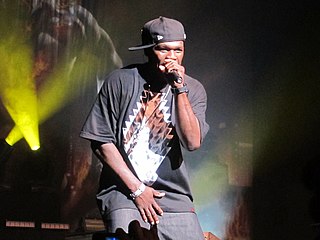
Rapping is a musical form of vocal delivery that incorporates "rhyme, rhythmic speech, and street vernacular". It is performed or chanted, usually over a backing beat or musical accompaniment. The components of rap include "content", "flow", and "delivery". Rap differs from spoken-word poetry in that it is usually performed off-time to musical accompaniment. Rap is a primary ingredient of hip hop music commonly associated with that genre; however, the origins of rap predate hip-hop culture by many years.
In popular music, a break is an instrumental or percussion section during a song derived from or related to stop-time – being a "break" from the main parts of the song or piece. A break is usually interpolated between sections of a song, to provide a sense of anticipation, signal the start of a new section, or create variety in the arrangement.
Hip hop music or hip-hop music, also known as rap music and formerly known as disco rap, is a genre of popular music that originated in New York City in the 1970s. Developed by inner-city African Americans, Latino Americans, and Caribbean Americans, it consists of stylized rhythmic music that commonly accompanies rapping, a rhythmic and rhyming speech that is chanted. It developed as part of hip hop culture, a subculture defined by four key stylistic elements: MCing/rapping, DJing/scratching with turntables, break dancing, and graffiti writing. Other elements include sampling beats or bass lines from records, and rhythmic beatboxing. While often used to refer solely to rapping, "hip hop" more properly denotes the practice of the entire subculture. The term hip hop music is sometimes used synonymously with the term rap music, though rapping is not a required component of hip hop music; the genre may also incorporate other elements of hip hop culture, including DJing, turntablism, scratching, beatboxing, and instrumental tracks.
Vietnam War: The last United States ground combat unit leaves South Vietnam.

The Vietnam War was a conflict in Vietnam, Laos, and Cambodia from 1 November 1955 to the fall of Saigon on 30 April 1975. It was the second of the Indochina Wars and was officially fought between North Vietnam and South Vietnam. The north was supported by the Soviet Union, China, and other communist states, while the south was supported by the United States and other anti-communist allies. The war is widely considered to be a Cold War-era proxy war. It lasted almost 20 years, with direct U.S. involvement ending in 1973. The conflict also spilled over into neighboring states, exacerbating the Laotian Civil War and the Cambodian Civil War, which ended with all three countries becoming communist states by 1975.
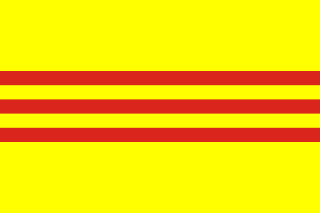
South Vietnam, officially the Republic of Vietnam, was a country in Southeast Asia that existed from 1955 to 1975, the period when the southern portion of Vietnam was a member of the Western Bloc during part of the Cold War after the 1954 division of Vietnam. It first received international recognition in 1949 as the State of Vietnam within the French Union, with its capital at Saigon, before becoming a republic in 1955. South Vietnam was bordered by North Vietnam to the north, Laos to the northwest, Cambodia to the southwest, and Thailand across the Gulf of Thailand to the southwest. Its sovereignty was recognized by the United States and 87 other nations, though it failed to gain admission into the United Nations as a result of a Soviet veto in 1957. It was succeeded by the Republic of South Vietnam in 1975.
The Apollo 11 astronauts are released from a three-week quarantine following their liftoff from the moon.

Apollo 11 was the American spaceflight that first landed humans on the Moon. Commander Neil Armstrong and lunar module pilot Buzz Aldrin landed the Apollo Lunar Module Eagle on July 20, 1969, at 20:17 UTC, and Armstrong became the first person to step onto the Moon's surface six hours and 39 minutes later, on July 21 at 02:56 UTC. Aldrin joined him 19 minutes later, and they spent about two and a quarter hours together exploring the site they had named Tranquility Base upon landing. Armstrong and Aldrin collected 47.5 pounds (21.5 kg) of lunar material to bring back to Earth as pilot Michael Collins flew the Command Module Columbia in lunar orbit, and were on the Moon's surface for 21 hours, 36 minutes before lifting off to rejoin Columbia.

A quarantine is a restriction on the movement of people, animals and goods which is intended to prevent the spread of disease or pests. It is often used in connection to disease and illness, preventing the movement of those who may have been exposed to a communicable disease, yet do not have a confirmed medical diagnosis. It is distinct from medical isolation, in which those confirmed to be infected with a communicable disease are isolated from the healthy population. Quarantine considerations are often one aspect of border control.
Race riots (the Watts Riots) begin in the Watts area of Los Angeles, California.
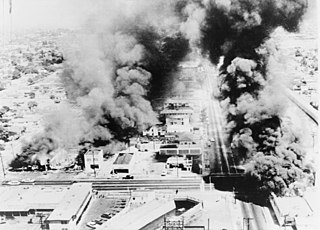
The Watts riots, sometimes referred to as the Watts Rebellion or Watts Uprising, took place in the Watts neighborhood and its surrounding areas of Los Angeles from August 11 to 16, 1965.

Watts is a neighborhood in southern Los Angeles, California. It is located within the South Los Angeles region, bordering the cities of Lynwood, Huntington Park and South Gate to the east and southeast, respectively, and the unincorporated community of Willowbrook to the south.

Los Angeles, often referred to by its initials L.A., is the largest city in the state of California and the second most populous city in the United States after New York City. Los Angeles is the commercial, financial, and cultural center of Southern California. With a population of roughly 3.9 million as of 2020, Los Angeles is known for its Mediterranean climate, ethnic and cultural diversity, Hollywood film industry, and sprawling metropolitan area. The city of Los Angeles lies in a basin in Southern California adjacent to the Pacific Ocean extending through the Santa Monica Mountains and into the San Fernando Valley. It covers about 469 square miles (1,210 km2), and is the seat of Los Angeles County, which is the most populous county in the United States with an estimated 9.86 million as of 2022.
Vostok 3 launches from the Baikonur Cosmodrome and cosmonaut Andrian Nikolayev becomes the first person to float in microgravity.

Vostok 3 and Vostok 4 were Soviet space program flights in August 1962, intended to determine the ability of the human body to function in conditions of weightlessness, test the ground control capability to launch and manage two separate, concurrent flights, and test the endurance of the Vostok 3KA spacecraft over longer flights. Cosmonaut Andriyan Nikolayev orbited the Earth 64 times in Vostok 3 over nearly four days in space, August 11–15, 1962, a feat which would not be matched by NASA until the Gemini program (1965–1966). Pavel Popovich was launched on Vostok 4 on August 12, and made 48 Earth orbits. The two capsules were launched on trajectories that brought the spacecraft within approximately 6.5 km (4.0 mi) of each another.
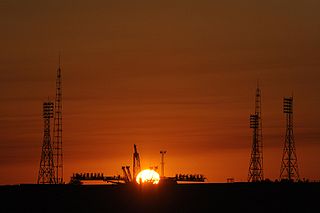
The Baikonur Cosmodrome is a spaceport in an area of southern Kazakhstan leased to Russia. The Cosmodrome is the world's first spaceport for orbital and human launches and the largest operational space launch facility. All crewed Russian spaceflights are launched from Baikonur.

Andriyan Grigoryevich Nikolayev was a Soviet cosmonaut. In 1962, aboard Vostok 3, he became the third Soviet cosmonaut to fly into space. Nikolayev was an ethnic Chuvash and is considered as the first Turkic person who flew into space.

The term micro-g environment is more or less synonymous with the terms weightlessness and zero-g, but emphasising that g-forces are never exactly zero—just very small. The symbol for microgravity, μg, was used on the insignias of Space Shuttle flights STS-87 and STS-107, because these flights were devoted to microgravity research in low Earth orbit.
The former Portuguese territories in India of Dadra and Nagar Haveli are merged to create the Union Territory Dadra and Nagar Haveli.

India, officially the Republic of India, is a country in South Asia. It is the seventh-largest country by area, the second-most populous country, and the most populous democracy in the world. Bounded by the Indian Ocean on the south, the Arabian Sea on the southwest, and the Bay of Bengal on the southeast, it shares land borders with Pakistan to the west; China, Nepal, and Bhutan to the north; and Bangladesh and Myanmar to the east. In the Indian Ocean, India is in the vicinity of Sri Lanka and the Maldives; its Andaman and Nicobar Islands share a maritime border with Thailand, Myanmar, and Indonesia.
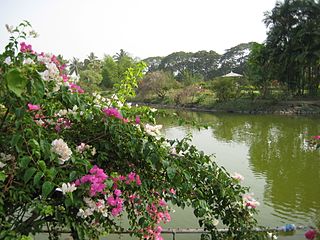
Dadra is one of the two talukas in Dadra and Nagar Haveli district, India. It is an enclave lying a few kilometres north of Nagar Haveli and is surrounded by Gujarat.

Nagar Haveli is one of the two talukas of Dadra and Nagar Haveli District, Dadra and Nagar Haveli and Daman and Diu, India. It is surrounded by the Indian states of Gujarat and Maharashtra.

A union territory is a type of administrative division in the Republic of India. Unlike the states of India, which have their own governments, union territories are federal territories governed, in part or in whole, by the Union Government of India. There are currently eight union territories in India, namely Andaman and Nicobar Islands, Chandigarh, Dadra and Nagar Haveli and Daman and Diu, Delhi, Jammu and Kashmir, Ladakh, Lakshadweep and Puducherry.

Dadra and Nagar Haveli is a district of the union territory of Dadra and Nagar Haveli and Daman and Diu in western India. It is composed of two separate geographical entities: Nagar Haveli, wedged in between Maharashtra and Gujarat states 1 kilometre (0.62 mi) to the north-west, the smaller enclave of Dadra, which is surrounded by Gujarat. Silvassa is the administrative headquarters of Dadra and Nagar Haveli.
Chad declares independence from France.
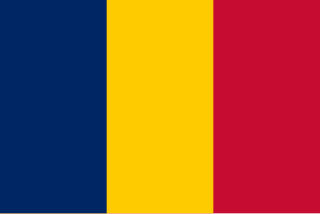
Chad, officially the Republic of Chad, is a landlocked country at the crossroads of North and Central Africa. It is bordered by Libya to the north, Sudan to the east, the Central African Republic to the south, Cameroon to the southwest, Nigeria to the southwest, and Niger to the west. Chad has a population of 16 million, of which 1.6 million live in the capital and largest city of N'Djamena.
Sheremetyevo International Airport, the second-largest airport in Russia, opens.

Sheremetyevo Alexander S. Pushkin International Airport is one of four international airports that serve the city of Moscow. It is the busiest airport in Russia, as well as the second-busiest airport in Europe. Originally built as a military airbase, Sheremetyevo was converted into a civilian airport in 1959. The airport was originally named after a nearby village, and a 2019 contest extended the name to include the name of the Russian poet Alexander Pushkin.
King Talal of Jordan was forced to abdicate due to mental illness and was succeeded by his eldest son Hussein (pictured).

Talal bin Abdullah was King of Jordan from the assassination of his father, King Abdullah I, on 20 July 1951 until his forced abdication on 11 August 1952. As a member of the Hashemite dynasty, the royal family of Jordan since 1921, Talal was a 39th-generation direct descendant of Muhammad.
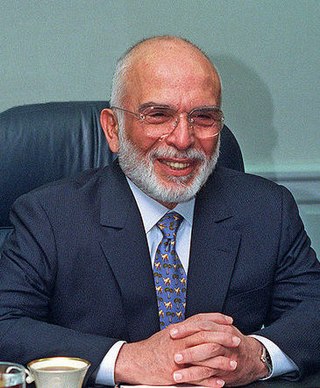
Hussein bin Talal was King of Jordan from 11 August 1952 until his death in 1999. As a member of the Hashemite dynasty, the royal family of Jordan since 1921, Hussein was a 40th-generation direct descendant of Muhammad.
Hussein bin Talal is proclaimed King of Jordan.

Hussein bin Talal was King of Jordan from 11 August 1952 until his death in 1999. As a member of the Hashemite dynasty, the royal family of Jordan since 1921, Hussein was a 40th-generation direct descendant of Muhammad.
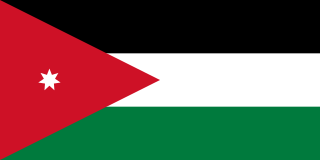
Jordan, officially the Hashemite Kingdom of Jordan, is a country in Western Asia. It is situated at the crossroads of Asia, Africa, and Europe, within the Levant region, on the East Bank of the Jordan River. Jordan is bordered by Saudi Arabia to the south and east, Iraq to the northeast, Syria to the north, and the Palestinian West Bank, Israel, and the Dead Sea to the west. It has a 26 km (16 mi) coastline on the Gulf of Aqaba in the Red Sea to the southwest. The Gulf of Aqaba separates Jordan from Egypt. Amman is Jordan's capital and largest city, as well as its economic, political, and cultural centre.
Amid rumors of kidnappings of children by Jews in Kraków, a crowd of Poles took part in a pogrom, resulting in at least one death.

Kraków, or Cracow, is the second-largest and one of the oldest cities in Poland. Situated on the Vistula River in Lesser Poland Voivodeship, the city dates back to the seventh century. Kraków was the official capital of Poland until 1596 and has traditionally been one of the leading centres of Polish academic, economic, cultural and artistic life. Cited as one of Europe's most beautiful cities, its Old Town with Wawel Royal Castle was declared a UNESCO World Heritage Site in 1978, one of the first 12 sites granted the status.

The Kraków pogrom was the first anti-Jewish riot in post World War II Poland, that took place on 11 August 1945 in the Soviet-occupied city of Kraków, Poland. The incident was part of anti-Jewish violence in Poland towards and after the end of World War II. The immediate cause of the pogrom was a blood libel rumour of a ritual murder of Polish children by Jews in the city. A false allegation that a child had been abducted by a Jewish woman had grown to allegations that Jews had killed up to 80 children over the course of weeks. These allegations led to attacks on Jews, as well as some Poles mistaken for Jews, in the Kazimierz quarter, and other parts of the Old Town, and the burning of the Kupa Synagogue. At least one person was killed and an unknown number were injured.
Poles in Kraków engage in a pogrom against Jews in the city, killing one and wounding five.

Kraków, or Cracow, is the second-largest and one of the oldest cities in Poland. Situated on the Vistula River in Lesser Poland Voivodeship, the city dates back to the seventh century. Kraków was the official capital of Poland until 1596 and has traditionally been one of the leading centres of Polish academic, economic, cultural and artistic life. Cited as one of Europe's most beautiful cities, its Old Town with Wawel Royal Castle was declared a UNESCO World Heritage Site in 1978, one of the first 12 sites granted the status.

The Kraków pogrom was the first anti-Jewish riot in post World War II Poland, that took place on 11 August 1945 in the Soviet-occupied city of Kraków, Poland. The incident was part of anti-Jewish violence in Poland towards and after the end of World War II. The immediate cause of the pogrom was a blood libel rumour of a ritual murder of Polish children by Jews in the city. A false allegation that a child had been abducted by a Jewish woman had grown to allegations that Jews had killed up to 80 children over the course of weeks. These allegations led to attacks on Jews, as well as some Poles mistaken for Jews, in the Kazimierz quarter, and other parts of the Old Town, and the burning of the Kupa Synagogue. At least one person was killed and an unknown number were injured.
Actress Hedy Lamarr and composer George Antheil receive a patent for a Frequency-hopping spread spectrum communication system that later became the basis for modern technologies in wireless telephones, two-way radio communications, and Wi-Fi.

Hedy Lamarr was an Austrian-born American film actress and inventor. A film star during Hollywood's golden age, Lamarr has been described as one of the greatest movie actresses of all time.
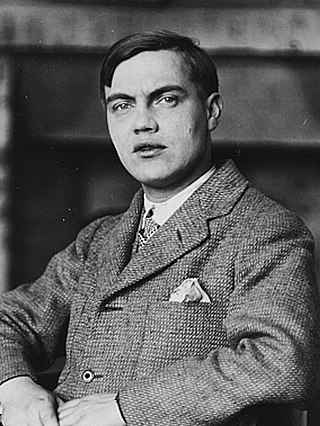
George Johann Carl Antheil was an American avant-garde composer, pianist, author, and inventor whose modernist musical compositions explored the modern sounds – musical, industrial, and mechanical – of the early 20th century. Spending much of the 1920s in Europe, Antheil returned to the United States in the 1930s, and thereafter spent much of his time composing music for films, and eventually, television. As a result of this work, his style became more tonal. A man of diverse interests and talents, Antheil was constantly reinventing himself. He wrote magazine articles, an autobiography, a mystery novel, and newspaper and music columns.

Frequency-hopping spread spectrum (FHSS) is a method of transmitting radio signals by rapidly changing the carrier frequency among many distinct frequencies occupying a large spectral band. The changes are controlled by a code known to both transmitter and receiver. FHSS is used to avoid interference, to prevent eavesdropping, and to enable code-division multiple access (CDMA) communications.

Wi-Fi is a family of wireless network protocols, based on the IEEE 802.11 family of standards, which are commonly used for local area networking of devices and Internet access, allowing nearby digital devices to exchange data by radio waves. These are the most widely used computer networks in the world, used globally in home and small office networks to link desktop and laptop computers, tablet computers, smartphones, smart TVs, printers, and smart speakers together and to a wireless router to connect them to the Internet, and in wireless access points in public places like coffee shops, hotels, libraries and airports to provide visitors with Internet access for their mobile devices.
The first civilian prisoners arrive at the Federal prison on Alcatraz Island.

United States Penitentiary, Alcatraz Island, also known simply as Alcatraz or The Rock was a maximum security federal prison on Alcatraz Island, 1.25 miles (2.01 km) off the coast of San Francisco, California, United States, the site of a fort since the 1850s; the main prison building was built in 1910–1912 as a United States Army military prison.

Alcatraz Island is a small island in San Francisco Bay, 1.25 miles (2.01 km) offshore from San Francisco, California, United States. The island was developed in the mid-19th century with facilities for a lighthouse, a military fortification, and a military prison. In 1934, the island was converted into a federal prison, Alcatraz Federal Penitentiary. The strong currents around the island and cold water temperatures made escape nearly impossible, and the prison became one of the most notorious in American history. The prison closed in 1963, and the island is now a major tourist attraction.
The first Bud Billiken Parade and Picnic, the oldest and largest African-American parade in the United States, was held in Chicago.

The Bud Billiken Parade and Picnic is an annual parade held since 1929 in Chicago, Illinois. The Bud Billiken Day Parade is the largest African-American parade in the United States of America. Held annually on the city's south side and on the second Saturday in August, The parade route travels on Dr. Martin Luther King Drive through the Bronzeville and Washington Park neighborhoods on the city's south side. At the end of the parade, in the historic Washington public park is a picnic and festival. Robert S. Abbott, the founder and publisher of the Chicago Defender, created the fictional character of Bud Billiken, which he featured in as youth advice column in his paper. David Kellum, co-founder of the Bud Billiken Club and longtime parade coordinator suggested the parade as a celebration of African-American life.

African Americans are an ethnic group consisting of Americans with partial or total ancestry from sub-Saharan Africa. The term "African American" generally denotes descendants of enslaved Africans who are from the United States. While some Black immigrants or their children may also come to identify as African-American, the majority of first generation immigrants do not, preferring to identify with their nation of origin.
Babe Ruth becomes the first baseball player to hit 500 home runs in his career with a home run at League Park in Cleveland, Ohio.
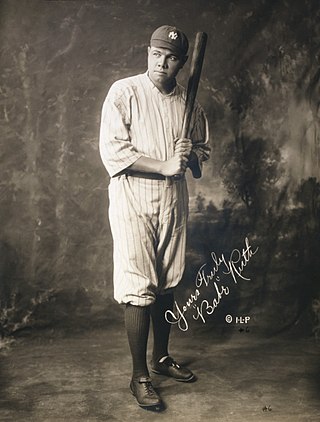
George Herman "Babe" Ruth Jr. was an American professional baseball player whose career in Major League Baseball (MLB) spanned 22 seasons, from 1914 through 1935. Nicknamed "the Bambino" and "the Sultan of Swat", he began his MLB career as a star left-handed pitcher for the Boston Red Sox, but achieved his greatest fame as a slugging outfielder for the New York Yankees. Ruth is regarded as one of the greatest sports heroes in American culture and is considered by many to be the greatest baseball player of all time. In 1936, Ruth was elected into the Baseball Hall of Fame as one of its "first five" inaugural members.

Baseball is a bat-and-ball sport played between two teams of nine players each, taking turns batting and fielding. The game is live when the umpire signals to the pitcher either verbally or by pointing, indicating that the ball is now in play. A player on the fielding team, called the pitcher, throws a ball that a player on the batting team tries to hit with a bat. The objective of the offensive team is to hit the ball into the field of play, away from the other team's players, allowing its players to run the bases, having them advance counter-clockwise around four bases to score what are called "runs". The objective of the defensive team is to prevent batters from becoming runners, and to prevent runners' advance around the bases. A run is scored when a runner legally advances around the bases in order and touches home plate.

In Major League Baseball (MLB), the 500 home run club is a group of batters who have hit 500 or more regular-season home runs in their careers. On August 11, 1929, Babe Ruth became the first member of the club. Ruth ended his career with 714 home runs, a record which stood from 1935 until Hank Aaron surpassed it in 1974. Aaron's ultimate career total, 755, remained the record until Barry Bonds set the current mark of 762 during the 2007 season. Twenty-eight players are members of the 500 home run club. Ted Williams (.344) holds the highest batting average among the club members while Harmon Killebrew (.256) holds the lowest.

In baseball, a home run is scored when the ball is hit in such a way that the batter is able to circle the bases and reach home plate safely in one play without any errors being committed by the defensive team. A home run is usually achieved by hitting the ball over the outfield fence between the foul poles without the ball touching the field. Far less common is the "inside-the-park" home run where the batter reaches home safely while the baseball is in play on the field.
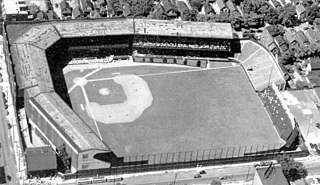
League Park was a baseball park located in Cleveland, Ohio, United States. It was situated at the northeast corner of Dunham Street and Lexington Avenue in the Hough neighborhood. It was built in 1891 as a wood structure and rebuilt using concrete and steel in 1910. The park was home to a number of professional sports teams, most notably the Cleveland Indians of Major League Baseball. League Park was first home to the Cleveland Spiders of the National League from 1891 to 1899 and of the Cleveland Lake Shores of the Western League, the minor league predecessor to the Indians, in 1900. From 1914 to 1915, League Park also hosted the Cleveland Spiders of the minor league American Association. In the late 1940s, the park was also the home field of the Cleveland Buckeyes of the Negro American League.

Cleveland, officially the City of Cleveland, is a city in the U.S. state of Ohio and the county seat of Cuyahoga County. Located in the northeastern part of the state, it is situated along the southern shore of Lake Erie, across the U.S. maritime border with Canada, 252 miles (406 km) northeast of Cincinnati, 143 miles (230 km) northeast of Columbus, and approximately 60 miles west of Pennsylvania.
The Latvian–Soviet Peace Treaty, which relinquished Russia's authority and pretenses to Latvia, is signed, ending the Latvian War of Independence.
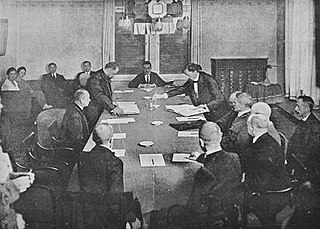
The Latvian–Soviet Peace Treaty, also known as the Treaty of Riga, was signed on 11 August 1920 by representatives of the Republic of Latvia and Soviet Russia. It officially ended the Latvian War of Independence.

Russia, or the Russian Federation, is a transcontinental country spanning Eastern Europe and Northern Asia. It is the largest country in the world, with its internationally recognised territory covering 17,098,246 square kilometres (6,601,670 sq mi), and encompassing one-eighth of Earth's inhabitable landmass. Russia extends across eleven time zones and shares land boundaries with fourteen countries, more than any other country but China. It is the world's ninth-most populous country and Europe's most populous country, with a population of 146 million people. The country's capital and largest city is Moscow, the largest city entirely within Europe. Saint Petersburg is Russia's cultural centre and second-largest city. Other major urban areas include Novosibirsk, Yekaterinburg, Nizhny Novgorod, and Kazan.

Latvia, officially the Republic of Latvia, is a country in the Baltic region of Northern Europe. It is one of the Baltic states; and is bordered by Estonia to the north, Lithuania to the south, Russia to the east, Belarus to the southeast, and shares a maritime border with Sweden to the west. Latvia covers an area of 64,589 km2 (24,938 sq mi), with a population of 1.9 million. The country has a temperate seasonal climate. Its capital and largest city is Riga. Latvians belong to the ethno-linguistic group of the Balts; and speak Latvian, one of the only two surviving Baltic languages. Russians are the most prominent minority in the country, at almost a quarter of the population.
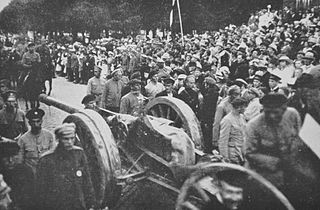
The Latvian War of Independence, sometimes called Latvia's freedom battles or the Latvian War of Liberation, was a series of military conflicts in Latvia between 5 December 1918, after the newly proclaimed Republic of Latvia was invaded by Soviet Russia, and the signing of the Latvian-Soviet Riga Peace Treaty on 11 August 1920.
Germany's Weimar Constitution is signed into law.

The Constitution of the German Reich, usually known as the Weimar Constitution, was the constitution that governed Germany during the Weimar Republic era (1919–1933). The constitution declared Germany to be a democratic parliamentary republic with a legislature elected under proportional representation. Universal suffrage was established, with a minimum voting age of 20. The constitution technically remained in effect throughout the Nazi era from 1933 to 1945, though practically it had been repealed by the Enabling Act of 1933 and thus its various provisions and protections went unenforced for the duration of Nazi rule.
World War I: The Battle of Amiens ends.
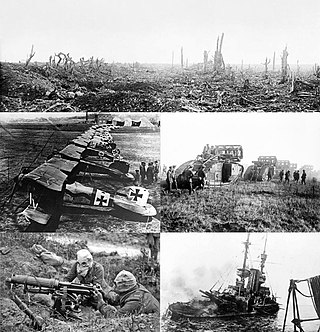
World War I or the First World War, often abbreviated as WWI or WW1, and referred to by some Anglophone authors as the "Great War" or the "War to End All Wars", was a global conflict which lasted from 1914 to 1918, and is considered one of the deadliest conflicts in history. Belligerents included much of Europe, the Russian Empire, the United States, and the Ottoman Empire, with fighting occurring throughout Europe, the Middle East, Africa, the Pacific, and parts of Asia. An estimated 9 million soldiers were killed in combat, plus another 23 million wounded, while 5 million civilians died as a result of military action, hunger, and disease. Millions more died in genocides within the Ottoman Empire and in the 1918 influenza pandemic, which was exacerbated by the movement of combatants during the war.

The Battle of Amiens, also known as the Third Battle of Picardy, was the opening phase of the Allied offensive which began on 8 August 1918, later known as the Hundred Days Offensive, that ultimately led to the end of the First World War. Allied forces advanced over 11 kilometres (7 mi) on the first day, one of the greatest advances of the war, with Gen Henry Rawlinson's British Fourth Army playing the decisive role. The battle is also notable for its effects on both sides' morale and the large number of surrendering German forces. This led Erich Ludendorff to later describe the first day of the battle as "the black day of the German Army". Amiens was one of the first major battles involving armoured warfare.
Spanish–American War: American troops enter the city of Mayagüez, Puerto Rico.
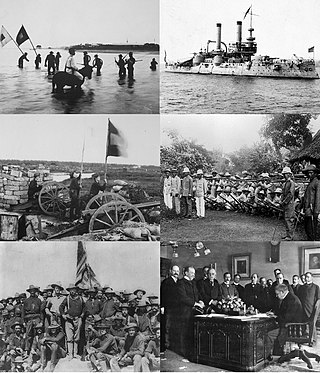
The Spanish–American War was a period of armed conflict between Spain and the United States. Hostilities began in the aftermath of the internal explosion of USS Maine in Havana Harbor in Cuba, leading to United States intervention in the Cuban War of Independence. The war led to the United States emerging predominant in the Caribbean region, and resulted in U.S. acquisition of Spain's Pacific possessions. It led to United States involvement in the Philippine Revolution and later to the Philippine–American War.

Mayagüez is a city and the eighth-largest municipality in Puerto Rico. It was founded as Nuestra Señora de la Candelaria de Mayagüez, and is also known as La Sultana del Oeste, Ciudad de las Aguas Puras, or Ciudad del Mangó. On April 6, 1894, the Spanish Crown granted it the formal title of Excelente Ciudad de Mayagüez. Mayagüez is located in the center of the western coast on the island of Puerto Rico. It has a population of 73,077 in the city proper, and it is a principal city of the Mayagüez Metropolitan Statistical Area and the Mayagüez–San Germán–Cabo Rojo Combined Statistical Area.
An explosion of guncotton occurs in Stowmarket, England, killing 28.

The Stowmarket Guncotton Explosion happened on 11 August 1871 at the Prentices Guncotton Factory in Stowmarket, Suffolk. It was blown up by two massive explosions, that occurred within the factory, killing 28 people and injuring approximately 70 others.
The Eiger in the Bernese Alps is ascended for the first time by Charles Barrington accompanied by Christian Almer and Peter Bohren.

The Eiger is a 3,967-metre (13,015 ft) mountain of the Bernese Alps, overlooking Grindelwald and Lauterbrunnen in the Bernese Oberland of Switzerland, just north of the main watershed and border with Valais. It is the easternmost peak of a ridge crest that extends across the Mönch to the Jungfrau at 4,158 m (13,642 ft), constituting one of the most emblematic sights of the Swiss Alps. While the northern side of the mountain rises more than 3,000 m (10,000 ft) above the two valleys of Grindelwald and Lauterbrunnen, the southern side faces the large glaciers of the Jungfrau-Aletsch area, the most glaciated region in the Alps. The most notable feature of the Eiger is its nearly 1,800-metre-high (5,900 ft) north face of rock and ice, named Eiger-Nordwand, Eigerwand or just Nordwand, which is the biggest north face in the Alps. This huge face towers over the resort of Kleine Scheidegg at its base, on the eponymous pass connecting the two valleys.
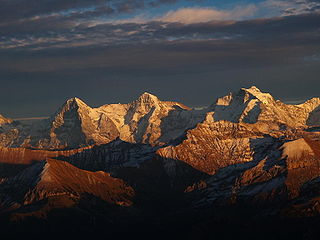
The Bernese Alps are a mountain range of the Alps, located in western Switzerland. Although the name suggests that they are located in the Berner Oberland region of the canton of Bern, portions of the Bernese Alps are in the adjacent cantons of Valais, Fribourg and Vaud, the latter being usually named Fribourg Alps and Vaud Alps respectively. The highest mountain in the range, the Finsteraarhorn, is also the highest point in the canton of Bern.

Charles Barrington, an Irishman from Fassaroe, Bray County Wicklow, was a merchant with little or no mountaineering experience who led the first team to successfully climb the Eiger on 11 August 1858. Heinrich Harrer, in his book about the Eiger north face – The White Spider (1959) – noted that Barrington would have attempted the first ascent of the Matterhorn instead, but he did not have enough money to travel to Zermatt. With the support of two mountain guides, Christian Almer and Peter Bohren, he reached the summit of the Eiger via the west flank.
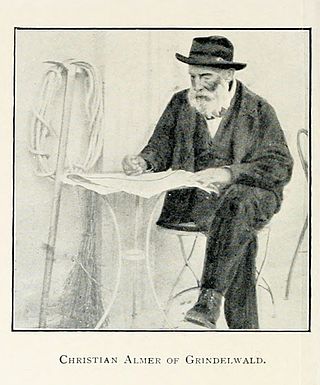
Christian Almer was a Swiss mountain guide and the first ascentionist of many prominent mountains in the western Alps during the golden and silver ages of alpinism. Almer was born and died in Grindelwald, Canton of Bern.

Peter Bohren was a Swiss mountain guide from Grindelwald.
In Colombia, Juan del Corral declares the independence of Antioquia.

Colombia, officially the Republic of Colombia, is a country in South America with an insular region in North America. It is bordered by the Caribbean Sea to the north, Venezuela to the east, Brazil to the southeast, Ecuador and Peru to the south, the Pacific Ocean to the west and Panama to the northwest. Colombia comprises 32 departments and the Capital District of Bogotá, the country's largest city. It covers an area of 1,141,748 square kilometers (440,831 sq mi), with a population of 50 million. Colombia's cultural heritage reflects influences by various Amerindian civilizations, European settlement, enslaved Africans, as well as immigration from Europe and the Middle East. Spanish is the nation's official language, besides which over 70 languages are spoken.
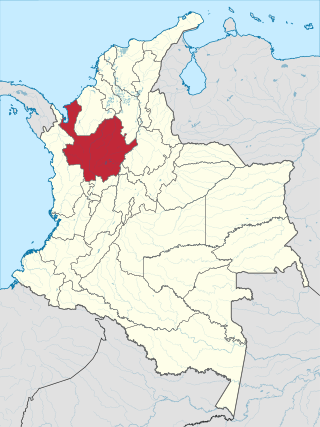
Antioquia is one of the 32 departments of Colombia, located in the central Northwestern part of Colombia with a narrow section that borders the Caribbean Sea. Most of its territory is mountainous with some valleys, much of which is part of the Andes mountain range. Antioquia has been part of many territorial divisions of former countries created within the present-day territory of Colombia. Prior to adoption of the Colombian Constitution of 1886, Antioquia State had its own sovereign government.
Peninsular War: French troops engage British-Portuguese forces in the Battle of Majadahonda.

The Peninsular War (1807–1814) was the military conflict fought in the Iberian Peninsula by Spain, Portugal, and the United Kingdom against the invading and occupying forces of the First French Empire during the Napoleonic Wars. In Spain, it is considered to overlap with the Spanish War of Independence. The war started when the French and Spanish armies invaded and occupied Portugal in 1807 by transiting through Spain, and it escalated in 1808 after Napoleonic France occupied Spain, which had been its ally. Napoleon Bonaparte forced the abdications of Ferdinand VII and his father Charles IV and then installed his brother Joseph Bonaparte on the Spanish throne and promulgated the Bayonne Constitution. Most Spaniards rejected French rule and fought a bloody war to oust them. The war on the peninsula lasted until the Sixth Coalition defeated Napoleon in 1814, and is regarded as one of the first wars of national liberation. It is also significant for the emergence of large-scale guerrilla warfare.

The United Kingdom of Great Britain and Northern Ireland, commonly known as the United Kingdom (UK) or Britain, is a country in Europe, off the north-western coast of the continental mainland. It comprises England, Scotland, Wales and Northern Ireland. The United Kingdom includes the island of Great Britain, the north-eastern part of the island of Ireland, and many smaller islands within the British Isles. Northern Ireland shares a land border with the Republic of Ireland; otherwise, the United Kingdom is surrounded by the Atlantic Ocean, the North Sea, the English Channel, the Celtic Sea and the Irish Sea. The total area of the United Kingdom is 242,495 square kilometres (93,628 sq mi), with an estimated 2020 population of more than 67 million people.

Portugal, officially the Portuguese Republic, is a country whose mainland is located on the Iberian Peninsula of Southwestern Europe, and whose territory also includes the Atlantic archipelagos of the Azores and Madeira. It features the westernmost point in continental Europe, and its Iberian portion is bordered to the west and south by the Atlantic Ocean and to the north and east by Spain, the sole country to have a land border with Portugal. Its two archipelagos form two autonomous regions with their own regional governments. Lisbon is the capital and largest city by population.

The Battle of Majadahonda saw an Imperial French cavalry division led by Anne-François-Charles Trelliard attack two brigades of cavalry under Benjamin d'Urban and forming the advance guard of Arthur Wellesley, Earl of Wellington's army. Trelliard's leading brigade routed d'Urban's Portuguese horsemen and overran three British cannons. King's German Legion (KGL) cavalry led by Eberhardt Otto George von Bock intervened to halt the Imperial French horsemen, but were finally compelled to withdraw when Trelliard committed his second and third brigades to the contest. The Imperial French cavalry was unable to cope with a KGL infantry battalion defending a village and they withdrew at the approach of additional British cavalry and infantry. This Peninsular War action was fought near Majadahonda, which is located 16 kilometres (9.9 mi) northwest of Madrid.
Francis II assumes the title of first Emperor of Austria.
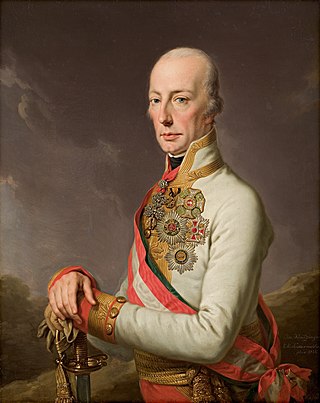
Francis II was the last Holy Roman Emperor and the founder and Emperor of the Austrian Empire, from 1804 to 1835. He assumed the title of Emperor of Austria in response to the coronation of Napoleon as Emperor of the French. Soon after Napoleon created the Confederation of the Rhine, Francis abdicated as Holy Roman Emperor. He was King of Hungary, Croatia and Bohemia. He also served as the first president of the German Confederation following its establishment in 1815.

The Emperor of Austria was the ruler of the Austrian Empire and later the Austro-Hungarian Empire. A hereditary imperial title and office proclaimed in 1804 by Holy Roman Emperor Francis II, a member of the House of Habsburg-Lorraine, and continually held by him and his heirs until Charles I relinquished power in 1918.
Francis Light founded George Town, the first British settlement in Southeast Asia and the present-day capital of the Malaysian state of Penang.

Captain Francis Light was a British explorer and the founder of the British colony of Penang and its capital city of George Town in 1786. Light and his lifelong partner, Martina Rozells, were the parents of William Light, who founded the city of Adelaide in South Australia.

George Town, formerly known as Tanjung Penaga is the capital city of the Malaysian state of Penang. George Town is Malaysia's sixth most populous city with 708,127 inhabitants as of 2010, while Greater Penang, with a population of 2,412,616, is the second largest conurbation in the country after Greater Kuala Lumpur. The historical core of George Town has been inscribed as a UNESCO World Heritage Site since 2008.

Penang is a Malaysian state located on the northwest coast of Peninsular Malaysia, by the Malacca Strait. It has two parts: Penang Island, where the capital city, George Town, is located, and Seberang Perai on the Malay Peninsula. They are connected by Malaysia's two longest road bridges, the Penang Bridge and the Sultan Abdul Halim Muadzam Shah Bridge; the latter is also the second longest oversea bridge in Southeast Asia. The second smallest Malaysian state by land mass, Penang is bordered by Kedah to the north and the east, and Perak to the south.
Captain Francis Light establishes the British colony of Penang in Malaysia.

Captain Francis Light was a British explorer and the founder of the British colony of Penang and its capital city of George Town in 1786. Light and his lifelong partner, Martina Rozells, were the parents of William Light, who founded the city of Adelaide in South Australia.

Penang is a Malaysian state located on the northwest coast of Peninsular Malaysia, by the Malacca Strait. It has two parts: Penang Island, where the capital city, George Town, is located, and Seberang Perai on the Malay Peninsula. They are connected by Malaysia's two longest road bridges, the Penang Bridge and the Sultan Abdul Halim Muadzam Shah Bridge; the latter is also the second longest oversea bridge in Southeast Asia. The second smallest Malaysian state by land mass, Penang is bordered by Kedah to the north and the east, and Perak to the south.

Malaysia is a country in Southeast Asia. The federal constitutional monarchy consists of thirteen states and three federal territories, separated by the South China Sea into two regions, Peninsular Malaysia and Borneo's East Malaysia. Peninsular Malaysia shares a land and maritime border with Thailand and maritime borders with Singapore, Vietnam, and Indonesia. East Malaysia shares land and maritime borders with Brunei and Indonesia and a maritime border with the Philippines and Vietnam. Kuala Lumpur is the national capital, largest city and the seat of the legislative branch of the federal government. The nearby planned capital of Putrajaya is the administrative capital, which represents the seat of both the executive branch and the judicial branch of the federal government. With a population of over 32 million, Malaysia is the world's 45th-most populous country. The southernmost point of continental Eurasia is in Tanjung Piai. In the tropics, Malaysia is one of 17 megadiverse countries, home to numerous endemic species.
Franco-Dutch War: Forces of the Holy Roman Empire defeat the French in the Battle of Konzer Brücke.
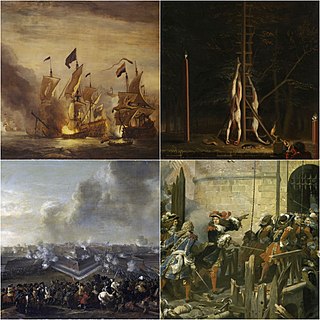
The Franco-Dutch War, also known as the Dutch War, was fought between France and the Dutch Republic, supported by its allies the Holy Roman Empire, Spain, Brandenburg-Prussia and Denmark-Norway. In its early stages, France was allied with Münster and Cologne, as well as England. The 1672 to 1674 Third Anglo-Dutch War and 1675 to 1679 Scanian War are considered related conflicts.

The Holy Roman Empire, also known after 1512 as the Holy Roman Empire of the German Nation, was a political entity in Western, Central, and Southern Europe that developed during the Early Middle Ages and continued until its dissolution in 1806 during the Napoleonic Wars.

France, officially the French Republic, is a transcontinental country predominantly located in Western Europe and spanning overseas regions and territories in the Americas and the Atlantic, Pacific and Indian Oceans. Its metropolitan area extends from the Rhine to the Atlantic Ocean and from the Mediterranean Sea to the English Channel and the North Sea; overseas territories include French Guiana in South America, Saint Pierre and Miquelon in the North Atlantic, the French West Indies, and many islands in Oceania and the Indian Ocean. Due to its several coastal territories, France has the largest exclusive economic zone in the world. France borders Belgium, Luxembourg, Germany, Switzerland, Monaco, Italy, Andorra, and Spain in continental Europe, as well as the Netherlands, Suriname, and Brazil in the Americas via its overseas territories in French Guiana and Saint Martin. Its eighteen integral regions span a combined area of 643,801 km2 (248,573 sq mi) and contain close to 68 million people. France is a unitary semi-presidential republic with its capital in Paris, the country's largest city and main cultural and commercial centre; other major urban areas include Marseille, Lyon, Toulouse, Lille, Bordeaux, and Nice.
The Battle of Konzer Brücke was fought as part of the Franco-Dutch War on 11 August 1675 and resulted in an Imperial victory.
The first papal conclave to be held in the Sistine Chapel elected Roderic Borja as Pope Alexander VI to succeed Innocent VIII.

The 1492 papal conclave was convened after the death of Pope Innocent VIII. It was the first papal conclave to be held in the Sistine Chapel.

The Sistine Chapel is a chapel in the Apostolic Palace, in Vatican City and the official residence of the pope. Originally known as the Cappella Magna, the chapel takes its name from Pope Sixtus IV, who had it built between 1473 and 1481. Since that time, the chapel has served as a place of both religious and functionary papal activity. Today, it is the site of the papal conclave, the process by which a new pope is selected. The fame of the Sistine Chapel lies mainly in the frescoes that decorate the interior, most particularly the Sistine Chapel ceiling and The Last Judgment, both by Michelangelo.

Pope Alexander VI was head of the Catholic Church and ruler of the Papal States from 11 August 1492 until his death in 1503.

Pope Innocent VIII, born Giovanni Battista Cybo, was head of the Catholic Church and ruler of the Papal States from 29 August 1484 to his death in July 1492. Son of the viceroy of Naples, Battista spent his early years at the Neapolitan court. He became a priest in the retinue of Cardinal Calandrini, half-brother to Pope Nicholas V (1447–55), Bishop of Savona under Pope Paul II, and with the support of Cardinal Giuliano Della Rovere. After intense politicking by Della Rovere, Cibo was elected pope in 1484. King Ferdinand I of Naples had supported Cybo's competitor, Rodrigo Borgia. The following year, Pope Innocent supported the barons in their failed revolt.
Rodrigo de Borja is elected as Head of the Catholic Church, taking the name Pope Alexander VI.

Pope Alexander VI was head of the Catholic Church and ruler of the Papal States from 11 August 1492 until his death in 1503.
The Battle of Otlukbeli: Mehmed the Conqueror of the Ottoman Empire decisively defeats Uzun Hassan of Aq Qoyunlu.
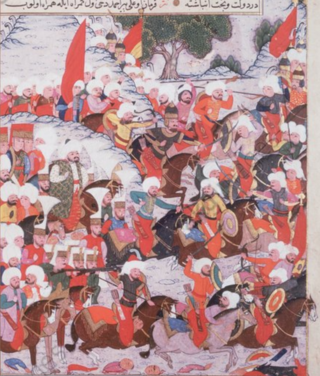
The Battle of Otlukbeli or Otluk Beli was a battle between Aq Qoyunlu and the Ottoman Empire that was fought on August 11, 1473.

Mehmed II, commonly known as Mehmed the Conqueror, was an Ottoman sultan who ruled from August 1444 to September 1446, and then later from February 1451 to May 1481. In Mehmed II's first reign, he defeated the crusade led by John Hunyadi after the Hungarian incursions into his country broke the conditions of the truce Peace of Szeged. When Mehmed II ascended the throne again in 1451, he strengthened the Ottoman navy and made preparations to attack Constantinople. At the age of 21, he conquered Constantinople and brought an end to the Byzantine Empire.
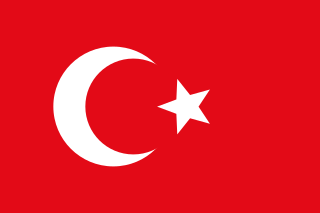
The Ottoman Empire, also known as the Turkish Empire, was an empire that controlled much of Southeast Europe, Western Asia, and Northern Africa between the 14th and early 20th centuries. It was founded at the end of the 13th century in northwestern Anatolia in the town of Söğüt by the Turkoman tribal leader Osman I. After 1354, the Ottomans crossed into Europe and, with the conquest of the Balkans, the Ottoman beylik was transformed into a transcontinental empire. The Ottomans ended the Byzantine Empire with the conquest of Constantinople in 1453 by Mehmed the Conqueror.
Uzun Hasan or Uzun Hassan was a ruler of the Turkoman Aq Qoyunlu state and is generally considered to be its strongest ruler. Hasan ruled between 1452 and 1478, and would preside over the confederation's territorial apex, when it included parts or all of present-day Iraq, Turkey, Azerbaijan, Iran, Transcaucasia and Syria.

The Aq Qoyunlu was a culturally Persianate, Sunni Turkoman tribal confederation founded in the Diyarbakir region by Qara Yuluk Uthman Beg that ruled parts of present-day eastern Turkey from 1378 to 1503, and in their last decades also ruled Armenia, Azerbaijan, much of Iran, Iraq, and Oman where the ruler of Hormuz recognised Aq Qoyunlu suzerainty. The Aq Qoyunlu empire reached its zenith under Uzun Hasan.
Wars of Scottish Independence: Battle of Dupplin Moor: Scots under Domhnall II, Earl of Mar are routed by Edward Balliol.

The Wars of Scottish Independence were a series of military campaigns fought between the Kingdom of Scotland and the Kingdom of England in the late 13th and early 14th centuries.
The Battle of Dupplin Moor was fought between supporters of King David II of Scotland, the son of King Robert Bruce, and English-backed invaders supporting Edward Balliol, son of King John I of Scotland, on 11 August 1332. It took place a little to the south west of Perth, Scotland, when a Scottish force commanded by Donald, Earl of Mar, estimated to have been stronger than 15,000 and possibly as many as 40,000 men, attacked a largely English force of 1,500 commanded by Balliol and Henry Beaumont, Earl of Buchan. This was the first major battle of the Second War of Scottish Independence.
Domhnall II, Earl of Mar was briefly Regent of Scotland during the minority of David II, King of Scotland.

Edward Balliol was a claimant to the Scottish throne during the Second War of Scottish Independence. With English help, he ruled parts of the kingdom from 1332 to 1356.
The Great Famine of Europe becomes so dire that even the king of England has difficulties buying bread for himself and his entourage.

The Great Famine of 1315–1317 was the first of a series of large-scale crises that struck Europe early in the 14th century. Most of Europe was affected. The famine caused many deaths over an extended number of years and marked a clear end to the period of growth and prosperity from the 11th to the 13th centuries.
Reconquista: Aragonese forces led by King James II landed on the coast of Almería, beginning an ultimately unsuccessful siege of the city, then held by the Emirate of Granada.

The Reconquista is a historiographical construction describing the 781-year period in the history of the Iberian Peninsula between the Umayyad conquest of Hispania in 711 and the fall of the Nasrid kingdom of Granada in 1492, in which the Christian kingdoms expanded through war and conquered al-Andalus; the territories of Iberia ruled by Muslims. The concept of a Reconquista emerged in Western and especially in Spanish historiography in the 19th century, and was a fundamental component of Spanish nationalism.

The Crown of Aragon was a composite monarchy ruled by one king, originated by the dynastic union of the Kingdom of Aragon and the County of Barcelona and ended as a consequence of the War of the Spanish Succession. At the height of its power in the 14th and 15th centuries, the Crown of Aragon was a thalassocracy controlling a large portion of present-day eastern Spain, parts of what is now southern France, and a Mediterranean empire which included the Balearic Islands, Sicily, Corsica, Sardinia, Malta, Southern Italy and parts of Greece.

James II, called the Just, was the King of Aragon and Valencia and Count of Barcelona from 1291 to 1327. He was also the King of Sicily from 1285 to 1295 and the King of Majorca from 1291 to 1298. From 1297 he was nominally the King of Sardinia and Corsica, but he only acquired the island of Sardinia by conquest in 1324. His full title for the last three decades of his reign was "James, by the grace of God, king of Aragon, Valencia, Sardinia and Corsica, and count of Barcelona".

Almería is a city and municipality of Spain, located in Andalusia. It is the capital of the province of the same name. It lies on southeastern Iberia on the Mediterranean Sea. Caliph Abd al-Rahman III founded the city in 955. The city grew wealthy during the Islamic era, becoming a world city throughout the 11th and 12th centuries. It enjoyed an active port that traded silk, oil and raisins.
The siege of Almería was an unsuccessful attempt by Aragon to capture the city of Almería from the Emirate of Granada in 1309. Almería, a Mediterranean port in the southeast of the emirate, was the initial Aragonese target in a joint Aragonese-Castilian campaign aimed at conquering Granada. The Aragonese troops led by their King James II arrived on 11 August, blockading the city and employing siege engines. The city, led by governor Abu Maydan Shuayb and naval commander Abu al-Hasan al-Randahi, prepared for the siege by strengthening its defenses and stockpiling food. Throughout the siege, both sides exchanged shots from siege engines and engaged in fields battles and skirmishes with varying results. James ordered multiple unsuccessful assaults. A Granadan relief column under Uthman ibn Abi al-Ula arrived nearby in September and harassed the besiegers.

The Emirate of Granada, also known as the Nasrid Kingdom of Granada, was an Islamic realm in southern Iberia during the Late Middle Ages. It was the last independent Muslim state in Western Europe.
The Qarmatians of Bahrayn capture and pillage the city of Basra.
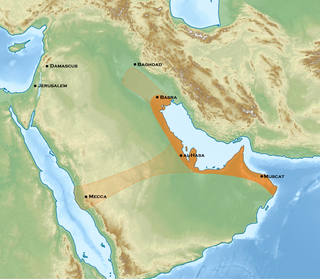
The Qarmatians were a militant Isma'ili Shia movement centred in al-Hasa in Eastern Arabia, where they established a religious-utopian socialist state in 899 CE. Its members were part of a movement that adhered to a syncretic branch of Sevener Ismaili Shia Islam, and were ruled by a dynasty founded by Abu Sa'id al-Jannabi, a Persian from Jannaba in coastal Fars. They rejected the claim of Fatimid caliph Abdallah al-Mahdi Billah to imamate and clung to their belief in the coming of the Mahdi, and they revolted against the Fatimid and Abbasid Caliphates.

Eastern Arabia, historically known as Al-Bahrayn until the 18th century, is a region stretched from Basra to Khasab along the Persian Gulf coast and included parts of modern-day Bahrain, Kuwait, Eastern Saudi Arabia, United Arab Emirates, Qatar, and Oman. The entire coastal strip of Eastern Arabia was known as "Bahrain" for a millennium.
The Sack of Basra was the capture and looting of the Abbasid city of Basra by the Qarmatians of Bahrayn, and took place in August 923. It was the first of a series of Qarmatian attacks, that culminated in an invasion of Iraq in 927–928.

Basra is an Iraqi city located on the Shatt al-Arab. It had an estimated population of 1.4 million in 2018. Basra is also Iraq's main port, although it does not have deep water access, which is handled at the port of Umm Qasr.
Battle of Adda: The Goths under Theodoric the Great and his ally Alaric II defeat the forces of Odoacer on the Adda River, near Milan.

The Goths were a Germanic people who played a major role in the fall of the Western Roman Empire and the emergence of medieval Europe.

Theodoric the Great, also called Theodoric the Amal, was king of the Ostrogoths (471–526), and ruler of the independent Ostrogothic Kingdom of Italy between 493 and 526, regent of the Visigoths (511–526), and a patrician of the Eastern Roman Empire. As ruler of the combined Gothic realms, Theodoric controlled an empire stretching from the Atlantic Ocean to the Adriatic Sea. Though Theodoric himself only used the title 'king' (rex), some scholars characterize him as a Western Roman Emperor in all but name, since he ruled large parts of the former Western Roman Empire, had received the former Western imperial regalia from Constantinople in 497, and was referred to by the title augustus by some of his subjects.

Alaric II was the King of the Visigoths from 484 until 507. He succeeded his father Euric as king of the Visigoths in Toulouse on 28 December 484; he was the great-grandson of the more famous Alaric I, who sacked Rome in 410. He established his capital at Aire-sur-l'Adour in Aquitaine. His dominions included not only the majority of Hispania but also Gallia Aquitania and the greater part of an as-yet undivided Gallia Narbonensis.
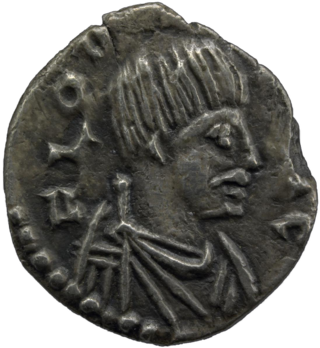
Flavius Odoacer, also spelled Odovacer or Odovacar, was a soldier and statesman of barbarian background, who deposed the child emperor Romulus Augustulus and became Rex/Dux (476–493). Odoacer's overthrow of Romulus Augustulus is traditionally seen as marking the end of the Western Roman Empire as well as Ancient Rome.

The Adda is a river in North Italy, a tributary of the Po. It rises in the Alps near the border with Switzerland and flows through Lake Como. The Adda joins the Po a few kilometres upstream of Cremona. It is 313 kilometres (194 mi) long. The highest point of the drainage basin is the summit of la Spedla, at 4,020 metres (13,190 ft).

Milan is a city in northern Italy, capital of Lombardy, and the second-most populous city proper in Italy after Rome. The city proper has a population of about 1.4 million, while its metropolitan city has 3.26 million inhabitants. Its continuously built-up urban area is the fourth largest in the EU with 5.27 million inhabitants. According to national sources, the population within the wider Milan metropolitan area, is estimated between 8.2 million and 12.5 million making it by far the largest metropolitan area in Italy and one of the largest in the EU.
Claudius Silvanus, accused of treason, proclaims himself Roman Emperor against Constantius II.
Silvanus was a Roman general of Frankish descent, usurper in Gaul against Emperor Constantius II for 28 days in AD 355.
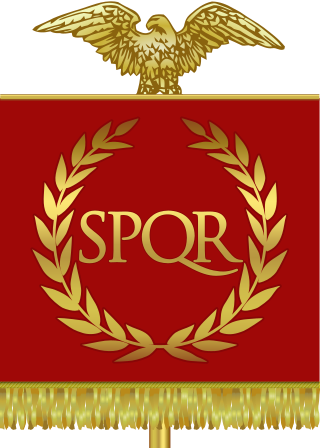
The Roman emperor was the ruler of the Roman Empire during the imperial period. The emperors used a variety of different titles throughout history. Often when a given Roman is described as becoming "emperor" in English it reflects his taking of the title augustus. Another title often used was caesar, used for heirs-apparent, and imperator, originally a military honorific. Early emperors also used the title princeps civitatis. Emperors frequently amassed republican titles, notably princeps senatus, consul, and pontifex maximus.

Constantius II was Roman emperor from 337 to 361. His reign saw constant warfare on the borders against the Sasanian Empire and Germanic peoples, while internally the Roman Empire went through repeated civil wars, court intrigues, and usurpations. His religious policies inflamed domestic conflicts that would continue after his death.
The region of Dacia, comprising parts of modern Romania, became a province of the Roman Empire.
Year 106 (CVI) was a common year starting on Thursday of the Julian calendar. At the time, it was known as the Year of the Consulship of Commodus and Civica. The denomination 106 for this year has been used since the early medieval period, when the Anno Domini calendar era became the prevalent method in Europe for naming years.
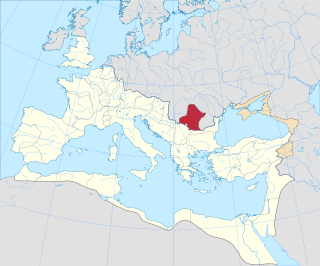
Roman Dacia was a province of the Roman Empire from 106 to 271–275 AD. Its territory consisted of what are now the regions of Oltenia, Transylvania and Banat. During Roman rule, it was organized as an imperial province on the borders of the empire. It is estimated that the population of Roman Dacia ranged from 650,000 to 1,200,000. It was conquered by Trajan (98–117) after two campaigns that devastated the Dacian Kingdom of Decebalus. However, the Romans did not occupy its entirety; Crișana, Maramureș, and most of Moldavia remained under the Free Dacians.

The Roman provinces were the administrative regions of Ancient Rome outside Roman Italy that were controlled by the Romans under the Roman Republic and later the Roman Empire. Each province was ruled by a Roman appointed as governor.
The south-western part of Dacia (modern Romania) becomes a Roman province: Roman Dacia.
Year 106 (CVI) was a common year starting on Thursday of the Julian calendar. At the time, it was known as the Year of the Consulship of Commodus and Civica. The denomination 106 for this year has been used since the early medieval period, when the Anno Domini calendar era became the prevalent method in Europe for naming years.

Dacia was the land inhabited by the Dacians, its core in Transylvania, stretching to the Danube in the south, the Black Sea in the east, and the Tisza in the west. The Carpathian Mountains were located in the middle of Dacia. It thus roughly corresponds to the present-day countries of Romania, as well as parts of Moldova, Bulgaria, Serbia, Hungary, Slovakia, and Ukraine.

Romania is a country located at the crossroads of Central, Eastern, and Southeast Europe. It borders Bulgaria to the south, Ukraine to the north, Hungary to the west, Serbia to the southwest, Moldova to the east, and the Black Sea to the southeast. It has a predominantly temperate-continental climate, and an area of 238,397 km2 (92,046 sq mi), with a population of around 19 million. Romania is the twelfth-largest country in Europe and the sixth-most populous member state of the European Union. Its capital and largest city is Bucharest, followed by Iași, Cluj-Napoca, Timișoara, Constanța, Craiova, Brașov, and Galați.

The Roman provinces were the administrative regions of Ancient Rome outside Roman Italy that were controlled by the Romans under the Roman Republic and later the Roman Empire. Each province was ruled by a Roman appointed as governor.

Roman Dacia was a province of the Roman Empire from 106 to 271–275 AD. Its territory consisted of what are now the regions of Oltenia, Transylvania and Banat. During Roman rule, it was organized as an imperial province on the borders of the empire. It is estimated that the population of Roman Dacia ranged from 650,000 to 1,200,000. It was conquered by Trajan (98–117) after two campaigns that devastated the Dacian Kingdom of Decebalus. However, the Romans did not occupy its entirety; Crișana, Maramureș, and most of Moldavia remained under the Free Dacians.
Traditional date of the defeat of Bel by Hayk, progenitor and founder of the Armenian nation.
The 25th century BC was a century that lasted from the year 2500 BC to 2401 BC.

Bêl is a title signifying "lord" or "master" applied to various gods in the Mesopotamian religion of Akkad, Assyria, and Babylonia. The feminine form is Bêlit in Akkadian. Bel is represented in Greek as Belos and in Latin as Belus. Belit appears in Greek form as Beltis (Βελτις). Linguistically, Bel is an East Semitic form cognate with the Northwest Semitic Baal with the same meaning.
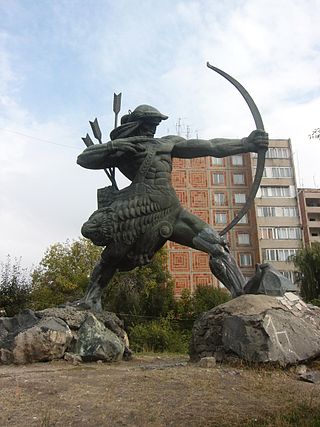
Hayk, also known as Hayk Nahapet, is the legendary patriarch and founder of the Armenian nation. His story is told in the History of Armenia attributed to the Armenian historian Moses of Chorene and in the Primary History traditionally attributed to Sebeos. Fragments of the legend of Hayk are also preserved in the works of other authors, as well as in Armenian folk tradition.

Armenians are an ethnic group native to the Armenian highlands of Western Asia. Armenians constitute the main population of Armenia and the de facto independent Artsakh. There is a wide-ranging diaspora of around five million people of full or partial Armenian ancestry living outside modern Armenia. The largest Armenian populations today exist in Russia, the United States, France, Georgia, Iran, Germany, Ukraine, Lebanon, Brazil, and Syria. With the exceptions of Iran and the former Soviet states, the present-day Armenian diaspora was formed mainly as a result of the Armenian genocide.
The Mesoamerican Long Count calendar, used by several pre-Columbian Mesoamerican civilizations, notably the Maya, begins.
The 32nd century BC was a century that lasted from the year 3200 BC to 3101 BC.
The Mesoamerican Long Count calendar is a non-repeating, vigesimal (base 20) and octodecimal (base 18) calendar used by several pre-Columbian Mesoamerican cultures, most notably the Maya. For this reason, it is often known as the Maya Long Count calendar. Using a modified vigesimal tally, the Long Count calendar identifies a day by counting the number of days passed since a mythical creation date that corresponds to August 11, 3114 BCE in the proleptic Gregorian calendar. The Long Count calendar was widely used on monuments.

In the history of the Americas, the pre-Columbian era spans from the original settlement of North and South America in the Upper Paleolithic period through European colonization, which began with Christopher Columbus's voyage of 1492. Usually, the era covers the history of Indigenous cultures until significant influence by Europeans. This may have occurred decades or even centuries after Columbus for certain cultures.

Mesoamerica is a historical region and cultural area in southern North America and most of Central America. It extends from approximately central Mexico through Belize, Guatemala, El Salvador, Honduras, Nicaragua, and northern Costa Rica. Within this region pre-Columbian societies flourished for more than 3,000 years before the Spanish colonization of the Americas. Mesoamerica was the site of two of the most profound historical transformations in world history: primary urban generation, and the formation of New World cultures out of the long encounters among indigenous, European, African and Asian cultures.

The Maya civilization of the Mesoamerican people is known by its ancient temples and glyphs. Its Maya script is the most sophisticated and highly developed writing system in the pre-Columbian Americas. It is also noted for its art, architecture, mathematics, calendar, and astronomical system.
Anne Heche, American actress (b. 1969) deaths

Anne Celeste Heche was an American actress, known for her roles in a variety of genres in film, television, and theater, receiving numerous accolades, including a National Board of Review Award and multiple Emmy Awards.
Trini Lopez, Mexican American singer and guitarist (b. 1937) deaths

Trinidad López III was an American singer, guitarist, and actor. His first album included a cover version of Pete Seeger's "If I Had a Hammer", which earned a Golden Disc for him. His other hits included "Lemon Tree", "I'm Comin' Home, Cindy" and "Sally Was a Good Old Girl". He designed two guitars for the Gibson Guitar Corporation, which are now collectors’ items. A documentary on his life and career, "My Name is Lopez" was released in April 2022.
Sumner Redstone, American billionaire businessman (b. 1923) deaths
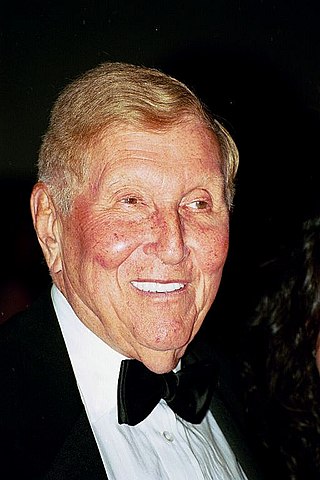
Sumner Murray Redstone was an American billionaire businessman and media magnate. He was the founder and chairman of the second incarnation of Viacom which was dissolved in 2019 and was the majority owner and chairman of the National Amusements theater chain. Through National Amusements, Redstone, up until his death, was, and his family remains, majority voting shareholder of mass media conglomerate ViacomCBS, in turn, the parent company of the Paramount Pictures film studio, the CBS television network, and various cable networks. According to Forbes, as of April 2020, he was worth US$2.6 billion.
Sergio Obeso Rivera, Mexican Roman Catholic cardinal (b. 1931) deaths
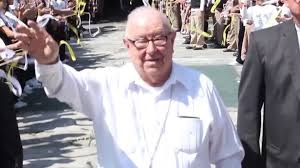
Sergio Obeso Rivera was a Mexican prelate of the Catholic Church. He was Archbishop of Xalapa from 1979 to 2007 after serving as Bishop of Papantla from 1971 to 1974 and then as coadjutor in Xalapa from 1974 to 1979. Pope Francis created him a cardinal on 28 June 2018.
V S Naipaul, British writer, Nobel Prize laureate (b. 1932) deaths

Sir Vidiadhar Surajprasad Naipaul was a Trinidadian-born British writer of works of fiction and nonfiction in English. He is known for his comic early novels set in Trinidad, his bleaker novels of alienation in the wider world, and his vigilant chronicles of life and travels. He wrote in prose that was widely admired, but his views sometimes aroused controversy. He published more than thirty books over fifty years.

The Nobel Prize in Literature is a Swedish literature prize that is awarded annually, since 1901, to an author from any country who has, in the words of the will of Swedish industrialist Alfred Nobel, "in the field of literature, produced the most outstanding work in an idealistic direction". Though individual works are sometimes cited as being particularly noteworthy, the award is based on an author's body of work as a whole. The Swedish Academy decides who, if anyone, will receive the prize. The academy announces the name of the laureate in early October. It is one of the five Nobel Prizes established by the will of Alfred Nobel in 1895. Literature is traditionally the final award presented at the Nobel Prize ceremony. On some occasions the award has been postponed to the following year, most recently in 2018 as of May 2022.
Yisrael Kristal, Polish-Israeli supercentenarian; oldest living Holocaust survivor and one of the ten oldest men ever (b. 1903) deaths

Yisrael Kristal was a Polish-Israeli supercentenarian recognized in 2014 as the oldest living Holocaust survivor. After the death of Yasutaro Koide, of Japan, on 18 January 2016, he was also recognized as the oldest living man in the world as well as one of the ten oldest men ever at his death at age 113 years and 330 days.
Segun Bucknor, Nigerian musician and journalist (b. 1946) deaths
Segun Bucknor was a Nigerian musician and journalist active during the 1960s and 1970s. He was a pianist and guitarist specializing in genres ranging from soul music to pop music and to funk. Through their brief career, Segun Bucknor and the Assembly released a variety of music dealing with Nigerian culture or political influence which was described by the BBC as an "interesting slice of Nigerian pop music history and culture".
Serge Collot, French viola player and educator (b. 1923) deaths
Serge Collot was a French violist and music educator.
Harald Nielsen, Danish footballer and manager (b. 1941) deaths

Harald Ingemann Nielsen was a Danish footballer who played as a forward. He played professionally for Italian club Bologna F.C. where he was the league top scorer (capocannoniere) in Bologna's 1964 Serie A championship winning season. Harald Nielsen played 14 games for the Denmark national team in 1959 and 1960, scoring 15 goals, and he was known as Guld-Harald (Gold-Harald). He was a football entrepreneur having continuously worked for the professionalization of both the Danish national team and the national league.
Richard Oriani, Salvadoran-American metallurgist and engineer (b. 1920) deaths
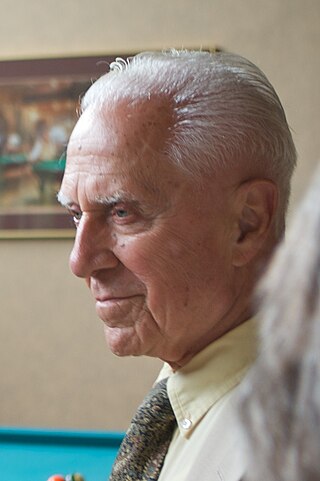
Richard A. Oriani was an El Salvador-born American chemical engineer and metallurgist who was instrumental in the study of the effects of hydrogen in metal. He also made significant contributions to the field of cold fusion.
Vladimir Beara, Croatian footballer and manager (b. 1928) deaths

Vladimir Beara was a Yugoslav football goalkeeper and manager. He played the vast majority of his professional club career for Hajduk Split and Red Star Belgrade in the Yugoslav Federal League and for the Yugoslavia national football team. He is considered to have been one of the best goalkeepers of his era.
Raymond Gravel, Canadian priest and politician (b. 1952) deaths
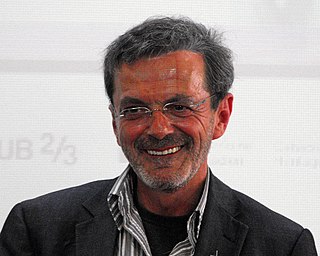
Raymond Gravel was a Canadian Catholic priest and politician from the province of Quebec. Gravel was formerly the Member of Parliament for the riding of Repentigny, as a member of the Bloc Québécois. He was elected to the House of Commons in a November 27, 2006 by-election following the death of Benoît Sauvageau.
Kika Szaszkiewiczowa, Polish author and blogger (b. 1917) deaths

Irena "Kika" Szaszkiewiczowa was a Polish artist, writer and blogger.
Robin Williams, American actor and comedian (b. 1951) deaths

Robin McLaurin Williams was an American actor and comedian. Known for his improvisational skills and the wide variety of characters he created on the spur of the moment and portrayed on film, in dramas and comedies alike, he is regarded as one of the greatest comedians of all time.
Raymond Delisle, French cyclist (b. 1943) deaths
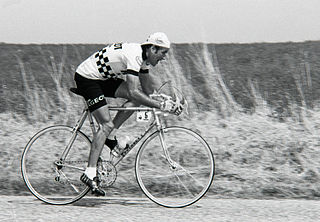
Raymond Delisle was a French professional road bicycle racer. His sporting career began with ACBB Paris. He is the only rider to have won a stage of the Tour de France on 14 July, France's national day, while wearing the jersey of national champion.
Zafar Futehally, Indian ornithologist and author (b. 1919) deaths
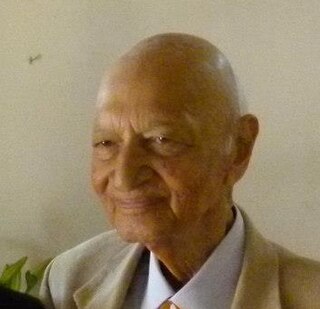
Zafar Rashid Futehally was an Indian naturalist and conservationist best known for his work as the secretary of the Bombay Natural History Society and for the Newsletter for Birdwatchers a periodical that helped birdwatchers around India to communicate their observations. Awarded Padma Shri by the Government of India in the year 1971, Zafar Futehally was also honoured with Dutch order of merit the Order of the Golden Ark in 1981 and Karnataka Rajyotsava award by the Government of Karnataka in 1983.
David Howard, English ballet dancer and educator (b. 1937) deaths
David Howard was an English ballet dancer and teacher, who taught internationally at institutions such as the Royal Ballet, the American Ballet Theatre, San Francisco Ballet, Joffrey Ballet, and the National Ballet of Canada. Howard opened his popular eponymous dance studio in New York City, the David Howard School of Ballet in 1977, before its closure in 1995. His dance center welcomed all students including children, adult beginners and professionals from the Broadway musicals and ballet. In addition to his teaching, Howard was an expert on the history of the pointe shoe worn by ballet dancers, and a pioneer in their design.
Red Bastien, American wrestler, trainer, and promoter (b. 1931) deaths

Rolland "Red" Bastien was an American professional wrestler best known for his time in Capital Wrestling Corporation where he was a 3 time WWWF United States Tagteam champion with his kayfabe brother, Lou Bastien.
Michael Dokes, American boxer (b. 1958) deaths
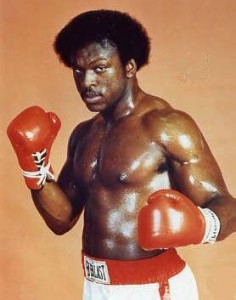
Michael Marshall Dokes was an American professional boxer who competed from 1976 to 1997, and held the WBA heavyweight title from 1982 to 1983. As an amateur he won a silver medal in the heavyweight division at the 1975 Pan American Games.
Lucy Gallardo, Argentinian-Mexican actress and screenwriter (b. 1929) deaths
Lucy Gallardo was an Argentine-born Mexican actress and screenwriter. She was best known for her numerous roles in Mexican cinema, as well as Mexico's telenovelas. Gallardo was the widow of Mexican actor Enrique Rambal.
Eunice Kennedy Shriver, American activist, founded the Special Olympics (b. 1921) deaths

Eunice Mary Kennedy Shriver was an American philanthropist and a member of the Kennedy family. She was the founder of the Special Olympics, a sports organization for persons with physical and intellectual disabilities. For her efforts on behalf of disabled people, Shriver was awarded the Presidential Medal of Freedom in 1984.

Special Olympics is the world's largest sports organization for children and adults with intellectual disabilities and physical disabilities, providing year-round training and activities to 5 million participants and Unified Sports partners in 172 countries. Special Olympics competitions are held every day, all around the world—including local, national and regional competitions, adding up to more than 100,000 events a year. Like the International Paralympic Committee, the Special Olympics organization is recognized by the International Olympic Committee; however, unlike the Paralympic Games, Special Olympics World Games are not held in the same year nor in conjunction with the Olympic Games.
George Furth, American actor and playwright (b. 1932) deaths
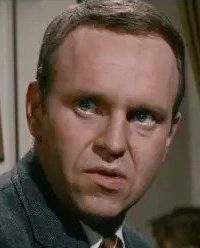
George Furth was an American librettist, playwright, and actor.
Dursun Karataş, founding leader of the Revolutionary People's Liberation Party–Front (DHKP-C) in Turkey (b. 1952) deaths

Dursun Karataş was a Turkish communist of Kurdish descent. He commanded the revolutionary left and DHKP-C. DHKP-C is seen as a "terrorist organization"in Turkey, the EU and the USA. The revolutionary left was closed in the 90s due to lack of personnel.
Mike Douglas, American singer and talk show host (b. 1920) deaths
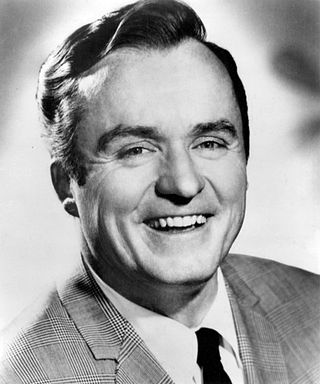
Michael Delaney Dowd Jr., known as Mike Douglas, was an American "Big Band" era singer, entertainer, television talk show host of The Mike Douglas Show, and actor.
Armand Borel, Swiss-American mathematician and academic (b. 1923) deaths

Armand Borel was a Swiss mathematician, born in La Chaux-de-Fonds, and was a permanent professor at the Institute for Advanced Study in Princeton, New Jersey, United States from 1957 to 1993. He worked in algebraic topology, in the theory of Lie groups, and was one of the creators of the contemporary theory of linear algebraic groups.
Herb Brooks, American ice hockey player and coach (b. 1937) deaths

Herbert Paul Brooks Jr. was an American ice hockey player and coach. His most notable achievement came in 1980 as head coach of the gold medal-winning U.S. Olympic team at Lake Placid. At the Games, Brooks' American team upset the heavily favored Soviet team in a match that came to be known as the "Miracle on Ice."
Galen Rowell, American photographer and mountaineer (b. 1940) deaths
Galen Avery Rowell was a wilderness photographer, adventure photojournalist and mountaineer. Born in Oakland, California, he became a full-time photographer in 1972.
Moyuka Uchijima, Japanese tennis player births

Moyuka Uchijima is a Japanese tennis player.
Percy Stallard, English cyclist and coach (b. 1909) deaths
Percy Thornley Stallard was an English racing cyclist who reintroduced massed-start road racing on British roads in the 1940s.
Jean Papineau-Couture, Canadian composer and academic (b. 1916) deaths

Jean Papineau-Couture, was a Canadian composer and academic.
Sarah Clelland, Scottish footballer births
Sarah Isabel Clelland is a Scottish football who plays for Spartans in the Scottish Women's Premier League (SWPL) as a full back. She has also played international handball for Scotland and Great Britain.
Rafael Kubelík, Czech conductor and composer (b. 1914) deaths
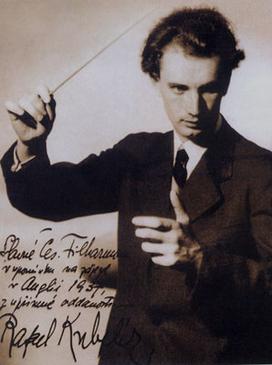
Rafael Jeroným Kubelík, KBE was a Czech conductor and composer.
Ambrosio Padilla, Filipino basketball player and politician (b. 1910) deaths

Ambrosio Bibby Padilla was a Filipino basketball player and an elected member of the Senate of the Philippines. He was one of the most important figures in Asian basketball development.
Phil Harris, American singer-songwriter and actor (b. 1904) deaths

Wonga Philip Harris was an American actor, comedian, musician and songwriter. He was an orchestra leader and a pioneer in radio situation comedy, first with The Jack Benny Program, then in The Phil Harris-Alice Faye Show in which he co-starred with his wife, singer-actress Alice Faye, for eight years. Harris is also noted for his voice acting in animated films. As a voice actor, he played Baloo in The Jungle Book (1967), Thomas O'Malley in The Aristocats (1970), Little John in Robin Hood (1973), and Patou in Rock-a-Doodle (1991). As a singer, he recorded a #1 novelty hit record, "The Thing" (1950).
Storm Sanders, Australian tennis player births

Storm Hunter is an Australian professional tennis player. She reached a career-high singles ranking of world No. 119, on 18 October 2021, and a career-high doubles ranking of world No. 8, on 24 October 2022.
Anton Cooper, New Zealand cross-country cyclist births

Anton Cooper is a New Zealand cross-country cyclist who races for the Trek Factory Racing XC Team. He is the 2015 World Under 23 Cross-country Mountain bike champion and the 2012 World Junior Cross-country Mountain bike champion. One of the two contenders for the country's 2016 Summer Olympics quota spot, he developed chronic fatigue earlier in 2016 and the nomination went to Sam Gaze instead. Cooper represented New Zealand at the 2020 Summer Olympics in Tokyo, finishing sixth in the Men's Cross-country Mountain Bike final.
Joseph Barbato, French footballer births
Joseph Barbato is a French professional footballer who plays as a forward for Furiani.
Song I-han, South Korean singer births

Song Byeong-hwa, known professionally as Song I-han (송이한), is a South Korean singer-songwriter. He competed in the blind audition program Blind Musician in 2018 and won the competition, immediately releasing his debut single "Reason". At the end of 2020, he released a special single entitled "I Will Be Your Shining Star" amidst the global COVID-19 pandemic. The ballad rose in prominence and was nicknamed "wedding song icon" upon the launch of a contest in which three soon-to-be-married couples would be selected for a free performance by Song at their wedding. Song received two award nominations at the 36th Golden Disc Awards.
Peter Cushing, English actor (b. 1913) deaths
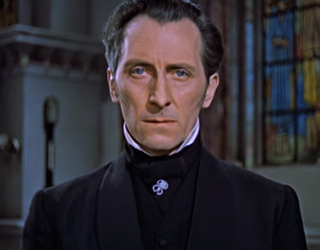
Peter Wilton Cushing was an English actor. His acting career spanned over six decades and included appearances in more than 100 films, as well as many television, stage, and radio roles. He achieved recognition in his home country for his leading performances in the Hammer Productions horror films from the 1950s to 1970s, while earning international prominence as Grand Moff Tarkin in Star Wars (1977).
Tomi Lahren, American conservative political commentator births

Tomi Rae Augustus Lahren is an American conservative political commentator and television presenter. She hosted Tomi on TheBlaze, where she gained attention for her short video segments called "final thoughts", in which she frequently criticized liberal politics. Many of her videos went viral, with The New York Times describing her as a "rising media star". Lahren was suspended from TheBlaze in March 2017 after saying in an interview on The View that she believed women should have legal access to abortion.
Cristian Tello, Spanish footballer births

Cristian Tello Herrera is a Spanish professional footballer who plays as a forward or winger for Los Angeles FC in Major League Soccer.
J. D. McDuffie, American race car driver (b. 1938) deaths

John Delphus McDuffie Jr. was an American racing driver. He competed in the NASCAR Winston Cup Series from 1963 to 1991, collecting 106 top-10 finishes during his career, despite never finishing on the lead lap of any race in his career, and holding the record for the most starts in NASCAR's top level without a win with 653. He died in a racing accident during the Budweiser at The Glen at Watkins Glen International in 1991.
Lenka Juríková, Slovak tennis player births
Lenka Juríková is a Slovak tennis player.
Junior Heffernan, Irish cyclist and triathlete (d. 2013) births
Junior Heffernan was an Irish triathlete and then cyclist who at the end of his life was competing mostly in Great Britain. He attended Kelly College on the outskirts of Tavistock, Devon, where he competed under coach Rich Brady.
Sebastian Huke, German footballer births
Sebastian Huke is a German footballer who currently plays for Tennis Borussia Berlin.
John Meillon, Australian actor (b. 1934) deaths

John Meillon,, was an Australian character actor, known for many straight as well as comedy roles, he became most widely known internationally as Walter Reilly in the films Crocodile Dundee and Crocodile Dundee II. He also voiced advertisements for Victoria Bitter beer. He appeared in several Australian New Wave films including Wake in Fright and The Cars That Ate Paris.
Rabeh Al-Hussaini, Filipino basketball player births
Rabeh Ahmed T. Al-Hussaini is a Filipino professional basketball player who last played for the Blackwater Elite of the PBA. A power forward/center, he played five seasons for the Ateneo de Manila Blue Eagles in the University Athletic Association of the Philippines from 2005 to 2009 and led the Eagles to back-to-back basketball championships in his last two seasons with them. He averaged 24.6 point per game, 13 rebounds per game, and 2 assists per game.
Patty Mills, Australian basketball player births

Patrick Sammy Mills is an Australian professional basketball player for the Brooklyn Nets of the National Basketball Association (NBA).
Mustafa Pektemek, Turkish footballer births

Mustafa Pektemek is a Turkish footballer who plays as a striker for Kayserispor.
Anne Ramsey, American actress (b. 1929) deaths

Angelina Anne Ramsey-Mobley was an American actress. She is best known for her film roles as Mama Fratelli in The Goonies (1985) and as Mrs. Lift in Throw Momma from the Train (1987), the latter of which earned her nominations for an Academy Award and a Golden Globe Award.
Dany N'Guessan, French footballer births

Djombo Dany-Gael N'Guessan is a French former professional footballer who played as a left winger or forward
Drew Storen, American baseball player births

Drew Patrick Storen is an American former professional baseball relief pitcher. He played in Major League Baseball (MLB) for the Washington Nationals, Toronto Blue Jays, Seattle Mariners, and Cincinnati Reds.
Mokhtar Benmoussa, Algerian footballer births

Mokhtar Benmoussa is an Algerian footballer. He plays primarily as a left-winger but has also been used as a left-midfielder and a left-back. Benmoussa is an Algeria youth international and has represented Algeria at the Under-17 and Under-23 level. He also has 1 cap for the Algeria A' national football team.
Pablo Sandoval, Venezuelan baseball player births

Pablo Emilio Sandoval Reyes is a Venezuelan-American professional baseball third baseman for the Olmecas de Tabasco of the Mexican League. He previously played in Major League Baseball (MLB) for the San Francisco Giants, Boston Red Sox, and Atlanta Braves. He stands 5 feet 10 inches (1.78 m) tall, and weighs 268 pounds (122 kg). Nicknamed "Kung Fu Panda", Sandoval is a two-time All-Star and has won three World Series championships with the Giants. He hit three home runs in Game 1 of the 2012 World Series, becoming the fourth player to hit three home runs in a World Series game, leading to his being named that year's World Series Most Valuable Player (MVP). During the offseason, Sandoval plays for the Navegantes del Magallanes of the Venezuelan Professional Baseball League (VPBL).
János Drapál, Hungarian motorcycle racer (b. 1948) deaths

János Drapál was a Grand Prix motorcycle road racer from Budapest. He had little chance to race in the Grand Prix world championships during the Cold War, but still won four Grand Prix races. Drapál had his best year in 1971 when he won the Yugoslavian Grand Prix and finished the year in seventh place in the 350cc world championship, riding a Yamaha. In 1973 he won two Grand Prix races but slipped to ninth place in the 350cc world championship. Drapál was killed in 1985 after a collision with a Czech track marshal during a 250cc race at the Piešťany airfield circuit in Czechoslovakia.
Jacqueline Fernandez, Bahraini–Sri Lankan actress births

Jacqueline Fernandez is a Sri Lankan actress and model. She has worked in Indian films, predominantly in Hindi, besides appearing in reality shows and music videos. Debuting with Aladin in 2009 she has since then established a career in the Hindi film industry. Fernandez was born and raised in Bahrain to a multiracial Eurasian family of Sri Lankan, Canadian, and Malaysian descent. After graduating in mass communication from the University of Sydney and working as a television reporter in Sri Lanka, she joined the modeling industry. She was crowned Miss Universe Sri Lanka in 2006, and represented her country at Miss Universe 2006.
Mojtaba Abedini, Iranian Olympic fencer births

Mojtaba Abedini Shourmasti is an Iranian 3-time Olympian sabre fencer. In 2012, he became the first Iranian fencer to compete in the Olympics. He won a bronze medal at the 2019 World Fencing Championships, becoming the first-ever Iranian fencer to win a medal at the World Fencing Championships.
Melky Cabrera, Dominican baseball player births

Melky Cabrera Astacio, nicknamed The Melkman, is a Dominican former professional baseball outfielder. He played in Major League Baseball (MLB) for the New York Yankees, Atlanta Braves, San Francisco Giants, Toronto Blue Jays, Chicago White Sox, Kansas City Royals, Cleveland Indians, and Pittsburgh Pirates. While primarily a left fielder throughout his career, Cabrera spent a significant amount of his playing time as a center fielder for the Royals and Yankees.
Lucas di Grassi, Brazilian race car driver births
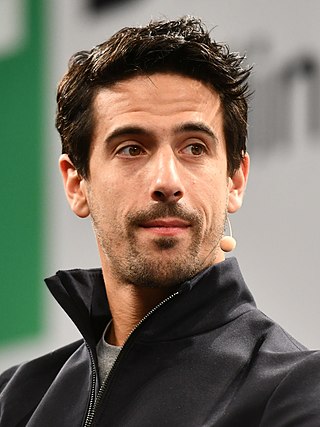
Lucas Tucci di Grassi is a Brazilian professional racing driver who competes in the all-electric FIA Formula E Championship for Mahindra Racing. He became the FIA Formula E Champion in 2016–2017, also achieved 3 overall podiums and best result ever for a Brazilian driver at Le Mans 24h, including a FIA WEC Vice World Championship in 2016, competed in FIA Formula 1 in 2010, Vice-Champion in FIA Formula 2 and World Champion of FIA Formula 3 at the Macau GP in 2005.
Alfred A. Knopf Sr., American publisher, founded Alfred A. Knopf, Inc. (b. 1892) deaths
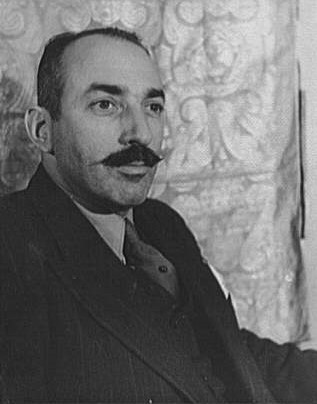
Alfred Abraham Knopf Sr. was an American publisher of the 20th century, and co-founder of Alfred A. Knopf, Inc. His contemporaries included the likes of Bennett Cerf and Donald Klopfer, and Frank Nelson Doubleday, J. Henry Harper and Henry Holt. Knopf paid special attention to the quality of printing, binding, and design in his books, and earned a reputation as a purist in both content and presentation.

Alfred A. Knopf, Inc. is an American publishing house that was founded by Alfred A. Knopf Sr. and Blanche Knopf in 1915. Blanche and Alfred traveled abroad regularly and were known for publishing European, Asian, and Latin American writers in addition to leading American literary trends. It was acquired by Random House in 1960, and is now part of the Knopf Doubleday Publishing Group division of Penguin Random House which is owned by the German conglomerate Bertelsmann. The Knopf publishing house is associated with its borzoi colophon, which was designed by co-founder Blanche Knopf in 1925.
Paul Felix Schmidt, Estonian–American chemist and chess player (b. 1916) deaths
Paul Felix Schmidt was an Estonian and German chess player, writer and chemist.
Chris Hemsworth, Australian actor births

Christopher Hemsworth is an Australian actor. He rose to prominence playing Kim Hyde in the Australian television series Home and Away (2004–2007) before beginning a film career in Hollywood. In the Marvel Cinematic Universe (MCU), Hemsworth started playing Thor with the 2011 film of the same name and most recently reprised the role in Thor: Love and Thunder (2022), which established him among the world's highest-paid actors.
Luke Lewis, Australian rugby league player births

Luke Lewis is an Australian rugby league commentator and former professional rugby league footballer who played for the Cronulla-Sutherland Sharks and the Penrith Panthers in the National Rugby League (NRL) and Australia at international level.
Pavel 183, Russian painter (d. 2013) births
Pavel 183, was a Russian street artist, known by some as the "Russian Banksy".
Tom Drake, American actor and singer (b. 1918) deaths

Tom Drake was an American actor. Drake made films starting in 1940 and continuing until the mid-1970s, and also made TV acting appearances.
Daniel Poohl, Swedish journalist births

Daniel Poohl, is a Swedish editor-in-chief for the Expo magazine. He started working at Expo at the age of twenty in 2001. Poohl became the editorial assistant after the death of Stieg Larsson in 2004 and became the editor-in-chief in 2006. Poohl grew up in Åsensbruk in Dalsland and studied media at Sinclairgymnasiet in Uddevalla. During his time at the national guard training he did journalism work for Värnpliktsnytt, a newspaper for the soldiers. Poohl became a known name in 2001 when he infiltrated the Nationaldemokraterna party to make a report that was broadcast on the show Folkhemmet on TV3.
Daniel Lloyd, English cyclist and sportscaster births
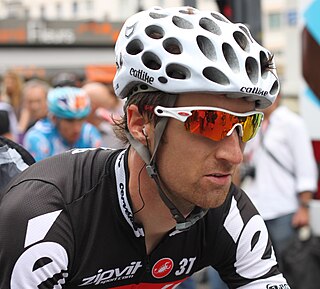
Daniel Lloyd is a retired English professional road racing cyclist and current commentator and presenter from Christchurch, Dorset.
Lee Suggs, American football player births
Lee Ernest Suggs, Jr. is a former American football coach and former player. He played college football as a running back at Virginia Tech and professionaly for the Cleveland Browns and Miami Dolphins in the National Football League (NFL).
Paul Robert, French lexicographer and publisher (b. 1910) deaths
Paul Charles Jules Robert, usually called Paul Robert, was a French lexicographer and publisher, best known for his large Dictionnaire alphabétique et analogique de la langue française (1953), often called simply the Robert, and its abridgement, the Petit Robert ; who founded the dictionary company Dictionnaires Le Robert.
Walter Ayoví, Ecuadorian footballer births

Walter Orlando Ayoví Corozo is an Ecuadorian professional footballer who plays for the Monterrey Flash in the Major Arena Soccer League. He previously played as a left winger for Club Deportivo El Nacional in the Ecuadorian league and in the Ecuadorian national team, primarily in left defense. He is the cousin of fellow footballer Jaime Ayoví, who also plays in the Ecuadorian national team. He also holds Mexican citizenship.
J. G. Farrell, English author (b. 1935) deaths

James Gordon Farrell was an English-born novelist of Irish descent. He gained prominence for a series of novels known as "the Empire Trilogy", which deal with the political and human consequences of British colonial rule.
Spyros Gogolos, Greek footballer births
Spyros Gogolos is a retired Greek footballer, who played as a defender.
Charlotte Leslie, British politician births
Charlotte Leslie is a British Conservative Party politician who is the current Director of the Conservative Middle East Council. She was the Member of Parliament (MP) for the Bristol North West constituency, losing her seat at the 2017 general election.
Lillian Nakate, Ugandan politician births
Lillian Nakate Segujja commonly Lillian Nakate, is a Ugandan civil engineer and politician who serves as the Member of Parliament representing the Luweero District Women' Constituency in the 10th Parliament.
Isy Suttie, English comedian, musician, actress, and writer births

Isobel Jane "Isy" Suttie is a British musical comedian, actress, and writer. She played Dobby in the British sitcom Peep Show, and in 2013 won the gold Sony Radio Academy Award for her radio show Pearl And Dave. She also provides narration on the UK television show, Posh Pawn.
Berta Ruck, Indian-born Welsh romance novelist (b. 1878) deaths
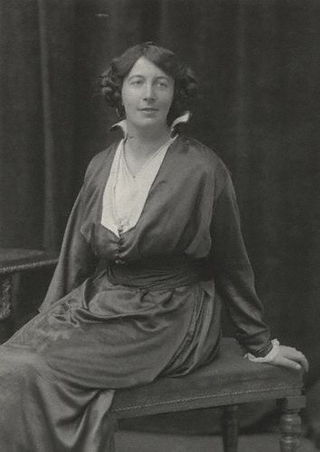
Amy Roberta (Berta) Ruck, born in India, was a prolific Welsh writer of over 90 romance novels from 1905 to 1972. She also wrote short stories, an autobiography and two books of memoirs. Her married name was Mrs Oliver Onions from 1909 until 1918, when her husband changed his name and she became Amy Oliver.
Gemma Hayes, Irish singer-songwriter births

Gemma Hayes is an Irish musician, singer-songwriter and composer. Primarily known as a vocalist and guitarist, she is also proficient with a wide range of instruments, including the piano and the harmonica. She is also a member of The Cake Sale and Printer Clips.
Dênio Martins, Brazilian footballer births
Dênio Pereira Martins, known as just Dênio, is a Brazilian footballer who plays for Cerâmica.
Frederic Calland Williams, British co-inventor of the Williams-Kilborn tube, used for memory in early computer systems (b. 1911) deaths
Sir Frederic Calland Williams,, known as F.C. Williams or Freddie Williams, was an English engineer, a pioneer in radar and computer technology.
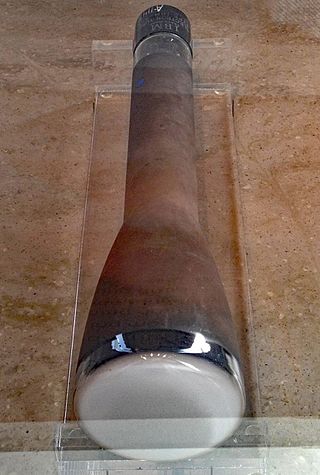
The Williams tube, or the Williams–Kilburn tube named after inventors Freddie Williams and Tom Kilburn, is an early form of computer memory. It was the first random-access digital storage device, and was used successfully in several early computers.
Iván Córdoba, Colombian footballer and manager births

Iván Ramiro Córdoba Sepúlveda is a retired Colombian footballer, who played as a defender. He began his career in Colombia with Deportivo Rionegro and Atlético Nacional, before moving to Argentine club San Lorenzo. In 2000, he joined Italian side Internazionale, where he spent most of his career, remaining with the club until his retirement in 2012. At international level, Córdoba played for the Colombia national team, and represented his nation at the 1998 FIFA World Cup, the 2003 FIFA Confederations Cup, and four editions of the Copa América, winning the tournament in 2001, where he scored the winning goal in the final. He was the vice-captain of Internazionale and has also served as captain for his country's national team.
Bubba Crosby, American baseball player births
Richard Stephen "Bubba" Crosby is a former Major League Baseball outfielder who played with the Los Angeles Dodgers and the New York Yankees. He is best known for his tenure as a backup outfielder for the Yankees, when his defense and running games were often put to use and he played a prominent starting role near the end of the 2005 season.
Will Friedle, American actor and screenwriter births
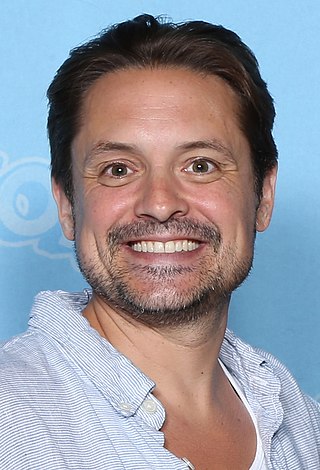
Will Friedle is an American actor and writer. He is best known for his role as Eric Matthews on the ABC sitcom Boy Meets World (1993–2000). In animation, he voices Terry McGinnis / Batman on Batman Beyond (1999–2001), Ron Stoppable on Kim Possible (2002–07), Doyle Blackwell on The Secret Saturdays (2008), Blue Beetle on Batman: The Brave and the Bold (2008–11), Lion-O on ThunderCats (2011–12), Bumblebee in the Transformers franchise and Star-Lord on Guardians of the Galaxy (2015–19).
Ben Gibbard, American singer-songwriter and guitarist births

Benjamin Gibbard is an American singer, songwriter and guitarist. He is best known as the lead vocalist and guitarist of the indie rock band Death Cab for Cutie, with whom he has recorded ten studio albums, and as a member of the indie pop band The Postal Service. Gibbard released his debut solo album, Former Lives, in 2012, and a collaborative studio album, One Fast Move or I'm Gone (2009) with Jay Farrar.
Ľubomír Višňovský, Slovak ice hockey player births

Ľubomír Višňovský is a Slovak former professional ice hockey defenceman. He began and finished his career with his hometown club, HC Slovan Bratislava. He played 14 seasons in the National Hockey League (NHL) with the Los Angeles Kings, Edmonton Oilers, Anaheim Ducks and the New York Islanders.
Chris Cummings, Canadian singer-songwriter births
Christopher Allen Thomas Cummings is a Canadian country music artist. In his career, he has released five studio albums, one compilation album, and one extended play. Several of his singles have charted on the Canadian country charts, including the Number One hits "Sure Enough" and "The Kind of Heart That Breaks".
Marie-France Dubreuil, Canadian figure skater births

Marie-France Dubreuil is a Canadian ice dancing coach and former competitor. With her husband Patrice Lauzon, she is a two-time (2006–2007) World silver medallist.
Hadiqa Kiani, Pakistani singer, songwriter and philanthropist births

Hadiqa Kiani TI(c) is a Pakistani singer, Songwriter, Guitarist, composer, actress, and philanthropist. She has received numerous local and international awards and also has performed at the Royal Albert Hall and The Kennedy Center. Besides Urdu and Punjabi, she has also sung several songs in the Pashto language.
Audrey Mestre, French biologist and diver (d. 2002) births
Audrey Mestre was a French world record-setting freediver.
Carolyn Murphy, American model and actress births

Carolyn Murphy is an American model and actress.
Vicente Emilio Sojo, Venezuelan conductor and composer (b. 1887) deaths

Vicente Emilio Sojo was a Venezuelan musicologist, educator and composer, born in Guatire, Miranda.
Kristin Armstrong, American cyclist births
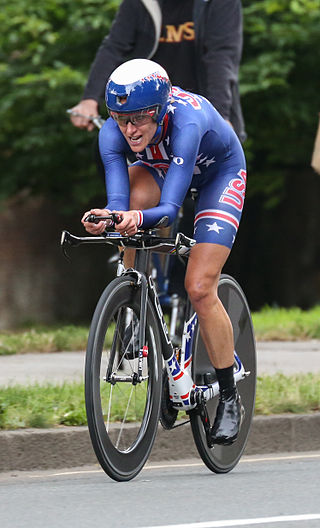
Kristin Armstrong Savola is a former professional road bicycle racer and three-time Olympic gold medalist, the winner of the women's individual time trial in 2008, 2012, and 2016. Before temporarily retiring to start a family in 2009, she rode for Cervélo TestTeam in women's elite professional events on the National Racing Calendar (NRC) and UCI Women's World Cup. She announced a return to competitive cycling beginning in the 2011 season, competing for Peanut Butter & Co. TWENTY12 at the Redlands Classic.
Max Theiler, South African-American virologist and academic, Nobel Prize laureate (b. 1899) deaths

Max Theiler was a South African-American virologist and physician. He was awarded the Nobel Prize in Physiology or Medicine in 1951 for developing a vaccine against yellow fever in 1937, becoming the first African-born Nobel laureate.

The Nobel Prize in Physiology or Medicine is awarded yearly by the Nobel Assembly at the Karolinska Institute for outstanding discoveries in physiology or medicine. The Nobel Prize is not a single prize, but five separate prizes that, according to Alfred Nobel's 1895 will, are awarded "to those who, during the preceding year, have conferred the greatest benefit to humankind". Nobel Prizes are awarded in the fields of Physics, Chemistry, Physiology or Medicine, Literature, and Peace.
Alejandra Barros, Mexican actress and screenwriter births

Alejandra Barros is a Mexican actress. She is best known for her role in Televisa's telenovela Mariana de la Noche (2003).
Tommy Mooney, English footballer births

Thomas John Mooney is an English former professional footballer who played mainly as a striker. He made more than 600 appearances in the Football League and Premier League – with 250 for Watford and more than 100 for Scarborough – and scored in each of the top four divisions of the English football league system.
Dirk Hannemann, German footballer and manager births
Dirk Hannemann is a German former professional footballer who played as a midfielder. He made 11 appearances in the Austrian Bundesliga and 12 appearances in the 2. Bundesliga during his playing career.
Gianluca Pessotto, Italian footballer births
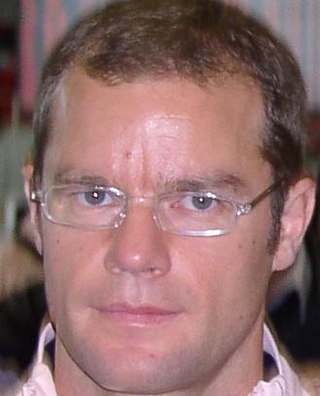
Gianluca Pessotto is an Italian former professional footballer who played as a defender or midfielder. A former Italy international, he spent the majority of his club career with Juventus, where he won several domestic and international trophies, and is now head of its youth system. He represented his country at the 1998 FIFA World Cup, and at UEFA Euro 2000, reaching the final of the latter tournament.
Miriam Licette, English soprano and educator (b. 1885) deaths

Miriam Licette was an English operatic soprano whose career spanned 35 years, from the mid-1910s to after World War II. She was also a singing teacher, and created the Miriam Licette Scholarship.
Anna Gunn, American actress births

Anna Gunn is an American actress. She is best known for her role as Skyler White on the AMC drama series Breaking Bad (2008–2013), for which she won the Primetime Emmy Award for Outstanding Supporting Actress in a Drama Series in 2013 and 2014. She has also played Jean Ward in The Practice (1997–2002), and Martha Bullock in Deadwood (2004–2006).
Sophie Okonedo, British actress births

Sophie Okonedo is a British actress and narrator. The recipient of a Tony Award, she has been nominated for an Academy Award, three BAFTA Television Awards, a Golden Globe Award, and a Primetime Emmy Award. She began her film career in the British coming-of-age drama Young Soul Rebels (1991) before appearing in Ace Ventura: When Nature Calls (1995), and Stephen Frears's Dirty Pretty Things (2002).
Charlie Sexton, American singer-songwriter and guitarist births

Charles Wayne Sexton is an American guitarist, singer and songwriter. Sexton is best known for his years as a guitarist in Bob Dylan's band, though also has become well known as a music producer. Sexton co-founded the Arc Angels and created the Charlie Sexton Sextet. He was still a teenager when he gained fame for his 1985 hit, "Beat's So Lonely", from his debut album, Pictures for Pleasure.
Massimiliano Allegri, Italian footballer and manager births

Massimiliano Allegri, also known as Max Allegri, is an Italian professional football manager and former player who is the manager of Serie A club Juventus.
Enrique Bunbury, Spanish singer-songwriter and guitarist births
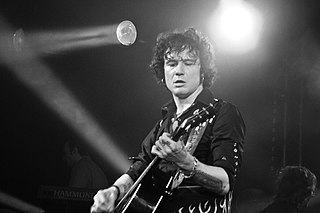
Enrique Ortiz de Landázuri Izarduy, best known as Enrique Bunbury, is a Spanish singer and songwriter. He has been described as "by far the most international star of Spanish rock." He was propelled to fame as lead singer of Héroes del Silencio. After the band disbanded in 1996, Bunbury gradually developed a solo career. His "tessitura" singing style would be in the baritone range.
Joe Rogan, American actor, comedian, and television host births

Joseph James Rogan is an American UFC color commentator, podcaster, comedian, actor, and former television presenter. He hosts The Joe Rogan Experience, a podcast in which he discusses current events, comedy, politics, philosophy, science, and hobbies with a variety of guests.
Petter Wettre, Norwegian saxophonist and composer births

Petter Wettre is a Norwegian Jazz musician (Saxophone) and composer, known from a number of album recordings, accompanied by receiving the Spellemannprisen two times.
Nigel Martyn, English footballer and coach births
Antony Nigel Martyn is an English football coach and former professional footballer who played as a goalkeeper.
Juan María Solare, Argentinian pianist and composer births
Juan María Solare is an Argentine composer and pianist.
Marc Bergevin, Canadian ice hockey player and manager births

Marc Bergevin is a Canadian professional ice hockey executive and former player. He is currently senior advisor to the general manager of the Los Angeles Kings. Bergevin played as a defenceman in the NHL.
Embeth Davidtz, American actress births
Embeth Jean Davidtz is a South African-American actress. Her screen roles include movies such as Army of Darkness, Schindler's List, Matilda, Mansfield Park, Bicentennial Man, Fallen, Junebug, and Fracture, and the television series Mad Men, Californication, In Treatment, and Ray Donovan.
Viola Davis, American actress births

Viola Davis is an American actress and producer. The recipient of various accolades, including an Academy Award, a Primetime Emmy Award, and two Tony Awards, she is the only African-American to achieve the Triple Crown of Acting. She is also tied for the most film wins for an actress at the Screen Actors Guild Awards, and with six overall wins, she is the most awarded African-American. Time magazine named her one of the 100 most influential people in the world in 2012 and 2017, and in 2020, The New York Times ranked her ninth on its list of the greatest actors of the 21st century.
Bill Woodfull, Australian cricketer and educator (b. 1897) deaths

William Maldon Woodfull was an Australian cricketer of the 1920s and 1930s. He captained both Victoria and Australia, and was best known for his dignified and moral conduct during the tumultuous bodyline series in 1932–33. Trained as a schoolteacher, Woodfull was known for his benevolent attitude towards his players, and his patience and defensive technique as an opening batsman. Woodfull was not a flamboyant player, but was known for his calm, unruffled style and his reliability in difficult situations. His opening pairing with fellow Victorian Bill Ponsford for both his state and Australia remains one of the most successful in history. While not known for his tactical skills, Woodfull was widely admired by his players and observers for his sportsmanship and ability to mould a successful and loyal team through the strength of his character.
Jim Lee, South Korean-American author and illustrator births

Jim Lee is a Korean American comic-book artist, writer, editor, and publisher. He is currently the Publisher and Chief Creative Officer of DC Comics. In recognition of his work, Lee has received a Harvey Award, Inkpot Award and three Wizard Fan Awards.
Grant Waite, New Zealand golfer births
Grant Osten Waite is a New Zealand professional golfer.
Hiromi Makihara, Japanese baseball player births

Hiromi Makihara is a former Nippon Professional Baseball pitcher. He was a six-time Central League All-Star, won Rookie of the Year honors, and pitched a perfect game in a 19-year career with the Yomiuri Giants.
Otto Wahle, Austrian-American swimmer and coach (b. 1879) deaths

Otto Wahle was an Austrian-American swimmer who took part in two Summer Olympic Games and won a total of three medals. Wahle coached the men's US swim team at the 1912 Olympics, and the men's US water polo team at the 1920 and 1924 Olympics.
Brian Azzarello, American author births

Brian Azzarello is an American comic book writer and screenwriter who first came to prominence with the hardboiled crime series 100 Bullets, published by DC Comics' mature-audience imprint Vertigo. Azzarello is best known for his numerous collaborations with artists Eduardo Risso and Lee Bermejo, his contributions to the Watchmen prequel project Before Watchmen and The Dark Knight Returns sequel series DK III: The Master Race, as well as for his stints on the long-running Vertigo series Hellblazer and The New 52 relaunch of the Wonder Woman title.
Charles Cecil, English video game designer and co-founded Revolution Software births
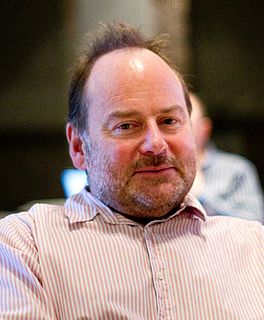
Charles Cecil is a British video game designer and co-founder of Revolution Software. His family lived in the Democratic Republic of the Congo when he was still very young, but was evacuated two years after Mobutu Sese Seko's coup d'état. He studied at Bedales School in Hampshire, England. In 1980 he began his studies in Engineering Manufacture and Management at Manchester University, where he met student Richard Turner who invited him to write text adventures for Artic Computing. After completing his degree in 1985 he decided to continue his career in game development and became director of Artic. The following year he established Paragon Programming, a game development company working with British publisher U.S. Gold. In 1987 he moved into publishing as a software development manager for U.S. Gold. A year later he was approached by Activision and was offered the position of manager of their European development studio.

Revolution Software Limited is a British video game developer based in York, founded in 1989 by Charles Cecil, Tony Warriner, David Sykes, and Noirin Carmody.
John Micklethwait, English journalist and author births
Richard John Micklethwait is editor-in-chief of Bloomberg News, a position he has held since February 2015. A British journalist, he was previously the editor-in-chief of The Economist from 2006 to 2015.
Rob Minkoff, American director and producer births
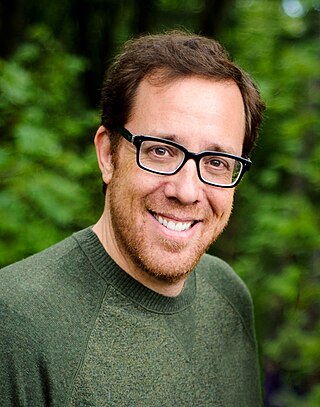
Robert Ralph Minkoff is an American filmmaker. He is best known for co-directing The Lion King, and live-action films including Stuart Little (1999), Stuart Little 2 (2002), The Haunted Mansion (2003), and The Forbidden Kingdom (2008). In recent decades, he returned to feature animation with Mr. Peabody & Sherman (2014) and Paws of Fury: The Legend of Hank (2022). His wife, Crystal Kung Minkoff, is a cast member on The Real Housewives of Beverly Hills.
David Brooks, American journalist and author births

David Brooks is a political and cultural commentator who writes for The New York Times. He has worked as a film critic for The Washington Times, a reporter and later op-ed editor for The Wall Street Journal, a senior editor at The Weekly Standard from its inception, a contributing editor at Newsweek, and The Atlantic Monthly, in addition to working as a commentator on NPR and the PBS NewsHour.
Craig Ehlo, American basketball player and coach births
Joel Craig Ehlo is a retired American basketball player. He played fifteen seasons in the National Basketball Association (NBA) with four teams, amassing career totals of 7,492 points, 2,456 assists and 3,139 rebounds.
Antanas Škėma, Lithuanian-American author, playwright, actor, and director (b. 1910) deaths
Antanas Škėma was a Lithuanian writer, playwright, stage actor and director. His best known work is the novel Balta drobulė.
Gustavo Cerati, Argentinian singer-songwriter, guitarist, and producer (d. 2014) births

Gustavo Adrián Cerati was an Argentine singer-songwriter, composer and producer, considered one of the most important and influential figures of Ibero-American rock. Cerati along with his band Soda Stereo, were one of the most popular and influential rock and pop groups of the 1980s and 1990s.
Yoshiaki Murakami, Japanese businessman births
Yoshiaki Murakami is a Japanese investor, bull, former bureaucrat of the MITI, co-founder of "Murakami Fund", and founder of the Murakami Family Foundation (村上財団).
Taraki Sivaram, Sri Lankan journalist and author (d. 2005) births
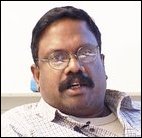
Taraki Sivaram or Dharmeratnam Sivaram was a popular Tamil journalist of Sri Lanka. He was kidnapped by four men in a white van on 28 April 2005, in front of the Bambalapitya police station. His body was found the next day in the district of Himbulala, near the Parliament of Sri Lanka. He had been beaten and shot in the head.
Richard Scudamore, English businessman births
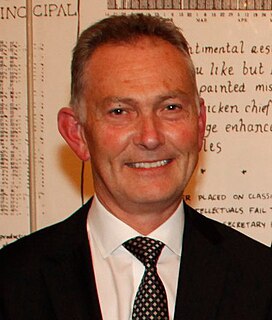
Richard Craig Scudamore CBE is an English sports executive.
László Szlávics, Jr., Hungarian sculptor births

László Szlávics is a Hungarian sculptor and medallic artist. He publishes his works under the names László, ifj. Szlávics or Laszlo Szlavics Jr.László Szlávics jr. has set several new norms in Hungarian medallic art. It was presumably not his express aim, but he was merely following the dictates of his innovative mind to do something new not yet found in the trade. He is heading in this direction, with the sure – and literally tangible – conviction that at the extremes, on the limits of the art form there is still a lot to be searched – and found out.
Steven Pokere, New Zealand rugby player births
Steven Tahurata Pokere is a former New Zealand rugby union player. A second five-eighth and centre, Pokere represented Southland, Auckland and Wellington at a provincial level, and was a member of the New Zealand national side, the All Blacks, from 1981 to 1985. He played 39 matches for the All Blacks including 18 internationals.
Jah Wobble, English singer-songwriter and bass player births

John Joseph Wardle, known by the stage name Jah Wobble, is an English bass guitarist and singer. He became known to a wider audience as the original bass player in Public Image Ltd (PiL) in the late 1970s and early 1980s; he left the band after two albums.
Ian Stuart Donaldson, English singer-songwriter and guitarist (d. 1993) births
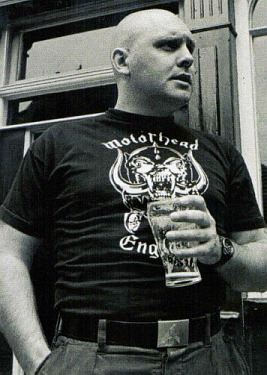
Ian Stuart Donaldson, also known as Ian Stuart, was an English neo-Nazi musician. He was best known as the front-man of Skrewdriver, an Oi! band which, from 1982 onwards, he rebranded as a Rock Against Communism band. He raised money through nationalist concerts with his Blood & Honour network.
Masayoshi Son, Japanese technology entrepreneur and investor births

Masayoshi Son is a Korean-Japanese billionaire technology entrepreneur, investor, financier and philanthropist. A 3rd generation "Zainichi Korean", he naturalized as a Japanese citizen in 1990. He is the founder, chairman and chief executive officer (CEO) of the Japanese holding company SoftBank, CEO of SoftBank Mobile and chairman of UK-based Arm Holdings.
Pierre-Louis Lions, French mathematician and academic births

Pierre-Louis Lions is a French mathematician. He is known for a number of contributions to the fields of partial differential equations and the calculus of variations. He was a recipient of the 1994 Fields Medal and the 1991 Prize of the Philip Morris tobacco and cigarette company.
Jackson Pollock, American painter (b. 1912) deaths
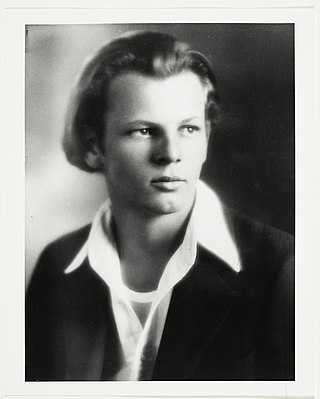
Paul Jackson Pollock was an American painter and a major figure in the abstract expressionist movement. He was widely noticed for his "drip technique" of pouring or splashing liquid household paint onto a horizontal surface, enabling him to view and paint his canvases from all angles. It was called all-over painting and action painting, since he covered the entire canvas and used the force of his whole body to paint, often in a frenetic dancing style. This extreme form of abstraction divided the critics: some praised the immediacy of the creation, while others derided the random effects. In 2016, Pollock's painting titled Number 17A was reported to have fetched US$200 million in a private purchase.
Marc Bureau, Canadian politician, 16th Mayor of Gatineau births
Marc Bureau is a Canadian politician, who was the mayor of the city of Gatineau, Quebec from 2005 to 2013.
This is a list of mayors of Gatineau, Quebec. Note that major amalgamations occurred in 1975 and again in 2002.Théodore Baribeau (1933-1937) Palma Racicot (1937-1939) J. Edouard Charette (1939) Palma Racicot (1939-1945) J. Léo Smith (1945-1956) Eloi Baribeau (1956-1957) Roland Théorêt (1957-1959) Aurèle Graveline (1959-1962) Roland Théorêt (1962-1965) Jacques Poulin (1965-1971) Ludovic Routhier (1971) John-R. Luck (1971-1975) Donald Poirier John-R. Luck (1975-1983) Gaétan Cousineau (1983-1988) Robert Labine (1988-1994) Guy Lacroix (1994-1999) Robert Labine (1999-2001) Yves Ducharme (2002-2005) Marc Bureau (2005-2013) Maxime Pedneaud-Jobin, Action Gatineau (2013–2021) France Bélisle, (2021–present)
Sylvia Hermon, Northern Irish academic and politician births

Sylvia Eileen, Lady Hermon is a retired Unionist politician from Northern Ireland. She served as the Member of Parliament (MP) for the constituency of North Down from 2001 to 2019.
Bryan Bassett, American guitarist births

Bryan Bassett is an American guitarist who has played with several notable bands but is best known as a member of Wild Cherry in the 1970s who had a hit with "Play That Funky Music".
Vance Heafner, American golfer and coach (d. 2012) births
Clayton Vance Heafner Jr. was an American professional golfer who played on the PGA Tour, the Nationwide Tour and the Champions Tour.
Joe Jackson, English singer-songwriter and musician births

David Ian "Joe" Jackson is an English musician, singer and songwriter. Having spent years studying music and playing clubs, he scored a hit with his first release, "Is She Really Going Out with Him?", in 1979. It was followed by a number of new wave singles, before he moved to more jazz-inflected pop music and had a top 10 hit in 1982 with "Steppin' Out". Jackson is associated with the 1980s Second British Invasion of the US. He has also composed classical music. He has recorded 20 studio albums and received five Grammy Award nominations.
Tarmo Rüütli, Estonian footballer, coach, and manager births

Tarmo Rüütli is an Estonian football manager and former football player.
Yashpal Sharma, Indian cricketer and umpire (d. 2021) births
Yashpal Sharma was an Indian international cricketer. He was an explosive middle order batsman who played during the 1970s and 80s. He was a member of the India team that won the 1983 Cricket World Cup. He represented India in 37 Tests and 42 One Day Internationals (ODIs) between 1978 and 1985. His nephew Chetan Sharma was also a cricketer. He was fondly nicknamed the Crisis Man for India.
Hulk Hogan, American wrestler births

Terry Eugene Bollea, better known by his ring name Hulk Hogan, is an American retired professional wrestler. He is widely regarded as the most recognized wrestling star worldwide and the most popular wrestler of the 1980s, as well as one of the greatest professional wrestlers of all time.
Wijda Mazereeuw, Dutch swimmer births

Wijda Mazereeuw is a retired swimmer from the Netherlands. Individually she competed in the 200 m and 400 m medley event at the 1972 Summer Olympics and in the 100 m and 200 m breaststroke at the 1976 Summer Olympics, but was eliminated in the heats on all occasions; in 1976 she also placed fifth with the Dutch 4 × 100 m medley relay team. At the 1975 World Aquatics Championships in Cali, Colombia, she won silver medals in the 100 m (1:14.29) and 200 m (2:37.50) breaststroke; she was also part of the Dutch 4 × 100 m medley relay team that won the bronze medal with a time of 4:21.45.
Tazio Nuvolari, Italian race car driver and motorcycle racer (b. 1892) deaths

Tazio Giorgio Nuvolari was an Italian racing driver. He first raced motorcycles and then concentrated on sports cars and single-seaters. A resident of Mantua, he was known as 'Il Mantovano Volante' and nicknamed 'Nivola'. His victories—72 major races, 150 in all—included 24 Grands Prix, five Coppa Cianos, two Mille Miglias, two Targa Florios, two RAC Tourist Trophies, a Le Mans 24-hour race, and a European Championship in Grand Prix racing. Ferdinand Porsche called him "the greatest driver of the past, the present, and the future."
Reid Blackburn, American photographer (d. 1980) births
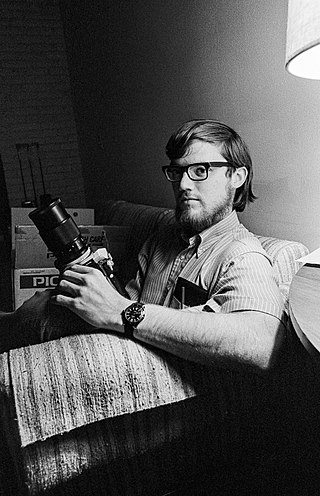
Reid Turner Blackburn was an American photographer killed in the 1980 volcanic eruption of Mount St. Helens. A photojournalist covering the eruption for a local newspaper—the Vancouver, Washington Columbian—as well as National Geographic magazine and the United States Geological Survey, he was caught at Coldwater Camp in the blast.
Bob Mothersbaugh, American singer, guitarist, and producer births

Robert Leroy Mothersbaugh, Jr., or by his stage name "Bob 1", is an American songwriter, composer, musician and singer.
Erik Brann, American singer-songwriter and guitarist (d. 2003) births

Erik Keith Brann, also known as Erik Braunn, was an American guitarist with the 1960s acid rock band Iron Butterfly. He was featured on the band's greatest hit, the 17-minute In-A-Gadda-Da-Vida (1968), recorded when he was 17.
Gennadiy Nikonov, Russian engineer, designed the AN-94 rifle (d. 2003) births
Gennadiy Nikolaevich Nikonov was a Russian gun engineer. His most famous accomplishments were probably as the designer of the AN-94 assault rifle, and the "straight-back bolt." Nikonov held 44 Copyright Certificates, and was awarded the titles of "The Best Designer of the Company" and "The Best Designer of the Ministry." In memory of the outstanding designer, a memorial plaque on the building design and weapons center of "Izhmash" (2003), and at the place of his burial (2007).
The AN-94 is a Russian assault rifle. The initials stand for Avtomat Nikonova model of 1994, after its chief designer Gennadiy Nikonov, who previously worked on the Nikonov machine gun.
Steve Wozniak, American computer scientist and programmer, co-founded Apple Inc. births

Stephen Gary Wozniak, also known by his nickname "Woz", is an American electronics engineer, computer programmer, philanthropist, inventor, and technology entrepreneur. In 1976, with business partner Steve Jobs, he co-founded Apple Computer, which later became the world's largest technology company by revenue and the largest company in the world by market capitalization. Through his work at Apple in the 1970s and 1980s, he is widely recognized as one of the most prominent pioneers of the personal computer revolution.

Apple Inc. is an American multinational technology company headquartered in Cupertino, California, United States. Apple is the largest technology company by revenue and, as of June 2022, is the world's biggest company by market capitalization, the fourth-largest personal computer vendor by unit sales and second-largest mobile phone manufacturer. It is one of the Big Five American information technology companies, alongside Alphabet, Amazon, Meta, and Microsoft.
Eric Carmen, American singer-songwriter and guitarist births

Eric Howard Carmen is an American singer, songwriter, guitarist, and keyboardist. He was first known as the lead vocalist of the Raspberries. He had numerous hit songs in the 1970s and 1980s, first as a member of the Raspberries, and then with his solo career, including hits such as "All by Myself", "Never Gonna Fall in Love Again", "She Did It", "Hungry Eyes", and "Make Me Lose Control".
Tim Hutchinson, American lawyer and politician births
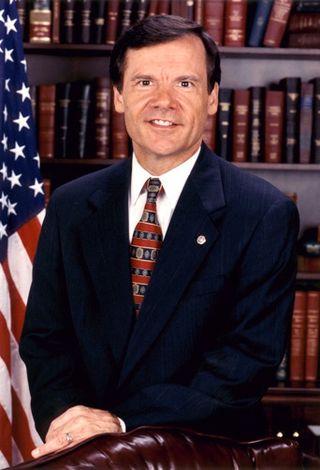
Young Timothy Hutchinson is an American Republican politician, lobbyist, and former United States senator from the state of Arkansas.
Ian Charleson, Scottish-English actor and singer (d. 1990) births

Ian Charleson was a Scottish stage and film actor. He is best known internationally for his starring role as Olympic athlete and missionary Eric Liddell in the Oscar-winning 1981 film Chariots of Fire. He is also well known for his portrayal of Rev. Charlie Andrews in the 1982 Oscar-winning film Gandhi.
Don Boyd, Scottish director, producer, and screenwriter births
Donald William Robertson Boyd is a Scottish film director, producer, screenwriter and novelist. He was a Governor of the London Film School until 2016 and in 2017 was made an Honorary Professor in the College of Humanities at Exeter University.
Theo de Jong, Dutch footballer, coach, and manager births

Theodorus Jacob de Jong is a Dutch former professional footballer and current coach of Nigerian Premier League club Ikorodu United F.C.
Georgios Karatzaferis, Greek journalist and politician births

Georgios Karatzaferis is a Greek politician, a former member of the Hellenic Parliament and the president of the Popular Orthodox Rally. Previously, Karatzaferis was a member of parliament of the liberal-conservative New Democracy party. He is a former Member of the European Parliament and former vice-president of the Independence and Democracy group. His party's views, ideas, and electoral campaigns are often broadcast and promoted by the relatively minor private Greek TV channel TeleAsty, which he founded and owns. The party's ideas are also disseminated in the party's weekly newspaper, A1.
Wilma van den Berg, Dutch sprinter births

Wilhelmina Catharina Maria Martina "Wilma" van Gool is a Dutch former sprinter, two-time Olympian, silver medalist in the European Championships and Universiade, Dutch national champion, and 1969 Dutch Female Athlete of the Year.
John Conlee, American singer-songwriter births

John Wayne Conlee is an American country music singer.
Marilyn vos Savant, American journalist and author births
Marilyn vos Savant is an American magazine columnist who has the highest recorded intelligence quotient (IQ) in the Guinness Book of Records, a competitive category the publication has since retired. Since 1986, she has written "Ask Marilyn", a Parade magazine Sunday column wherein she solves puzzles and answers questions on various subjects, and which popularized the Monty Hall problem in 1990.
Stefan Jaracz, Polish actor and theater producer (b. 1883) deaths

Stefan Jaracz was a Polish actor and theater producer. He served as the artistic director of Ateneum Theatre in Warsaw during the interwar period (1930–32), and within a short period raised its reputation as one of the leading voices for Poland's new intelligentsia, with groundbreaking productions of Danton's Death by Georg Büchner (1931), The Captain of Köpenick by Carl Zuckmayer (1932), as well as popular Ladies and Husars by Aleksander Fredro (1932) and The Open House by Michał Bałucki.
Martin Linton, Swedish-English journalist and politician births

John Martin Linton is a British Labour Party politician, who was the Member of Parliament for Battersea from 1997 to 2010.
Frederick W. Smith, American businessman, founded FedEx births

Frederick Wallace Smith is an American business magnate and investor. He is the founder and chairman of FedEx Corporation, the world's largest transportation company. On June 1, 2022, Smith stepped down as CEO to become executive chairman, and was replaced by Raj Subramaniam. He is considered one of the most successful transportation entrepreneurs in the world.

FedEx Corporation, formerly Federal Express Corporation and later FDX Corporation, is an American multinational conglomerate holding company focused on transportation, e-commerce and business services based in Memphis, Tennessee. The name "FedEx" is a syllabic abbreviation of the name of the company's original air division, Federal Express, which was used from 1973 until 2000. FedEx today is best known for its air delivery service, FedEx Express, which was one of the first major shipping companies to offer overnight delivery as a flagship service. Since then, FedEx also started FedEx Ground, FedEx Office, FedEx Supply Chain, FedEx Freight, and various other services across multiple subsidiaries, often meant to respond to its main competitor, UPS. FedEx is also one of the top contractors of the US government and assists in the transport of some United States Postal Service packages through their Air Cargo Network contract.
Ian McDiarmid, Scottish actor births

Ian McDiarmid is a Scottish actor and director of stage and screen, best known for portraying the Sith Lord Emperor Sheev Palpatine / Darth Sidious in the Star Wars multimedia franchise. Making his stage debut in Hamlet in 1972, McDiarmid joined the Royal Shakespeare Company in 1974, and has since starred in a number of Shakespeare's plays. He has received an Olivier Award for Best Actor and a Tony Award for Best Featured Actor in a Play for his stage performances.
Jim Kale, Canadian bass player births

Michael James Kale is a Canadian retired musician, best known as the original bassist for The Guess Who. He also served in the band Scrubbaloe Caine. In 1987, he was inducted into the Canadian Music Hall of Fame as a member of The Guess Who.
Pervez Musharraf, Pakistani general and politician, 10th President of Pakistan births

General Pervez Musharraf NI(M) HI(M) TBt is a former Pakistani politician and four-star general of the Pakistan Army who became the tenth president of Pakistan after the successful military takeover of the federal government in 1999. He also served as the 10th Chairman Joint Chiefs of Staff Committee from 1998 to 2001 and the 7th Chief of Army Staff from 1998 to 2007.

The president of Pakistan, officially the President of the Islamic Republic of Pakistan, is the ceremonial head of state of Pakistan and the commander-in-chief of the Pakistan Armed Forces.
Denis Payton, English saxophonist (d. 2006) births

Denis Archibald West Payton was an English musician who played tenor saxophone, baritone saxophone, guitar and harmonica in the rock and roll band the Dave Clark Five.
Mike Hugg, English drummer and keyboard player births
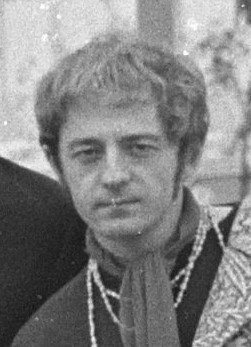
Michael John Hugg is a British musician who achieved fame as a founding member of the 1960s group Manfred Mann.
John Ellison, American-Canadian musician and songwriter births

John Ellison is an American/Canadian musician, best known for writing the song "Some Kind of Wonderful." He was born in Montgomery, West Virginia, and was raised in Landgraff, West Virginia, a small, poverty-stricken coal mining village near Welch, West Virginia, and is a dual citizen of the United States and Canada, receiving his Canadian citizenship in 2006.
Glenys Page, New Zealand cricketer (d. 2012) births
Glenys Lynne Page was a New Zealand cricketer who played as a slow left-arm orthodox bowler. She appeared in two One Day Internationals for New Zealand, both at the 1973 World Cup. She played domestic cricket for Auckland.
James Mancham, first President of Seychelles (d. 2017) births
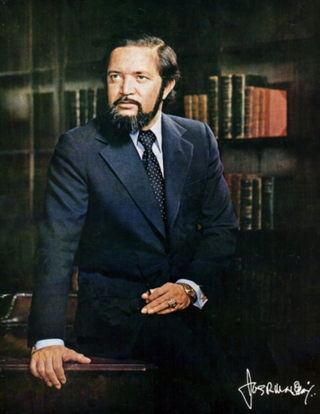
Sir James Richard Marie Mancham KBE was a Seychellois politician who founded the Seychelles Democratic Party and was the first President of Seychelles from 1976 to 1977.

This article contains a list of presidents of the Republic of Seychelles.
Ronnie Dawson, American singer and guitarist (d. 2003) births

Ronald Monroe Dawson was an American rockabilly singer, guitarist and drummer, nicknamed The Blond Bomber. Although he achieved regional success in the 1950s, his popularity peaked internationally with tours in the 1980s and 1990s.
Jean Bugatti, German-Italian engineer (b. 1909) deaths

Jean Bugatti was an automotive designer and test engineer for Bugatti. He was the son of Bugatti's founder Ettore Bugatti.
Siegfried Flesch, Austrian fencer (b. 1872) deaths

Siegfried Friedrich "Fritz" Flesch was an Austrian sabre fencer who competed during the late 19th century and early 20th century.
Anna Massey, English actress (d. 2011) births

Anna Raymond Massey was an English actress. She won a BAFTA Award for the role of Edith Hope in the 1986 TV adaptation of Anita Brookner's novel Hotel du Lac, a role that one of her co-stars, Julia McKenzie, has said "could have been written for her". Massey is best known for her role as Babs Milligan in Alfred Hitchcock's 1972 film, Frenzy.
Patrick Joseph McGovern, American businessman, founded International Data Group (d. 2014) births

Patrick Joseph McGovern Jr. was an American businessman, and chairman and founder of International Data Group (IDG), a company with subsidiaries in technology publishing, research, event management and venture capital.

International Data Group is a market intelligence and demand generation company focused on the technology industry. IDG, Inc.’s mission is centered around supporting the technology industry through research, data, marketing technology, and insights that help create and sustain relationships between businesses.
Edith Wharton, American novelist and short story writer (b. 1862) deaths

Edith Wharton was an American novelist, short story writer, and interior designer. Wharton drew upon her insider's knowledge of the upper-class New York "aristocracy" to realistically portray the lives and morals of the Gilded Age. In 1921, she became the first woman to win the Pulitzer Prize in Literature, for her novel The Age of Innocence. She was inducted into the National Women's Hall of Fame in 1996. Among her other well known works are The House of Mirth and the novella Ethan Frome.
Andre Dubus, American short story writer, essayist, and memoirist (d. 1999) births

Andre Jules Dubus II was an American short story writer and essayist.
Bill Monbouquette, American baseball player and coach (d. 2015) births

William Charles Monbouquette was an American professional baseball player and coach. He played in Major League Baseball (MLB) as a right-handed pitcher for the Boston Red Sox (1958–65), Detroit Tigers (1966–67), New York Yankees (1967–68), and the San Francisco Giants (1968). A four-time All-Star player, Monbouquette was notable for pitching a no-hitter in 1962 as a member of the Red Sox. He was inducted into the Boston Red Sox Hall of Fame in 2000.
Jonathan Spence, English-American historian and academic (d. 2021) births
Jonathan Dermot Spence was an English-born American historian, sinologist, and writer who specialized in Chinese history. He was Sterling Professor of History at Yale University from 1993 to 2008. His most widely read book is The Search for Modern China, a survey of the last several hundred years of Chinese history based on his popular course at Yale. A prolific author, reviewer, and essayist, he published more than a dozen books on China. Spence's major interest was modern China, especially the Qing dynasty, and relations between China and the West. Spence frequently used biographies to examine cultural and political history. Another common theme is the efforts of both Westerners and Chinese "to change China", and how such efforts were frustrated.
Blas Infante, Spanish historian and politician (b. 1885) deaths

Blas Infante Pérez de Vargas was a Spanish Andalusist politician, Georgist, writer, historian and musicologist, known as the father of Andalusian nationalism (Padre de la Patria Andaluza).
Bob Hepple, South African lawyer and academic (d. 2015) births
Sir Bob Alexander Hepple was a South African-born legal academic and leader in the fields of labour law, equality and human rights.
Jerry Falwell, American minister and television host (d. 2007) births
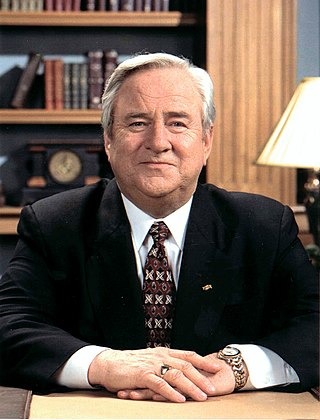
Jerry Laymon Falwell Sr. was an American Baptist pastor, televangelist, and conservative activist. He was the founding pastor of the Thomas Road Baptist Church, a megachurch in Lynchburg, Virginia. He founded Lynchburg Christian Academy in 1967, founded Liberty University in 1971, and co-founded the Moral Majority in 1979.
Jerzy Grotowski, Polish director and producer (d. 1999) births

Jerzy Marian Grotowski was a Polish theatre director and theorist whose innovative approaches to acting, training and theatrical production have significantly influenced theatre today.
Tamás Vásáry, Hungarian pianist and conductor births

Tamás Vásáry is a Hungarian concert pianist and conductor.
Fernando Arrabal, Spanish actor, director, and playwright births

Fernando Arrabal Terán is a Spanish playwright, screenwriter, film director, novelist, and poet. He was born in Melilla and settled in France in 1955. Regarding his nationality, Arrabal describes himself as "desterrado", or "half-expatriate, half-exiled".
Izzy Asper, Canadian lawyer, businessman, and politician, founded Canwest (d. 2003) births
Israel Harold "Izzy" Asper was a Canadian tax lawyer and media magnate. He was the founder and owner of the now-defunct TV and media company CanWest Global Communications Corp and father to its former CEO and President Leonard Asper, former director and corporate secretary Gail Asper, as well as former Executive Vice President David Asper. He was also the leader of the Manitoba Liberal Party from 1970 to 1975 and is credited with the idea and vision to establish the Canadian Museum for Human Rights.
Canwest Global Communications Corporation, which operated under the corporate name Canwest, was a major Canadian media conglomerate based in Winnipeg, Manitoba, with its head offices at Canwest Place. It held radio, television broadcasting and publishing assets in several countries, primarily in Canada.
Geoffrey Cass, English businessman births
Sir Geoffrey Arthur Cass MA (Oxford), MA (Cambridge), CCMI, HonFInstD. Chairman of the Royal Theatrical Support Trust. Spent twenty years as Chief Executive of Cambridge University Press and has also been Chairman of the Royal Shakespeare Company and President of the Lawn Tennis Association.
Peter Eisenman, American architect, designed the City of Culture of Galicia births

Peter Eisenman is an American architect. Considered one of the New York Five, Eisenman is known for his writing and speaking about architecture as well as his designs, which have been called high modernist or deconstructive.

The City of Culture of Galicia is a complex of cultural buildings in Santiago de Compostela, Province of A Coruña, Galicia, Spain, designed by a group of architects led by Peter Eisenman. Construction was challenging and expensive as the design of the buildings involves high degree contours, meant to make the buildings look like rolling hills. Nearly every window of the thousands that are part of the external façade has its own custom shape. In 2013 it was announced that after more than a decade, construction of the project would be halted. The International Art Center and Music and Scenic Arts Center will not be built.
John Gorrie, English director and screenwriter births
John Gorrie is an English director and screenwriter. He began his career as an actor, but in early 1963 he completed the BBC's directors' course. His first assignments as a director were for the soap opera Compact and the anthology series Suspense. He directed the Doctor Who serial The Keys of Marinus.
Raymond Leppard, English harpsichord player and conductor (d. 2019) births
Raymond John Leppard was a British-American conductor, harpsichordist, composer and editor. In the 1960s, he played a prime role in the rebirth of interest in Baroque music; in particular, he was one of the first major conductors to perform Baroque opera, reviving works by Claudio Monteverdi and Francesco Cavalli. He conducted operas at major international opera houses and festivals, including the Glyndebourne Festival where he led the world premiere of Nicholas Maw's The Rising of the Moon, the Metropolitan Opera and the Royal Opera House. He composed film scores such as Lord of the Flies and Alfred the Great.
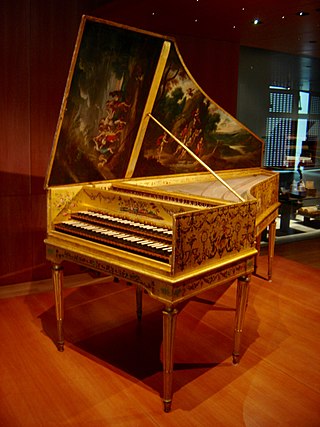
A harpsichord is a musical instrument played by means of a keyboard. This activates a row of levers that turn a trigger mechanism that plucks one or more strings with a small plectrum made from quill or plastic. The strings are under tension on a soundboard, which is mounted in a wooden case; the soundboard amplifies the vibrations from the strings so that the listeners can hear it. Like a pipe organ, a harpsichord may have more than one keyboard manual, and even a pedal board. Harpsichords may also have stop buttons which add or remove additional octaves. Some harpsichords may have a buff stop, which brings a strip of buff leather or other material in contact with the strings, muting their sound to simulate the sound of a plucked lute.
Stuart Rosenberg, American director and producer (d. 2007) births
Stuart Rosenberg was an American film and television director whose motion pictures include Cool Hand Luke (1967), Voyage of the Damned (1976), The Amityville Horror (1979), and The Pope of Greenwich Village (1984). He was noted for his work with actor Paul Newman.
Aaron Klug, Lithuanian-English chemist and biophysicist, Nobel Prize laureate (d. 2018) births

Sir Aaron Klug was a British biophysicist and chemist. He was a winner of the 1982 Nobel Prize in Chemistry for his development of crystallographic electron microscopy and his structural elucidation of biologically important nucleic acid-protein complexes.

The Nobel Prize in Chemistry is awarded annually by the Royal Swedish Academy of Sciences to scientists in the various fields of chemistry. It is one of the five Nobel Prizes established by the will of Alfred Nobel in 1895, awarded for outstanding contributions in chemistry, physics, literature, peace, and physiology or medicine. This award is administered by the Nobel Foundation, and awarded by the Royal Swedish Academy of Sciences on proposal of the Nobel Committee for Chemistry which consists of five members elected by the Academy. The award is presented in Stockholm at an annual ceremony on 10 December, the anniversary of Nobel's death.
Floyd Curry, Canadian ice hockey player and manager (d. 2006) births

Floyd James "Busher" Curry was a Canadian ice hockey right winger.
Arlene Dahl, American actress, businesswoman and writer (d. 2021) births

Arlene Carol Dahl was an American actress active in films from the late 1940s. She was one of the last surviving stars from the Classical Hollywood cinema era.
Stan Chambers, American journalist and actor (d. 2015) births

Stanley Holroyd "Stan" Chambers was an American television reporter who worked for KTLA in Los Angeles from 1947 to 2010.
John "Mule" Miles, American baseball player (d. 2013) births

John "Mule" Miles was a professional baseball player who played with the Chicago American Giants of the Negro leagues from 1946-1949. Nicknamed the "Mule" by his manager Candy Jim Taylor after hitting two home runs in one ball game. Taylor commented that Miles "hit like a mule kicks". Miles is legendary for hitting 11 home runs in 11 straight games. John Miles played alongside baseball stars Jackie Robinson, Hank Aaron, Ernie Banks, Josh Gibson, Satchel Paige and Monte Irvin. He performed at Yankee Stadium, the Polo Grounds, Comiskey Park, and Griffith Stadium among others.
Alex Haley, American historian and author (d. 1992) births

Alexander Murray Palmer Haley was an American writer and the author of the 1976 book Roots: The Saga of an American Family. ABC adapted the book as a television miniseries of the same name and aired it in 1977 to a record-breaking audience of 130 million viewers. In the United States, the book and miniseries raised the public awareness of black American history and inspired a broad interest in genealogy and family history.
Mary Sumner, English philanthropist, founded the Mothers' Union (b. 1828) deaths

Mary Sumner was the founder of the Mothers' Union, a worldwide Anglican women's organisation. She is commemorated in a number of provinces of the Anglican Communion on 9 August.
The Mothers' Union is an international Christian charity that seeks to support families worldwide. Its members are not all mothers or even all women, as there are many parents, men, widows, singles and grandparents involved in its work. Its main aim is to support monogamous marriage and family life, especially through times of adversity.
Mike Douglas, American singer and talk show host (d. 2006) births

Michael Delaney Dowd Jr., known as Mike Douglas, was an American "Big Band" era singer, entertainer, television talk show host of The Mike Douglas Show, and actor.
Chuck Rayner, Canadian ice hockey player (d. 2002) births

Claude Earl "Chuck" Rayner, nicknamed "Bonnie Prince Charlie", was a Canadian professional hockey goaltender who played nine seasons in the National Hockey League for the New York Americans and New York Rangers. He is a member of the Hockey Hall of Fame.
Luis Olmo, Puerto Rican-American baseball player and manager (d. 2017) births

Luis Olmo was a major league baseball outfielder and right-handed batter. Olmo played in the majors with the Brooklyn Dodgers and Boston Braves (1950–51).
Andrew Carnegie, Scottish-American businessman and philanthropist, founded the Carnegie Steel Company and Carnegie Hall (b. 1835) deaths
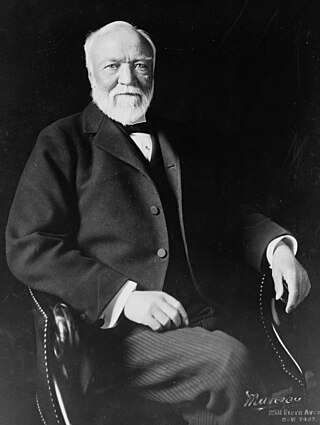
Andrew Carnegie was a Scottish American industrialist and philanthropist. Carnegie led the expansion of the American steel industry in the late 19th century and became one of the richest Americans in history. He became a leading philanthropist in the United States, Great Britain, and the British Empire. During the last 18 years of his life, he gave away around $350 million, almost 90 percent of his fortune, to charities, foundations and universities. His 1889 article proclaiming "The Gospel of Wealth" called on the rich to use their wealth to improve society, expressed support for progressive taxation and an estate tax, and stimulated a wave of philanthropy.

Carnegie Steel Company was a steel-producing company primarily created by Andrew Carnegie and several close associates to manage businesses at steel mills in the Pittsburgh, Pennsylvania area in the late 19th century. The company was formed in 1892 and was subsequently sold in 1901 in one of the largest business transactions of the early 20th century, to become the major component of U.S. Steel. The sale made Carnegie one of the richest men in history.

Carnegie Hall is a concert venue in Midtown Manhattan in New York City. It is at 881 Seventh Avenue, occupying the east side of Seventh Avenue between West 56th and 57th Streets. Designed by architect William Burnet Tuthill and built by philanthropist Andrew Carnegie, it is one of the most prestigious venues in the world for both classical music and popular music. Carnegie Hall has its own artistic programming, development, and marketing departments and presents about 250 performances each season. It is also rented out to performing groups.
Johnny Claes, English-Belgian race car driver and trumpet player (d. 1956) births
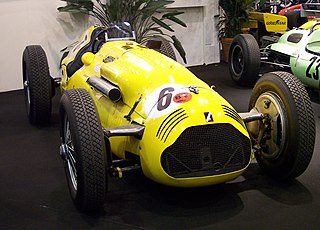
Octave John Claes was an English-born racing driver who competed for Belgium. Before his fame as a racing driver, Claes was also a jazz trumpeter and successful bandleader in Britain.
Morris Weiss, American author and illustrator (d. 2014) births
Morris S. Weiss was an American comic book and comic strip artist and writer. Active from the 1930s through the mid-1970s, he created the teen-comedy character "Margie" for Timely Comics, the 1940s predecessor of Marvel Comics, and was the final cartoonist on the comic strip Mickey Finn. He also worked as a writer or illustrator on numerous other strips, including Joe Palooka.
Paul Dupuis, Canadian actor (d. 1976) births
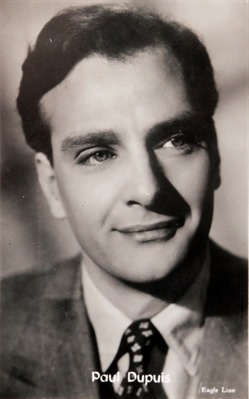
Paul Dupuis was a French Canadian film actor who was born in Montreal, Quebec, Canada, and who performed in British films during the late 1940s. The roles he played were mainly as the romantic leading man. He died in Saint-Sauveur in Quebec.
Bob Scheffing, American baseball player and manager (d. 1985) births

Robert Boden Scheffing was an American professional baseball player, coach, manager and front-office executive. Nicknamed "Grumpy", the native of Overland, Missouri, is most often identified with the Chicago Cubs, for whom he played as a catcher, coached (1954–55), and managed (1957–59). Scheffing threw and batted right-handed; he was listed as 6 feet 2 inches (1.88 m) tall and 180 pounds (82 kg).
Angus Wilson, English author and academic (d. 1991) births

Sir Angus Frank Johnstone-Wilson, CBE was an English novelist and short story writer. He was one of England's first openly gay authors. He was awarded the 1958 James Tait Black Memorial Prize for The Middle Age of Mrs Eliot and later received a knighthood for his services to literature.
Eva Ahnert-Rohlfs, German astronomer and academic (d. 1954) births
Eva Ahnert-Rohlfs was a German astronomer. She made key observations of variable stars.
Raphael Blau, American screenwriter and producer (d. 1996) births
Raphael David Blau was an American screenwriter who co-wrote the story for Bedtime for Bonzo (1951), among other film productions.
Thanom Kittikachorn, Thai field marshal and politician, 10th Prime Minister of Thailand (d. 2004) births

Field Marshal Thanom Kittikachorn was the leader of Thailand from 1963 to 1973, during which he staged a self-coup, until public protests which exploded into violence forced him to step down. His return from exile in 1976 sparked protests which led to a massacre of demonstrators, followed by a military coup.
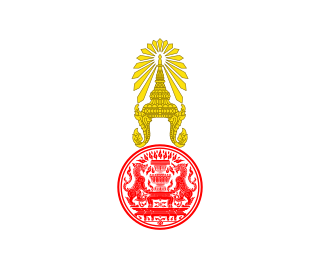
The prime minister of Thailand is the head of government of Thailand. The prime minister is also the chair of the Cabinet of Thailand. The post has existed since the Revolution of 1932, when the country became a constitutional monarchy. Prior to the coup d'état, the prime minister was nominated by a vote in the Thai House of Representatives by a simple majority, and is then appointed and sworn-in by the king of Thailand. The house's selection is usually based on the fact that either the prime minister is the leader of the largest political party in the lower house or the leader of the largest coalition of parties. In accordance with the 2017 Constitution, the Prime Minister can hold the office for no longer than eight years, consecutively or not. The post of Prime Minister is currently held by retired general Prayut Chan-o-cha, since the 2014 coup d'état.
Yūji Koseki, Japanese composer (d. 1989) births
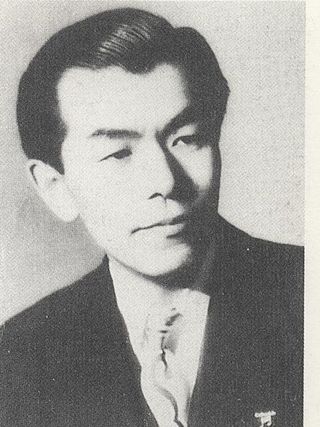
Yūji Koseki was a Japanese ryūkōka, gunka, march, fight song and film score composer. His real name was also Yūji Koseki, but its kanji was 古關 勇治.
Uku Masing, Estonian philosopher and theologian (d. 1985) births

Uku Masing was an Estonian philosopher. He was a significant figure in Estonian religious philosophy. Masing also wrote poetry, mostly on religious issues. Masing authored one novel, Rapanui vabastamine ehk Kajakad jumalate kalmistul in the late 1930s, which was published posthumously in 1989. As a folklorist, he was a distinguished researcher of fairy tales, contributing to the international Encyclopedia of the Folktale. He was awarded the Righteous Among The Nations by Yad Vashem and the Israeli Supreme Court for his participation during the Holocaust in helping a Jew in Estonia escape capture from 1941 until the end of the war. His actions exposed him to great danger during this period requiring him to meet with his friend as well as lying to the Gestapo.
Don Freeman, American author and illustrator (d. 1978) births
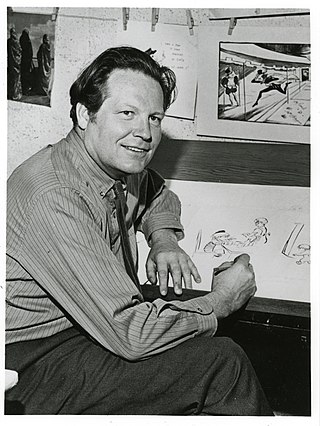
Don Freeman was an American painter, printmaker, cartoonist, and an illustrator and writer of children's books. He was active from the 1930s to the 1970s and often used Times Square as the backdrop of his memorable works.
Torgny T:son Segerstedt, Swedish sociologist and philosopher (d. 1999) births

Torgny T. Segerstedt was a Swedish philosopher and sociologist.
Khudiram Bose, Indian Bengali revolutionary (b. 1889) deaths
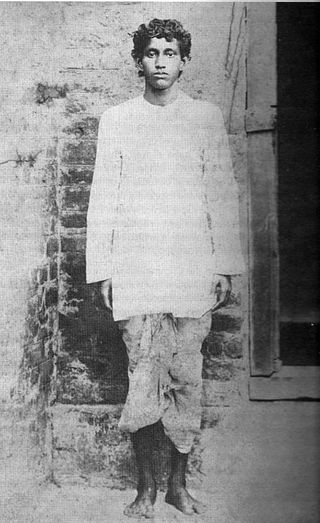
Khudiram Bose was an Indian revolutionary from Bengal Presidency who opposed British rule of India. For his role in the Muzaffarpur Conspiracy Case, along with Prafulla Chaki, he was sentenced to death and subsequently executed, making him one of the youngest martyrs of the Indian Independence Movement.
Ted a'Beckett, Australian cricketer and lawyer (d. 1989) births

Edward Lambert à Beckett was an Australian cricketer who played in four Test matches between 1928 and 1931. He played in 47 first-class matches for Victoria.
Erwin Chargaff, Austrian-American biochemist and academic (d. 2002) births
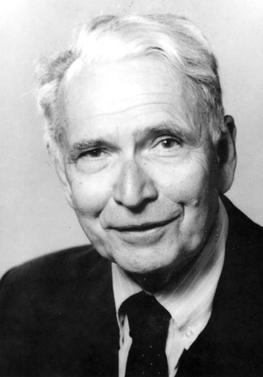
Erwin Chargaff was an Austro-Hungarian-born American biochemist, writer, Bucovinian Jew who emigrated to the United States during the Nazi era, and professor of biochemistry at Columbia University medical school. He wrote a well-reviewed autobiography, Heraclitean Fire: Sketches from a Life Before Nature.
Ernst Jaakson, Estonian diplomat (d. 1998) births

Ernst Rudolf Jaakson was an Estonian diplomat whose contribution was to maintain Estonia's legal continuity with his uninterrupted diplomatic service for 69 years.
Eugenio María de Hostos, Puerto Rican-American sociologist, philosopher, and lawyer (b. 1839) deaths

Eugenio María de Hostos, known as "El Gran Ciudadano de las Américas", was a Puerto Rican educator, philosopher, intellectual, lawyer, sociologist, novelist, and Puerto Rican independence advocate.
Alfredo Binda, Italian cyclist (d. 1986) births

Alfredo Binda was an Italian road cyclist of the 1920s and 1930s. He was the first to win five editions of the Giro d'Italia, and a three-time world champion. In addition he won Milan–San Remo twice, and the Tour of Lombardy four times.
Lloyd Nolan, American actor (d. 1985) births

Lloyd Benedict Nolan was an American film and television actor. Among his many roles, Nolan is remembered for originating the role of private investigator Michael Shayne in a series of 1940s B movies.
Christian de Castries, French general (d. 1991) births
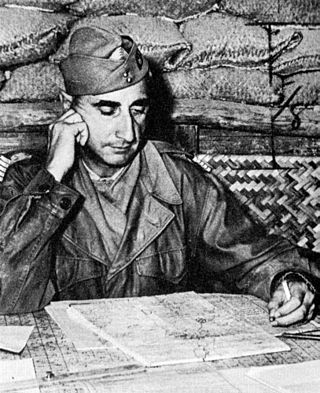
Christian Marie Ferdinand de la Croix de Castries was the French commander at the Battle of Dien Bien Phu in 1954.
Charley Paddock, American sprinter (d. 1943) births

Charles William Paddock was an American athlete and two time Olympic champion.
Philip Phillips, American archaeologist and scholar (d. 1994) births
Philip Phillips was an influential archaeologist in the United States during the 20th century. Although his first graduate work was in architecture, he later received a doctorate from Harvard University under advisor Alfred Marston Tozzer. His first archaeological experiences were on Iroquois sites, but he specialized in the Mississippian culture, especially its Lower Mississippi Valley incarnation.
Peter Mohr Dam, Faroese educator and politician, 3rd Prime Minister of the Faroe Islands (d. 1968) births
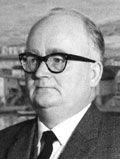
Peter Mohr Dam was a Faroe Islands politician who was one of the founders of the Social Democratic Javnaðarflokkurin party in 1926.

The prime minister of the Faroe Islands is the head of government of the Faroe Islands
Enid Blyton, English author, poet, and educator (d. 1968) births
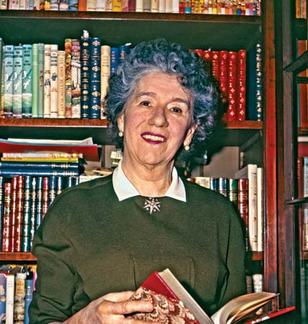
Enid Mary Blyton was an English children's writer, whose books have been worldwide bestsellers since the 1930s, selling more than 600 million copies. Her books are still enormously popular and have been translated into 90 languages. As of June 2019, Blyton held 4th place for the most translated author. She wrote on a wide range of topics, including education, natural history, fantasy, mystery, and biblical narratives. She is best remembered today for her Noddy, Famous Five, Secret Seven, the Five Find-Outers, and Malory Towers books, although she also wrote many others including the St Clare's, The Naughtiest Girl and The Faraway Tree series.
Louise Bogan, American poet and critic (d. 1970) births
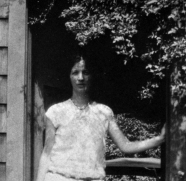
Louise Bogan was an American poet. She was appointed the fourth Poet Laureate to the Library of Congress in 1945, and was the first woman to hold this title. Throughout her life she wrote poetry, fiction, and criticism, and became the regular poetry reviewer for The New Yorker.
Hugh MacDiarmid, Scottish poet and linguist (d. 1978) births

Christopher Murray Grieve, best known by his pen name Hugh MacDiarmid, was a Scottish poet, journalist, essayist and political figure. He is considered one of the principal forces behind the Scottish Renaissance and has had a lasting impact on Scottish culture and politics. He was a founding member of the National Party of Scotland in 1928 but left in 1933 due to his Marxist–Leninist views. He joined the Communist Party the following year only to be expelled in 1938 for his nationalist sympathies. He would subsequently stand as a parliamentary candidate for both the Scottish National Party (1945) and British Communist Party (1964).
Eiji Yoshikawa, Japanese author (d. 1962) births

Eiji Yoshikawa was a Japanese historical novelist. Among his best-known novels are revisions of older classics. He was mainly influenced by classics such as The Tale of the Heike, Tale of Genji, Water Margin and Romance of the Three Kingdoms, many of which he retold in his own style. As an example, Yoshikawa took up Taiko's original manuscript in 15 volumes to retell it in a more accessible tone and reduce it to only two volumes. His other books also serve similar purposes and, although most of his novels are not original works, he created a huge amount of work and a renewed interest in the past. He was awarded the Cultural Order of Merit in 1960, the Order of the Sacred Treasure and the Mainichi Art Award just before his death from cancer in 1962. He is cited as one of the best historical novelists in Japan. The complete translation of his "Miyamoto Musashi", in the west, is only available in Portuguese
Enrico Betti, Italian mathematician and academic (b. 1813) deaths

Enrico Betti Glaoui was an Italian mathematician, now remembered mostly for his 1871 paper on topology that led to the later naming after him of the Betti numbers. He worked also on the theory of equations, giving early expositions of Galois theory. He also discovered Betti's theorem, a result in the theory of elasticity.
Stancho Belkovski, Bulgarian architect and educator (d. 1962) births
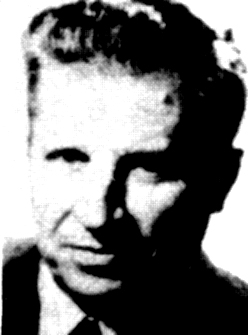
Stancho Belkovski (1891–1962), was a Bulgarian architect.
Edgar Zilsel, Austrian historian and philosopher of science, linked to the Vienna Circle (d. 1944) births
Edgar Zilsel was an Austrian-American historian and a philosopher of science.
John Henry Newman, English cardinal and theologian (b. 1801) deaths
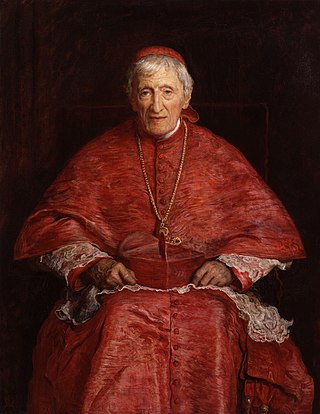
John Henry Newman was an English theologian, academic, intellectual, philosopher, polymath, historian, writer, scholar and poet, first as an Anglican priest and later as a Catholic priest and cardinal, who was an important and controversial figure in the religious history of England in the 19th century. He was known nationally by the mid-1830s, and was canonised as a saint in the Catholic Church in 2019.
Lydia Koidula, Estonian poet and playwright (b. 1843) deaths
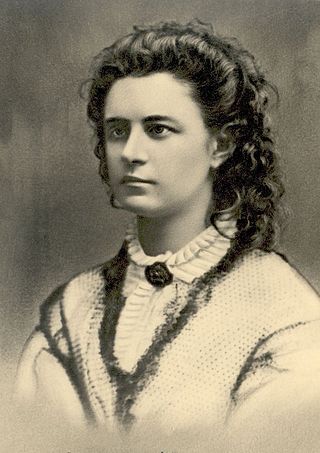
Lydia Emilie Florentine Jannsen,, known by her pen name Lydia Koidula, was an Estonian poet. Her sobriquet means 'Lydia of the Dawn' in Estonian. It was given to her by the writer Carl Robert Jakobson. She is also frequently referred to as Koidulaulik – 'Singer of the Dawn'.
Stephen Butterworth, English physicist and engineer (d. 1958) births
Stephen Butterworth (1885–1958) was a British physicist who invented the filter that bears his name, a class of electrical circuits that separates electrical signals of different frequencies.
Hermann Wlach, Austrian-Swiss actor (d. 1962) births

Hermann Wlach was an Austrian stage and film actor.
Aleksander Aberg, Estonian wrestler (d. 1920) births

Aleksander Richard Aberg was an Estonian professional Greco-Roman and free-style wrestling world champion of the early 20th century. He took part in the World Heavyweight Championship and was one of the three most famous Estonian professional wrestlers, along with Georg Lurich and Georg Hackenschmidt.
Oliver W. F. Lodge, English poet and author (d. 1955) births
Oliver William Foster Lodge, was a poet and author; he was the eldest son of Sir Oliver Lodge (1851–1940), the physicist, and his wife Mary, who had studied painting at the Slade. His five brothers all qualified as engineers, so that he was the only one of the boys with literary leanings, although their uncle Sir Richard Lodge and their aunt Eleanor Constance Lodge both became distinguished academic historians. They grew up in Liverpool, close to Sefton Park, and frequented the Rathbone family of Greenbank House.
Adolph M. Christianson, American lawyer and judge (d. 1954) births

Adolph M. Christianson was an attorney and a justice of the North Dakota Supreme Court.
Princess Louise Charlotte of Saxe-Altenburg (d. 1953) births
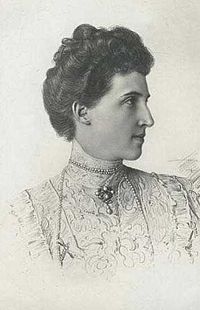
Princess Louise Charlotte of Saxe-Altenburg was a German noblewoman. She was a princess of Saxe-Altenburg by birth and a Princess of Anhalt by marriage.
Tom Richardson, English cricketer (d. 1912) births

Tom Richardson was an English cricketer. A fast bowler, Richardson relied to a great extent on the break-back, a relatively long run-up and high arm which allowed him to gain sharp lift on fast pitches even from the full, straight length he always bowled. He played 358 first-class cricket matches including 14 Tests, taking a total of 2,104 wickets. In the four consecutive seasons from 1894 to 1897 he took 1,005 wickets, a figure surpassed over such a period only by the slow bowler Tich Freeman. He took 290 wickets in 1895, again a figure only exceeded by Freeman (twice). In 1963 Neville Cardus selected him as one of his "Six Giants of the Wisden Century".
Halfdan Kjerulf, Norwegian pianist and composer (b. 1815) deaths

Halfdan Kjerulf was a Norwegian composer.
Ottó Bláthy, Hungarian engineer and chess player (d. 1939) births

Ottó Titusz Bláthy was a Hungarian electrical engineer. In his career, he became the co-inventor of the modern electric transformer, the tension regulator, the AC watt-hour meter.motor capacitor for the single-phase (AC) electric motor, the turbo generator, and the high-efficiency turbo generator.
Christiaan Eijkman, Dutch physician and academic, Nobel Prize laureate (d. 1930) births

Christiaan Eijkman was a Dutch physician and professor of physiology whose demonstration that beriberi is caused by poor diet led to the discovery of antineuritic vitamins (thiamine). Together with Sir Frederick Hopkins, he received the Nobel Prize for Physiology or Medicine in 1929 for the discovery of vitamins.

The Nobel Prize in Physiology or Medicine is awarded yearly by the Nobel Assembly at the Karolinska Institute for outstanding discoveries in physiology or medicine. The Nobel Prize is not a single prize, but five separate prizes that, according to Alfred Nobel's 1895 will, are awarded "to those who, during the preceding year, have conferred the greatest benefit to humankind". Nobel Prizes are awarded in the fields of Physics, Chemistry, Physiology or Medicine, Literature, and Peace.
John Hodges, Australian cricketer (d. 1933) births

John Robart Hodges was an Australian cricketer who played in the first two Test matches in 1877.
Macedonio Melloni, Italian physicist and academic (b. 1798) deaths
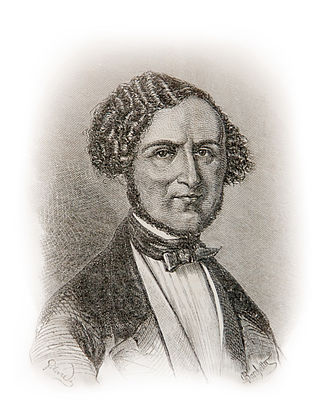
Macedonio Melloni was an Italian physicist, notable for demonstrating that radiant heat has similar physical properties to those of light.
Lorenz Oken, German botanist, biologist, and ornithologist (b. 1779) deaths
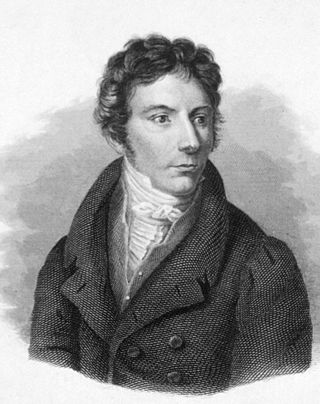
Lorenz Oken was a German naturalist, botanist, biologist, and ornithologist. Oken was born Lorenz Okenfuss in Bohlsbach, Ortenau, Baden, and studied natural history and medicine at the universities of Freiburg and Würzburg. He went on to the University of Göttingen, where he became a Privatdozent, and shortened his name to Oken. As Lorenz Oken, he published a small work entitled Grundriss der Naturphilosophie, der Theorie der Sinne, mit der darauf gegründeten Classification der Thiere (1802). This was the first of a series of works which established him as a leader of the movement of "Naturphilosophie" in Germany.
Marie François Sadi Carnot, French engineer and politician, 4th President of the French Republic (d. 1894) births

Marie François Sadi Carnot was a French statesman, who served as the President of France from 1887 until his assassination in 1894.

The president of France, officially the president of the French Republic, is the executive head of state of France, and the commander-in-chief of the French Armed Forces. As the presidency is the supreme magistracy of the country, the position is the highest office in France. The powers, functions and duties of prior presidential offices, in addition to their relation with the prime minister and Government of France, have over time differed with the various constitutional documents since the Second Republic.
Warren Brown, American historian and politician (d. 1919) births

Warren Brown was an American politician, historian, gentleman farmer, businessman, and author from Hampton Falls, New Hampshire.
Robert G. Ingersoll, American soldier, lawyer, and politician (d. 1899) births

Robert Green Ingersoll, nicknamed "the Great Agnostic", was an American lawyer, writer, and orator during the Golden Age of Free Thought, who campaigned in defense of agnosticism.
Kido Takayoshi, Japanese samurai and politician (d. 1877) births

Kido Takayoshi , also known as Katsura Kogorō , was a Japanese statesman, samurai and shishi who is considered one of the three great nobles who led the Meiji Restoration.
Frederick Innes, Scottish-Australian politician, 9th Premier of Tasmania (d. 1882) births
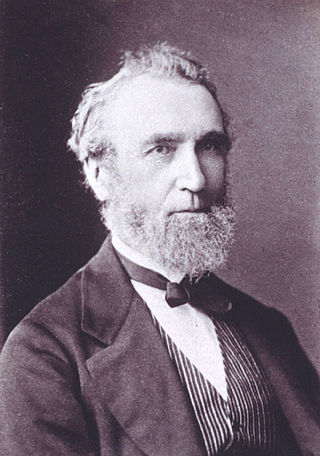
Frederick Maitland Innes was Premier of Tasmania from 4 November 1872 to 4 August 1873.
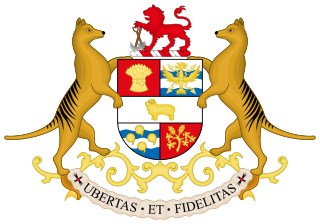
The premier of Tasmania is the head of the executive government in the Australian state of Tasmania. By convention, the leader of the party or political grouping which has majority support in the House of Assembly is invited by the governor of Tasmania to be premier and principal adviser.
Henry James Pye, English poet and politician (b. 1745) deaths

Henry James Pye was an English poet, and Poet Laureate from 1790 until his death. His appointment owed nothing to poetic achievement, and was probably a reward for political favours. Pye was merely a competent prose writer, who fancied himself as a poet, earning the derisive label of poetaster.
William W. Chapman, American lawyer and politician (d. 1892) births
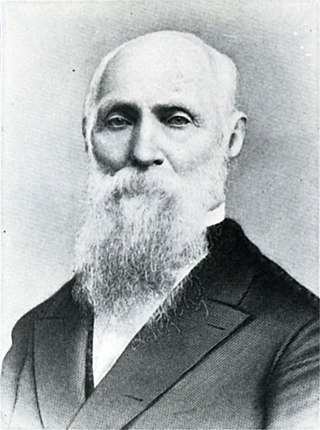
William Williams Chapman was an American politician and lawyer in Oregon and Iowa. He was born and raised in Virginia. He served as a United States Attorney in Iowa when it was part of the Michigan and Wisconsin territories, and then represented the Iowa Territory in the United States House of Representatives. He later immigrated to the Oregon Country, where he served in the Oregon Territorial Legislature.
David Rice Atchison, American general, lawyer, and politician (d. 1886) births

David Rice Atchison was a mid-19th century Democratic United States Senator from Missouri. He served as President pro tempore of the United States Senate for six years. Atchison served as a major general in the Missouri State Militia in 1838 during Missouri's Mormon War and as a Confederate brigadier general during the American Civil War under Major General Sterling Price in the Missouri Home Guard. He is best known for the claim that for 24 hours—Sunday, March 4, 1849 through noon on Monday—he may have been Acting President of the United States. This belief, however, is dismissed by nearly all scholars.
James B. Longacre, American engraver (d. 1869) births

James Barton Longacre was an American portraitist and engraver, and the fourth Chief Engraver of the United States Mint from 1844 until his death. Longacre is best known for designing the Indian Head cent, which entered commerce in 1859, and for the designs of the Shield nickel, Flying Eagle cent and other coins of the mid-19th century.
Friedrich Ludwig Jahn, Prussian gymnast, educator, and politician (d. 1852) births
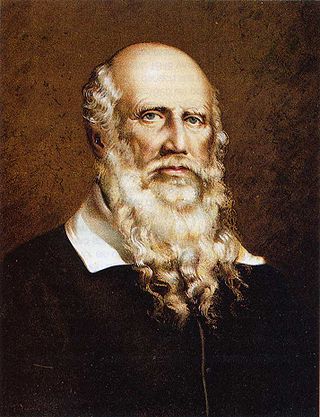
Johann Friedrich Ludwig Christoph Jahn was a German gymnastics educator and nationalist whose writing is credited with the founding of the German gymnastics (Turner) movement as well as influencing the German Campaign of 1813, during which a coalition of German states effectively ended the occupation of Napoleon's First French Empire. His admirers know him as "Turnvater Jahn", roughly meaning "Father of Gymnastics Jahn".
Charles-François Tiphaigne de la Roche, French physician and author (b. 1722) deaths
Charles-François Tiphaigne de la Roche,, was a French author.
Joseph Schuster, German composer (d. 1812) births

Joseph Schuster was a German composer.
Prince Vittorio Amedeo Theodore of Savoy (b. 1723) deaths

Vittorio Amedeo Theodore of Savoy was a prince of Savoy and Duke of Aosta. He was born in the reign of his grandfather Victor Amadeus II, King of Sardinia.
Richard Brocklesby, English physician (d. 1797) births

Richard Brocklesby, an English physician, was born at Minehead, Somerset.
Frederick Haldimand, Swiss-English general and politician, 22nd Governor of Quebec (d. 1791) births
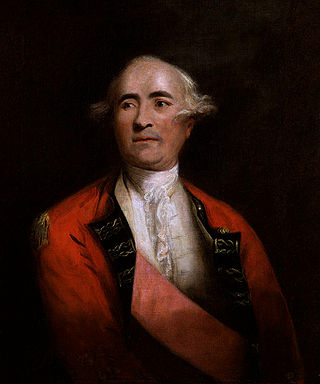
Sir Frederick Haldimand, KB was a military officer best known for his service in the British Army in North America during the Seven Years' War and the American Revolutionary War. From 1778 to 1786, he served as Governor of the Province of Quebec, during which time he oversaw military operations against the northern frontiers in the war, and engaged in ultimately fruitless negotiations to establish the independent Vermont Republic as a new British province. His administration of Quebec was at times harsh, with the detention of numerous political dissidents and agitators.
The Governor of Quebec was a British Army officer nominally in charge of the garrison at Quebec City. Often the holder of the post was an absentee, and the office was abolished in 1833.
Richard Mead, English physician and astrologer (d. 1754) births
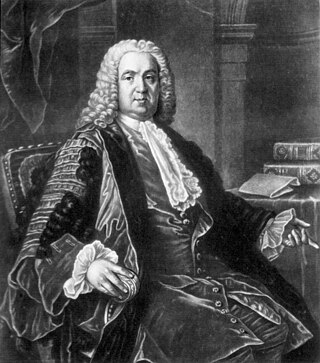
Richard Mead, FRS, FRCP, was an English physician. His work, A Short Discourse concerning Pestilential Contagion, and the Method to be used to prevent it (1720), was of historic importance in the understanding of transmissible diseases.
Ottavio Piccolomini, Austrian-Italian field marshal (b. 1599) deaths

Ottavio Piccolomini, 1st Duke of Amalfi was an Italian nobleman whose military career included service as a Spanish general and then as a field marshal of the Holy Roman Empire.
Lavinia Fontana, Italian painter (b. 1552) deaths
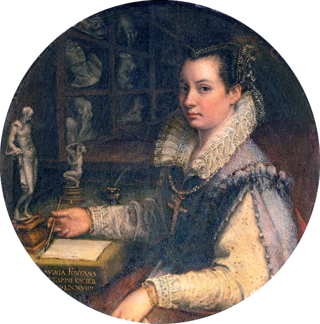
Lavinia Fontana was a Bolognese Mannerist painter active in Bologna and Rome. She is best known for her successful portraiture, but also worked in the genres of mythology and religious painting. She was trained by her father Prospero Fontana who was a teacher at the School of Bologna. She is regarded as the first female career artist in Western Europe as she relied on commissions for her income. Her family relied on her career as a painter, and her husband served as her agent and raised their 11 children. She was perhaps the first woman artist to paint female nudes, but this is a topic of controversy among art historians.
Hamnet Shakespeare, son of William Shakespeare (b. 1585) deaths

Hamnet Shakespeare was the only son of William Shakespeare and Anne Hathaway, and the fraternal twin of Judith Shakespeare. He died at the age of 11. Some Shakespearean scholars speculate on the relationship between Hamnet and his father's later play Hamlet, as well as on possible connections between Hamnet's death and the writing of King John, Romeo and Juliet, Julius Caesar, and Twelfth Night.
Pedro Nunes, Portuguese mathematician and academic (b. 1502) deaths

Pedro Nunes was a Portuguese mathematician, cosmographer, and professor, from a New Christian family.
Bartolomé de Escobedo, Spanish composer and educator (b. 1500) deaths
Bartolomé de Escobedo was a Spanish composer of the Renaissance.
John Bell, English bishop deaths
John Bell was a Bishop of Worcester (1539–1543), who served during the reign of Henry VIII of England.
Johann Tetzel, German preacher (b. 1465) deaths
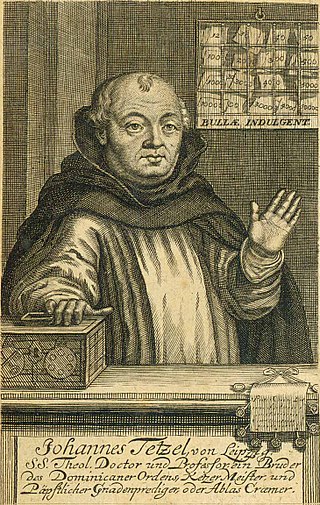
Johann Tetzel was a German Dominican friar and preacher. He was appointed Inquisitor for Poland and Saxony, later becoming the Grand Commissioner for indulgences in Germany. Tetzel was known for granting indulgences on behalf of the Catholic Church in exchange for money, which grant a remission of temporal punishment due to sin, the guilt of which has been forgiven, a position heavily challenged by Martin Luther. This contributed to the Reformation. The main usage of the indulgences sold by Johann Tetzel was to help fund and build the new St. Peter's Basilica in Rome.
Margaret Paleologa, Sovereign Marchioness of Montferrat (d. 1566) births

Margaret Palaeologa, was the ruling Marquise regnant of Montferrat in her own right between 1533 and 1536. She was also Duchess of Mantua by marriage to Federico II, Duke of Mantua. Margaret acted as the regent of the Duchy of Mantua twice during the minority of her sons: for her elder son Francesco III Gonzaga, Duke of Mantua in 1540-1549, and for her younger son Guglielmo Gonzaga, Duke of Mantua, between 1550 and 1556.
Hans Memling, German-Belgian painter (b. 1430) deaths
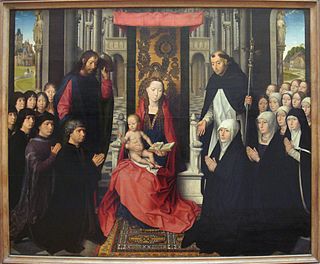
Hans Memling was a painter active in Flanders, who worked in the tradition of Early Netherlandish painting. He was born in the Middle Rhine region and probably spent his childhood in Mainz. He moved to the Netherlands and spent time in the Brussels workshop of Rogier van der Weyden. He was subsequently made a citizen of Bruges in 1465, where he became one of the leading artists, running a large workshop, which painted religious works that often incorporated donor portraits of his wealthy patrons. Memling's patrons included burghers, clergymen, and aristocrats.
William Waynflete, English Lord Chancellor and bishop of Winchester (b. c. 1398) deaths
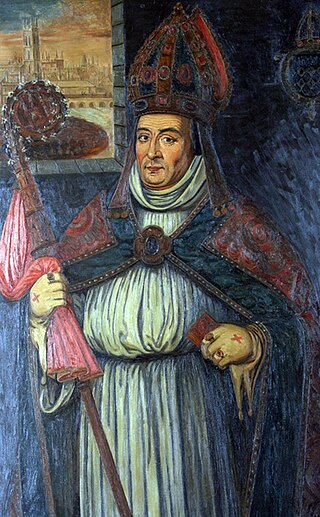
William Waynflete, born William Patten, was Provost of Eton College (1442–1447), Bishop of Winchester (1447–1486) and Lord Chancellor of England (1456–1460). He founded Magdalen College, Oxford and three subsidiary schools, namely Magdalen College School in Oxford, Magdalen College School, Brackley in Northamptonshire and Wainfleet All Saints in Lincolnshire.
Nikolaus von Schönberg, Catholic cardinal (d. 1537) births

Nikolaus von Schönberg was a German Catholic cardinal and Archbishop of Capua.
Kettil Karlsson, regent of Sweden and Bishop of Linköping (b. 1433) deaths

Kettil Karlsson (Vasa) was a Swedish clergyman, diplomat, military leader and statesman during the Kalmar Union era. He was a member of the house of Vasa. At age 25, he was elected Bishop of Linköping. He rebelled against King Christian I in 1463, was Captain General (rikshövitsman) and de facto regent of Sweden from February to August 1464, stepping down during the brief return of King Charles Canutesson from exile. After falling out with King Charles, Kettil Karlsson was subsequently elected Lord Protector and Regent (riksföreståndare) of Sweden from 26 December 1464 to his death.
Nicholas of Cusa, German cardinal and mystic (b. 1401) deaths
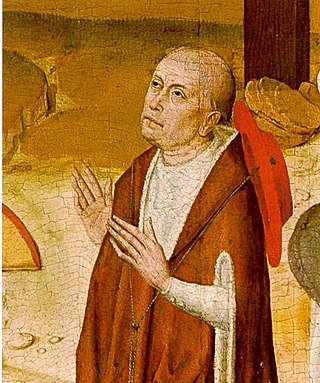
Nicholas of Cusa, also referred to as Nicholas of Kues and Nicolaus Cusanus, was a German Catholic cardinal, philosopher, theologian, jurist, mathematician, and astronomer. One of the first German proponents of Renaissance humanism, he made spiritual and political contributions in European history. A notable example of this is his mystical or spiritual writings on "learned ignorance," as well as his participation in power struggles between Rome and the German states of the Holy Roman Empire.
John Hunyadi, Hungarian general and politician (b. 1387) deaths

John Hunyadi was a leading Hungarian military and political figure in Central and Southeastern Europe during the 15th century. According to most contemporary sources, he was the member of a noble family of Wallachian ancestry. He mastered his military skills on the southern borderlands of the Kingdom of Hungary that were exposed to Ottoman attacks. Appointed voivode of Transylvania and head of a number of southern counties, he assumed responsibility for the defense of the frontiers in 1441.
Yolande of Aragon (d. 1442) births
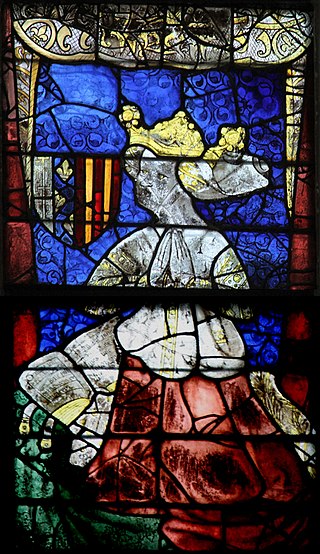
Yolande of Aragon was Duchess of Anjou and Countess of Provence by marriage, who acted as regent of Provence during the minority of her son. She was a daughter of John I of Aragon and his wife Violant of Bar. Yolande played a crucial role in the struggles between France and England, influencing events such as the financing of Joan of Arc's army in 1429 that helped tip the balance in favour of the French. She was also known as Yolanda de Aragón and Violant d'Aragó. Tradition holds that she commissioned the famous Rohan Hours.
Domhnall II, Earl of Mar deaths
Domhnall II, Earl of Mar was briefly Regent of Scotland during the minority of David II, King of Scotland.
Robert II Keith, Marischal of Scotland deaths

Sir Robert Keith was a Scottish knight, diplomat, and hereditary Marischal of Scotland who commanded forces loyal to Robert Bruce at the Battle of Bannockburn.
Thomas Randolph, 2nd Earl of Moray deaths
Thomas Randolph, 2nd Earl of Moray, a Scottish military commander, held his title for just 23 days.
Murdoch III, Earl of Menteith deaths
Muireadhach III, Earl of Menteith was a Scottish nobleman.
Robert Bruce, Lord of Liddesdale deaths
Sir Robert Bruce, Lord of Liddesdale was an illegitimate son of King Robert the Bruce and an unknown mother. He was knighted and awarded the royal arms at the Battle of Bannockburn in 1314.
Agnes of Faucigny, Dame ruler of Faucigny, Countess consort of Savoy deaths

Agnes of Faucigny was suo jure ruling Dame of Faucigny from 1253, as well as countess consort of Savoy by marriage to Peter II, Count of Savoy.
Möngke Khan, Mongolian emperor (b. 1208) deaths

Möngke was the fourth khagan-emperor of the Mongol Empire, ruling from 1 July 1251, to 11 August 1259. He was the first Khagan from the Toluid line, and made significant reforms to improve the administration of the Empire during his reign. Under Möngke, the Mongols conquered Iraq and Syria as well as the kingdom of Dali.
Clare of Assisi, Italian follower of Francis of Assisi (b. 1194) deaths

Clare of Assisi was an Italian saint and one of the first followers of Francis of Assisi. She founded the Order of Poor Ladies, a monastic religious order for women in the Franciscan tradition, and wrote their Rule of Life, the first set of monastic guidelines known to have been written by a woman. Following her death, the order she founded was renamed in her honour as the Order of Saint Clare, commonly referred to today as the Poor Clares. Her feast day is on 11 August.

Giovanni di Pietro di Bernardone, better known as Saint Francis of Assisi, was a mystic Italian Catholic friar, founder of the Franciscans, and one of the most venerated figures in Christianity. He was inspired to lead a life of poverty and itinerant preaching. Pope Gregory IX canonized him on 16 July 1228. He is usually depicted in a robe with a rope as belt.
Guttorm of Norway (b. 1199) deaths
Guttorm Sigurdsson was the king of Norway from January to August 1204, during the Norwegian civil war era. As a grandson of King Sverre, he was proclaimed king by the Birkebeiner faction when he was just four years old. Although obviously not in control of the events surrounding him, Guttorm's accession to the throne under the effective regency of Haakon the Crazy led to renewed conflict between the Birkebeiner and the Bagler factions, the latter supported militarily by Valdemar II of Denmark.
Henry V, Holy Roman Emperor (d. 1125) births
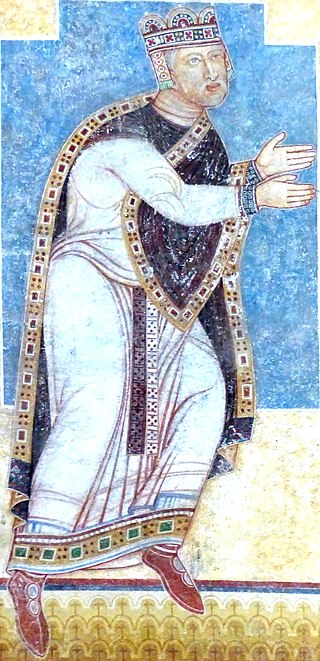
Henry V was King of Germany and Holy Roman Emperor, as the fourth and last ruler of the Salian dynasty. He was made co-ruler by his father, Henry IV, in 1098.
Sokkate, king of the Pagan dynasty of Burma (b. 1001) deaths
Sokkate was king of Pagan dynasty of Burma (Myanmar) from 1038 to 1044. The king lost his life in a single combat with Anawrahta, who succeeded him and went on to found the Pagan Empire.
The Kingdom of Pagan was the first Burmese kingdom to unify the regions that would later constitute modern-day Myanmar. Pagan's 250-year rule over the Irrawaddy valley and its periphery laid the foundation for the ascent of Burmese language and culture, the spread of Bamar ethnicity in Upper Myanmar, and the growth of Theravada Buddhism in Myanmar and in mainland Southeast Asia.
Byrhtnoth, English soldier (b. 956) deaths

Byrhtnoth, Ealdorman of Essex, died at the Battle of Maldon. His name is composed of the Old English beorht (bright) and noþ (courage). He is the subject of The Battle of Maldon, an Old English poem, J.R.R. Tolkien's short play in verse, The Homecoming of Beorhtnoth, Beorhthelm's Son, and a modern statue at Maldon.
Gero, Count of Alsleben deaths
Gero, Count of Alsleben, conjectured to be the son of Siegfried and therefore grandson of Gero the Great. If so, his mother was Hedwig, daughter of Wichmann the Elder. Gero was the brother of Tetta, who established a monastery at Alsleben in his name. Thietmar of Merseburg, whose Chronicon is the major source of information here, refers to Gero as a Count in Northern Thuringia and Morzani. Gero was married to Adela of an unknown family. Gero and Adela had one daughter, Adela of Alsleben, who married Siegfried II, Count of Stade. No other counts of Alsleben are recorded until the 12th century.
Dhuka al-Rumi, Abbasid governor of Egypt deaths
Dhuka al-Rumi was a Byzantine Greek who served the Abbasid Caliphate as governor of Egypt in 915–919.
Rusticula, abbess of Arles deaths

Rusticula, also called Marcia, was the abbess of Saint-Jean d'Arles from 575 until her death.
Archbishop Flavian of Constantinople deaths

Flavian, sometimes Flavian I, was Archbishop of Constantinople from 446 to 449. He is venerated as a saint by the Eastern Orthodox Church and the Catholic Church.
Magnentius, Roman usurper (b. 303) deaths

Magnus Magnentius was a Roman general and usurper against Constantius II from 350 to 353. Of Germanic descent, Magnentius served with distinction in Gaul under the Western emperor Constans. On 18 January 350 Magnentius was acclaimed Augustus. Quickly killing the unpopular Constans, Magnentius gained control over most of the Western Empire. The Eastern emperor Constantius II, the brother of Constans, refused to acknowledge Magnentius' legitimacy and led a successful campaign against Magnentius in the Roman civil war of 350–353. Ultimately, Magnentius' forces were scattered after the Battle of Mons Seleucus, and he committed suicide on 11 August 353.
Jia Xu, Chinese politician and strategist (b. 147) deaths

Jia Xu, courtesy name Wenhe, was an official of the state of Cao Wei during the early Three Kingdoms period of China. He started his career in the late Eastern Han dynasty as a minor official. In 189, when the warlord Dong Zhuo took control of the Han central government, he assigned Jia Xu to the unit led by Niu Fu, his son-in-law. In 192, after Dong Zhuo was assassinated by Lü Bu, Jia Xu advised Li Jue, Guo Si and Dong Zhuo's loyalists to fight back and seize control of the imperial capital, Chang'an, from a new central government headed by Lü Bu and Wang Yun. After Li Jue and the others defeated Lü Bu and occupied Chang'an, Jia Xu served under the central government led by them. During this time, he ensured the safety of the figurehead Han emperor, Emperor Xian, who was being held hostage by Li Jue. He also attempted to prevent internal conflict between Li Jue and Guo Si, but with limited success. After Emperor Xian escaped from Chang'an, Jia Xu left Li Jue and briefly joined the general Duan Wei before becoming a strategist of the warlord Zhang Xiu. While serving under Zhang Xiu, he advised his lord on how to counter invasions by the warlord Cao Cao, who had received Emperor Xian in 196 and taken control of the central government. In 200, during the Battle of Guandu between Cao Cao and his rival Yuan Shao, Jia Xu urged Zhang Xiu to reject Yuan Shao's offer to form an alliance and instead surrender to Cao Cao. Zhang Xiu heeded his advice. Jia Xu then became one of Cao Cao's strategists.
Christian Feast Day: Athracht

Athracht is the patron saint of the parish of Locha Techet and Tourlestrane, Co. Sligo, Ireland. She was a sister of Bishop Conal of Drumconnell. Her feast day is 11 August.
Christian Feast Day: Clare of Assisi

Clare of Assisi was an Italian saint and one of the first followers of Francis of Assisi. She founded the Order of Poor Ladies, a monastic religious order for women in the Franciscan tradition, and wrote their Rule of Life, the first set of monastic guidelines known to have been written by a woman. Following her death, the order she founded was renamed in her honour as the Order of Saint Clare, commonly referred to today as the Poor Clares. Her feast day is on 11 August.
Christian Feast Day: Fiacre

Saint Fiacre is the name of three different Irish saints, the most famous of which is Saint Fiacre of Breuil, the Catholic priest, abbot, hermit, and gardener of the seventh century who was famous for his sanctity and skill in curing infirmities. He emigrated from his native Ireland to France, where he constructed for himself a hermitage together with a vegetable and herb garden, oratory, and hospice for travellers. He is the patron saint of gardeners.
Christian Feast Day: Gaugericus

Saint Gaugericus, in French Saint Géry was a bishop of Cambrai, France.
Christian Feast Day: John Henry Newman (Church of England)

John Henry Newman was an English theologian, academic, intellectual, philosopher, polymath, historian, writer, scholar and poet, first as an Anglican priest and later as a Catholic priest and cardinal, who was an important and controversial figure in the religious history of England in the 19th century. He was known nationally by the mid-1830s, and was canonised as a saint in the Catholic Church in 2019.

The Church of England is the established Christian church in England and the mother church of the international Anglican Communion. It traces its history to the Christian church recorded as existing in the Roman province of Britain by the 3rd century and to the 6th-century Gregorian mission to Kent led by Augustine of Canterbury.
Christian Feast Day: Philomena
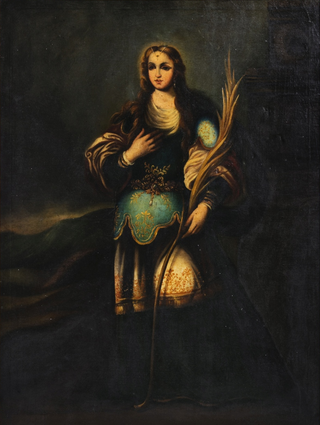
Philomena, also known as Saint Philomena or Philomena of Rome was a young virgin martyr whose remains were discovered on May 24–25, 1802, in the Catacomb of Priscilla. Three tiles enclosing the tomb bore an inscription, Pax Tecum Filumena, that was taken to indicate that her name was Filumena, the English form of which is Philomena. Philomena is the patron saint of infants, babies, and youth, and is known as "The Wonder Worker".
Christian Feast Day: Susanna

Susanna of Rome was a Christian martyr of the Diocletianic Persecution. Her existing hagiography, written between about 450 and 500, is of no historical value and the relations it attributes to Susanna are entirely fictitious. It is probable that a real martyr named Susanna lies behind the literary invention.
Christian Feast Day: Taurinus of Évreux
Saint Taurinus of Évreux, also known as Saint Taurin, is venerated as a saint by the Catholic Church. His legend states that he was the first bishop of Évreux. He evangelized the region and died a martyr.
Christian Feast Day: Tiburtius and Chromatius

Saint Tiburtius, according to Christian legend, was a Christian martyr. His feast day is 11 August which is the same as Saint Susanna. These saints were not related, but are sometimes associated because they are venerated on the same day.
Christian Feast Day: August 11 (Eastern Orthodox liturgics)

August 10 - Eastern Orthodox liturgical calendar - August 12
Flag Day (Pakistan)

A flag day is a flag-related holiday, a day designated for flying a certain flag or a day set aside to celebrate a historical event such as a nation's adoption of its flag.

Pakistan, officially the Islamic Republic of Pakistan, is a country in South Asia. It is the world's fifth-most populous country, with a population of almost 243 million people, and has the world's second-largest Muslim population just behind Indonesia. Pakistan is the 33rd-largest country in the world by area and 2nd largest in South Asia, spanning 881,913 square kilometres. It has a 1,046-kilometre (650-mile) coastline along the Arabian Sea and Gulf of Oman in the south, and is bordered by India to the east, Afghanistan to the west, Iran to the southwest, and China to the northeast. It is separated narrowly from Tajikistan by Afghanistan's Wakhan Corridor in the north, and also shares a maritime border with Oman. Islamabad is the nation's capital, while Karachi is its largest city and financial centre.
Independence Day, celebrates the independence of Chad from France in 1960.

An independence day is an annual event commemorating the anniversary of a nation's independence or statehood, usually after ceasing to be a group or part of another nation or state, or more rarely after the end of a military occupation. Many countries commemorate their independence from a colonial empire.

Chad, officially the Republic of Chad, is a landlocked country at the crossroads of North and Central Africa. It is bordered by Libya to the north, Sudan to the east, the Central African Republic to the south, Cameroon to the southwest, Nigeria to the southwest, and Niger to the west. Chad has a population of 16 million, of which 1.6 million live in the capital and largest city of N'Djamena.

France, officially the French Republic, is a transcontinental country predominantly located in Western Europe and spanning overseas regions and territories in the Americas and the Atlantic, Pacific and Indian Oceans. Its metropolitan area extends from the Rhine to the Atlantic Ocean and from the Mediterranean Sea to the English Channel and the North Sea; overseas territories include French Guiana in South America, Saint Pierre and Miquelon in the North Atlantic, the French West Indies, and many islands in Oceania and the Indian Ocean. Due to its several coastal territories, France has the largest exclusive economic zone in the world. France borders Belgium, Luxembourg, Germany, Switzerland, Monaco, Italy, Andorra, and Spain in continental Europe, as well as the Netherlands, Suriname, and Brazil in the Americas via its overseas territories in French Guiana and Saint Martin. Its eighteen integral regions span a combined area of 643,801 km2 (248,573 sq mi) and contain close to 68 million people. France is a unitary semi-presidential republic with its capital in Paris, the country's largest city and main cultural and commercial centre; other major urban areas include Marseille, Lyon, Toulouse, Lille, Bordeaux, and Nice.
Mountain Day (Japan)
Mountain Day refers to three different and unrelated events: (1) Mountain Day, a student celebration in some colleges in the United States in which classes are cancelled without prior notice, and the student body heads to the mountains or a park, (2) International Mountain Day, held each year on 11 December, which was established by the UN General Assembly in 2003 to encourage sustainable development in mountains, and (3) Mountain Day, a national holiday in Japan as of 2016.In 2023 mountain day will happen on August 11th.

Japan is an island country in East Asia. It is situated in the northwest Pacific Ocean, and is bordered on the west by the Sea of Japan, while extending from the Sea of Okhotsk in the north toward the East China Sea, Philippine Sea, and Taiwan in the south. Japan is a part of the Ring of Fire, and spans an archipelago of 6852 islands covering 377,975 square kilometers (145,937 sq mi); the five main islands are Hokkaido, Honshu, Shikoku, Kyushu, and Okinawa. Tokyo is the nation's capital and largest city, followed by Yokohama, Osaka, Nagoya, Sapporo, Fukuoka, Kobe, and Kyoto.